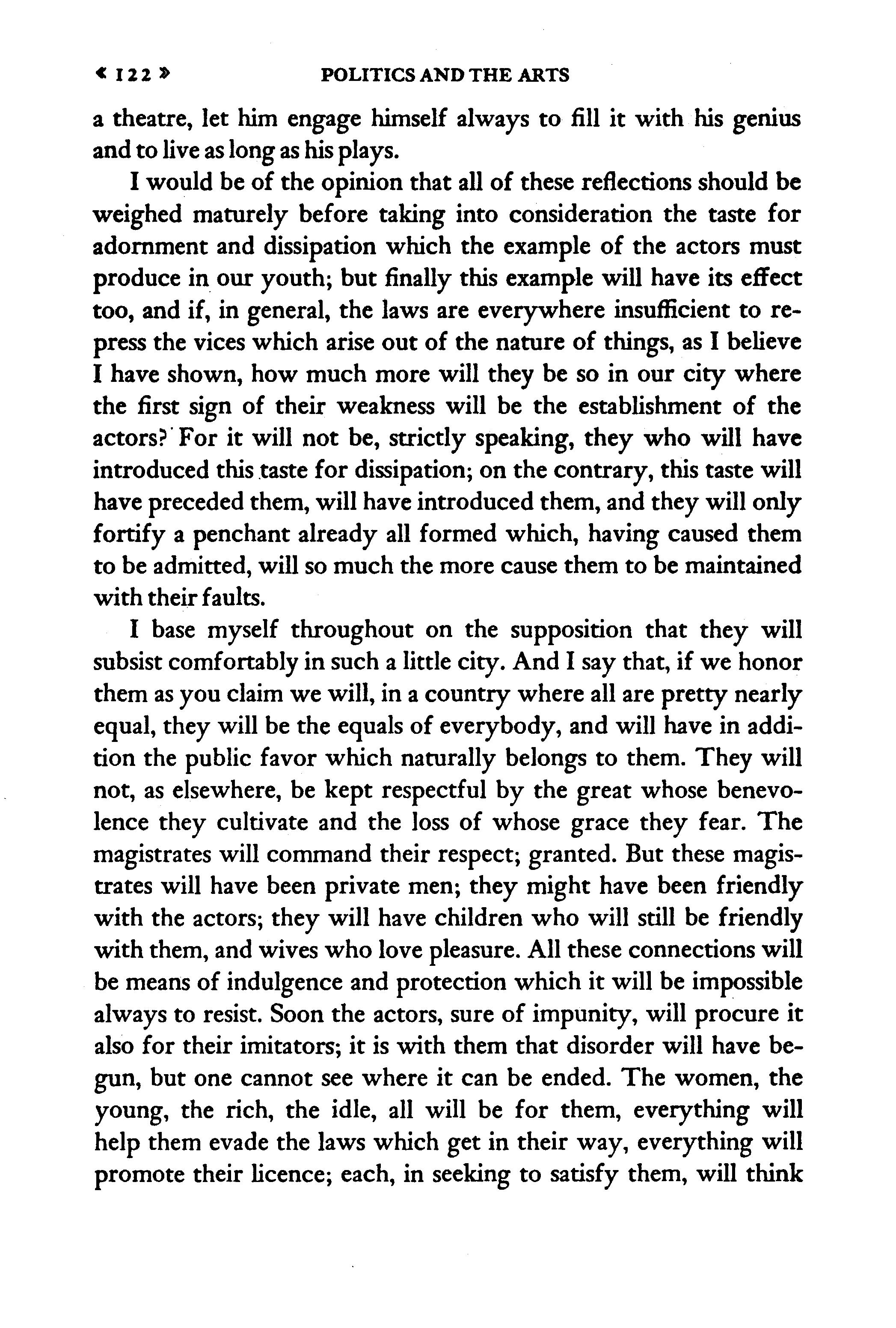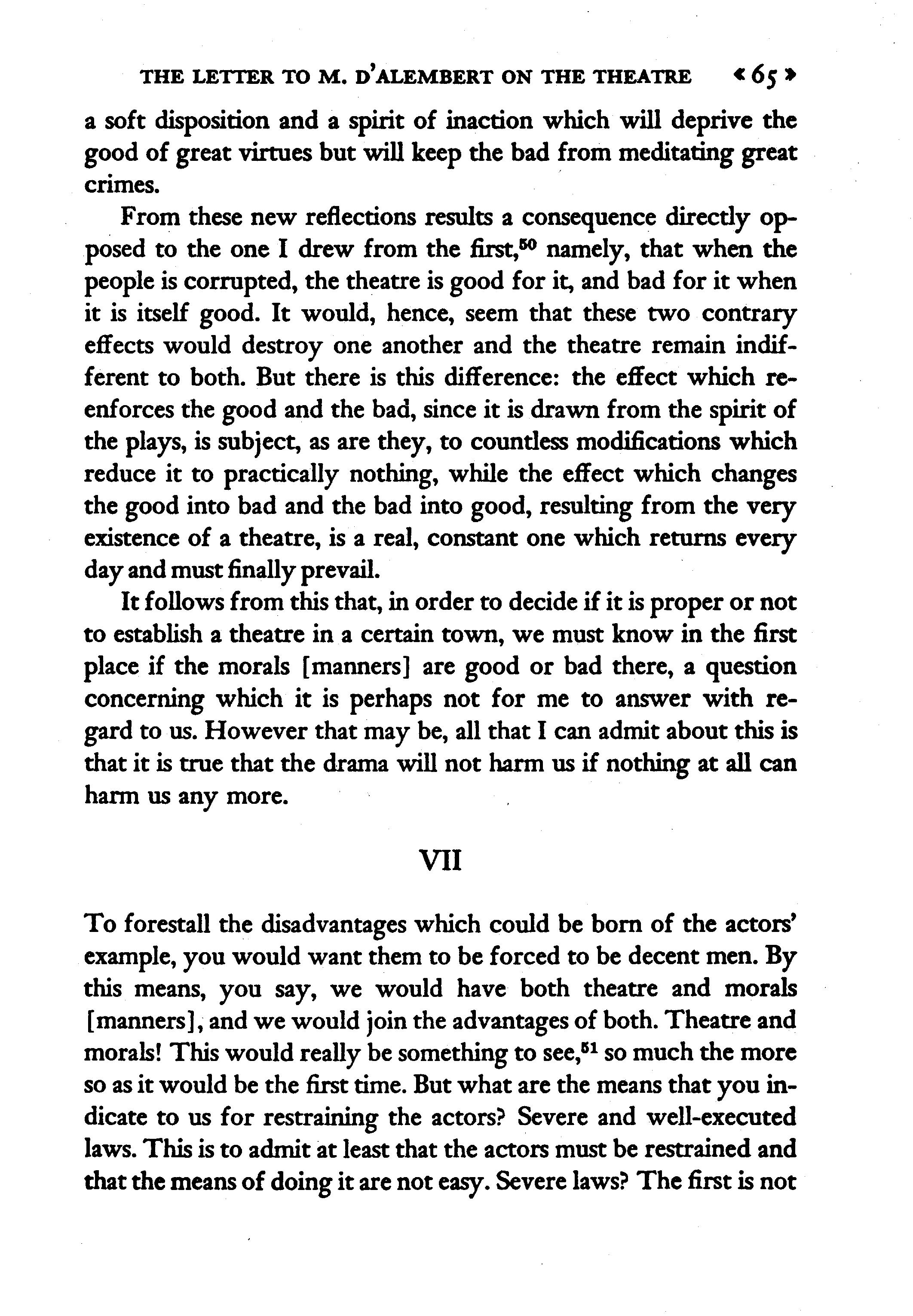
114 minute read
VII. THE LAW AND MORALS [MANNERS VIII. ACTORS AND ACTRESSES 75
a soft disposition and a spirit of inaction which will deprive the good of great virtues but will keep the bad from meditating great crimes.
From these new reflections results a consequence directly opposed to the one I drew from the first,50 namely, that when the people is corrupted, the theatre is good for it, and bad for it when it is itself good. It would, hence, seem that these two contrary effects would destroy one another and the theatre remain indifferent to both. But there is this difference: the effect which reenforces the good and the bad, since it is drawn from the spirit of the plays, is subject, as are they, to countless modifications which reduce it to practically nothing, while the effect which changes the good into bad and the bad into good, resulting from the very existence of a theatre, is a real, constant one which returns every dayandmustfinally prevail.
Advertisement
Itfollows from this that, in order to decide ifit is proper or not to establish a theatre in a certain town, we must know in the first place if the morals [manners] are good or bad there, a question concerning which it is perhaps not for me to answer with regard to us. However that may be, all that I can admit about this is that it is true that the drama will not harm us if nothing at all can hann us any more.
VII
To forestall the disadvantages which could be born of the actors' example, you would want them to be forced to be decent men. By this means, you say, we would have both theatre and morals [manners], and we would jointhe advantages of both. Theatre and morals! This would really be something to see,lS1 so much the more so asitwould be the first time. Butwhat are the means that you indicate to us for restraining the actors? Severe and well-executed laws. This is to admit at least that the actors must be restrained and thatthe meansofdoingitare not easy. Severe laws? The first is not
to tolerate them. If we infringe this one, what will become of the severity of the others? Well-executed laws? The question is whether this is possible; for the force of the laws has its measure, andthe force of the vices that they repress has one too. It is only after one has compared these two quantities and found that the former surpasses the latterthat the execution of the laws can be depended upon. The knowledge of these relations constitutes the true legislator's science. For if it had to do only with publishing edict after edict, regulation after regulation, to remedy abuses as they arise, doubtless many very fine things would be said, but which, for the most part, would remain without effect and would serve as indications of what would need to be done rather than as means toward executing it. On the whole, the institution of laws isnotsuchamarvelousthingthatany man ofsense and equity could not easily find those which, well observed, would be the most beneficial for society. Where is the least student of the law who cannot erect a moral code as pure as that of Plato's laws? But this is not the only issue. The problem is to adapt this code to the people for which itis made and to the things aboutwhich it decrees to such an extent that its execution follows from the very conjunction of these relations; it is to impose on the people, after the fashion of Solon, less the best laws in than the best of which it admits in the given situation. Otherwise, it is better to let the disorders subsist than to forestall them, or takesteps thereto, by laws which will not be observed. For without remedying the evil, thisdegradesthe lawstoo.
Another observation, no less important, is that matters of morals [manners] and universal justice are not arranged, as are those of private justice and strict right, by edicts and laws; or, if sometimes the laws influence morals [manners], it is when the laws draw their force from them. Then they return to morals [manners] this same force by a sort of reaction well known to real statesmen. The first function of the Spartan ephors upon taking office was a public proclamation in which they enjoined the citizens not to
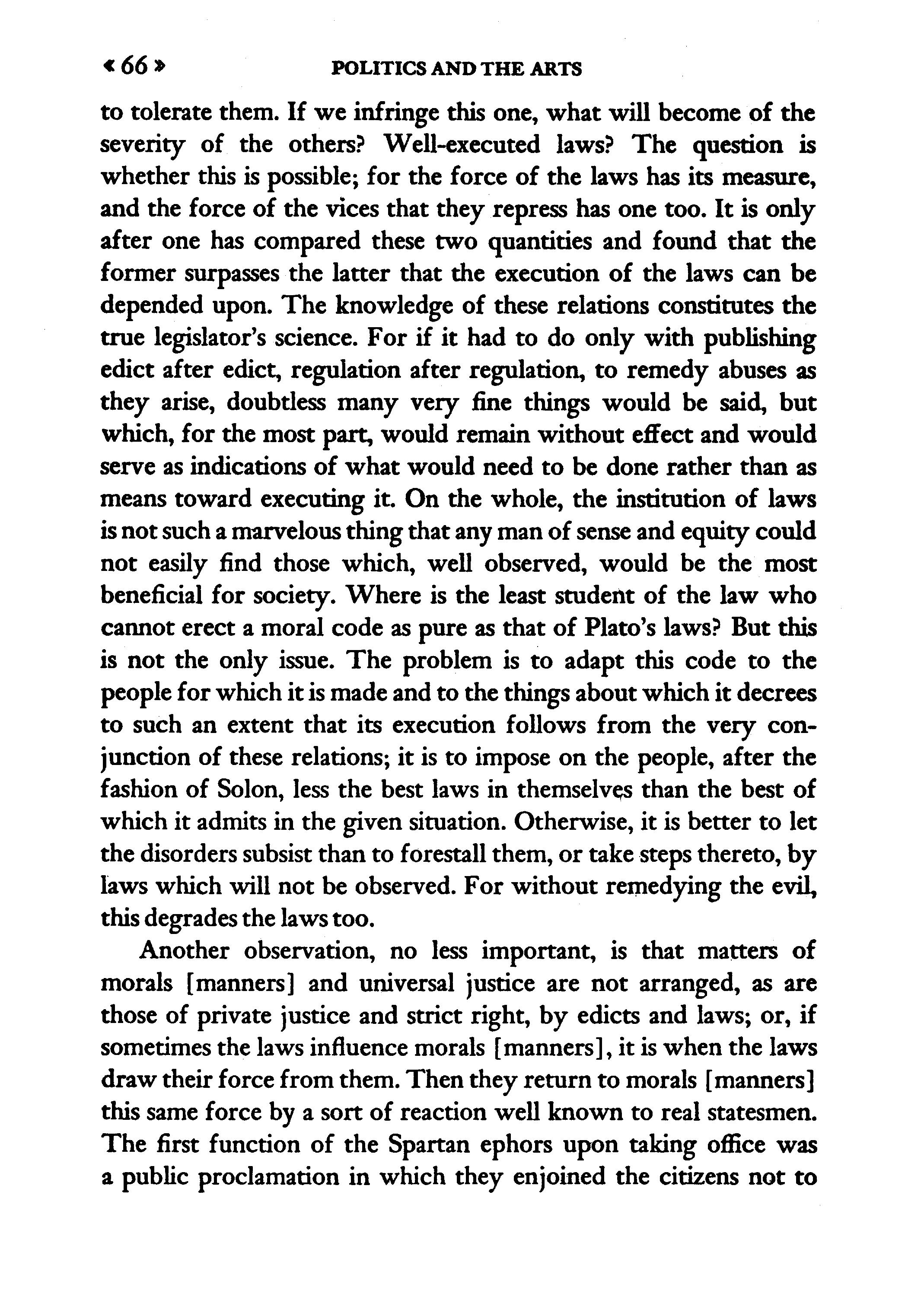
observe but to love the laws, so that their observation would not be hard.52 This proclamation,whichwas notan idle fonnula, shows perfectly the spirit ofthe Spartan regime in which laws and morals [manners], intimately united in the hearts of the citizens, made, as it were, only one single body. But let us not flatter ourselves that we shall see Sparta reborn in the lap of commerce and the love of gain. If we had the same maxims, a theatre could be established at Geneva without any risk; for never would citizen or townsman set footinit.
By what means can the government get a hold on morals [manners]? I answer that it is by public opinion. If our habits in retirement are born of our own sentiments, in society they are born of others' opinions. When we do not live in ourselves but in others, it is their judgments which guide everything. Nothing appears good or desirable to individuals which the public has not judged to be such, and the only happiness which most men know istobeesteemed happy.
As to the choice of instruments proper to the direction of public opinion, that is another question which it would be superfluous to resolve for you and which it is not here the place to resolve for the multitude. I shall content myself with showing by an evident example that these instruments are neither laws nor punishments nor any sort of coercive means. This example is before your eyes; I take it from your country; it is the tribunal of the marshals of France established as supreme judges on points of honor.53
What was the reason for this institution? It was established to change public opinion about duels, the redress of offenses and the occasions when a brave man is obliged, under penalty of disgrace, to get satisfaction for an affront with sword in hand. From this it follows:
First, that, force having no power over minds, it was necessary to dismiss with the greatest of care every vestige ofviolence from the tribunal established to work this change. The very word tribunal was badly conceived; I should prefer Court of Honor. Its
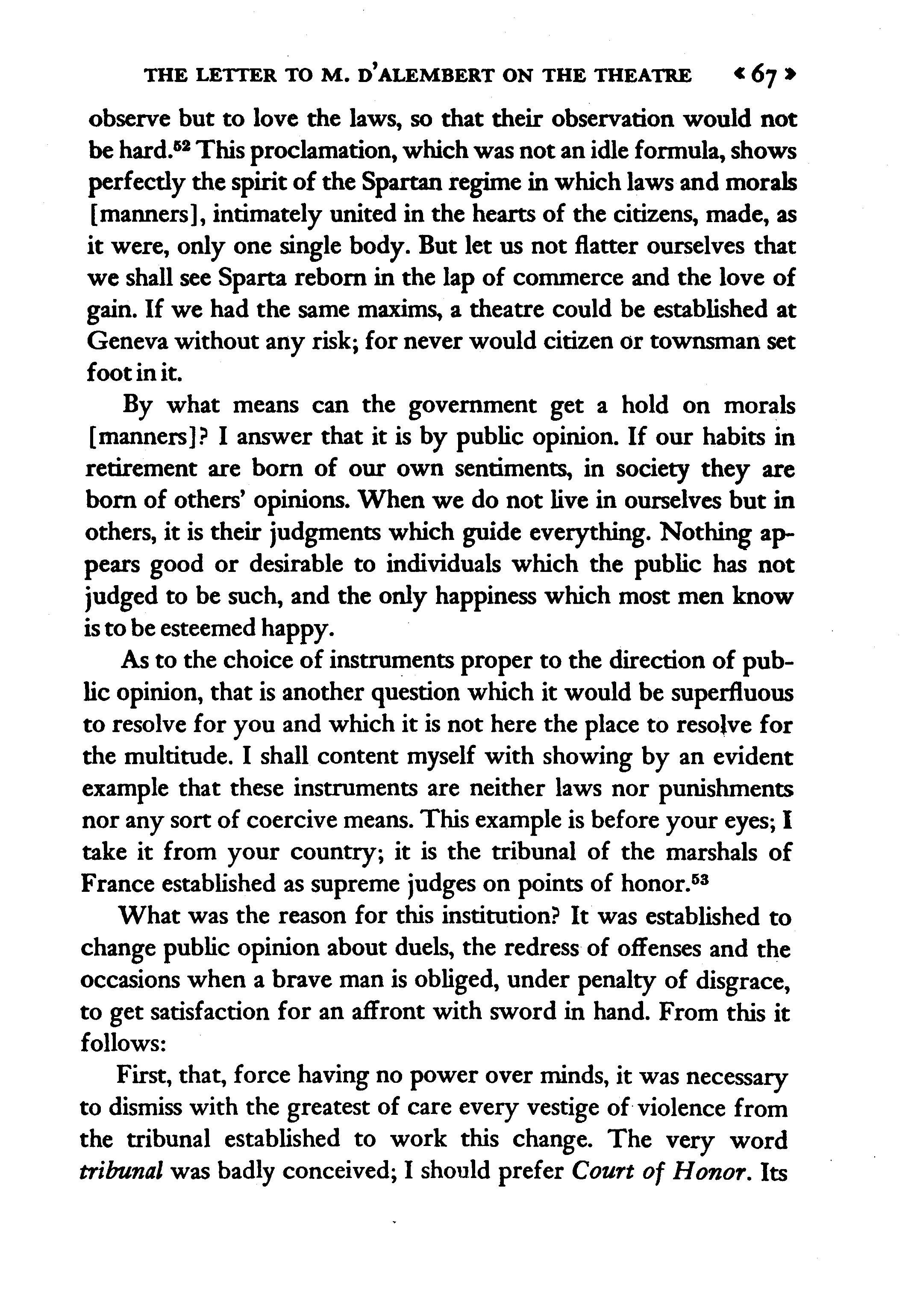
sole arms ought to have been honor and disgrace-never useful recompense, never corporal punishment, no prison, no arrests, no armed guards, simply an apparitor who would have served his summonses by touching the defendant with a white rod, without any other constraint following upon that to make him appear. It is true that not to appear before the judges on the specified date would be to confess to beingwithout defense and to condemn oneself. The natural consequence would be a mark of disgrace, degradation in nobility, unfitness to serve the king in his tribunals and armies, and other punishments of this sort which have directly todowithopinionorareanecessaryeffectofit.
In the second place, it follows that, to uproot the public prejudice, judges of great authority on the matter in question were needed. And, on this point, the founder entered perfectly into the spirit of the institution. For, in a very warlike nation, who can better judge of the just occasions to show one's courage and on which offended honor demands satisfaction, than old soldiers laden with honorabletitles who have grown gray with their laurels, and proved a hundred times at the cost of their blood that they are not unawarewhendutydemandsthatitbespilled.
It follows, in the third place, that, since nothing is more independent of the supreme power than the judgment of the public, the sovereign ought to have taken care in all things not to mix his arbitrarydecisionsinwiththe decreesmeantto representand, what is more, to determine this judgment. He ought, on the contrary, to have endeavoured to put the Court of Honor above himself as though he were subject to its respectable sentences himself. It was hence wrong to begin by condemning all duelists indiscriminately to death; this.created straight-off a shocking opposition between· honor and the law; for even the law cannot oblige anyone to dishonor himself. If the whole people has judged that a man is a poltroon, the king, in spite of all his power, can declare him brave all he wishes and no onewill believe abitofit; and the man, passing then for a poltroon who wants to be honored by force, will be
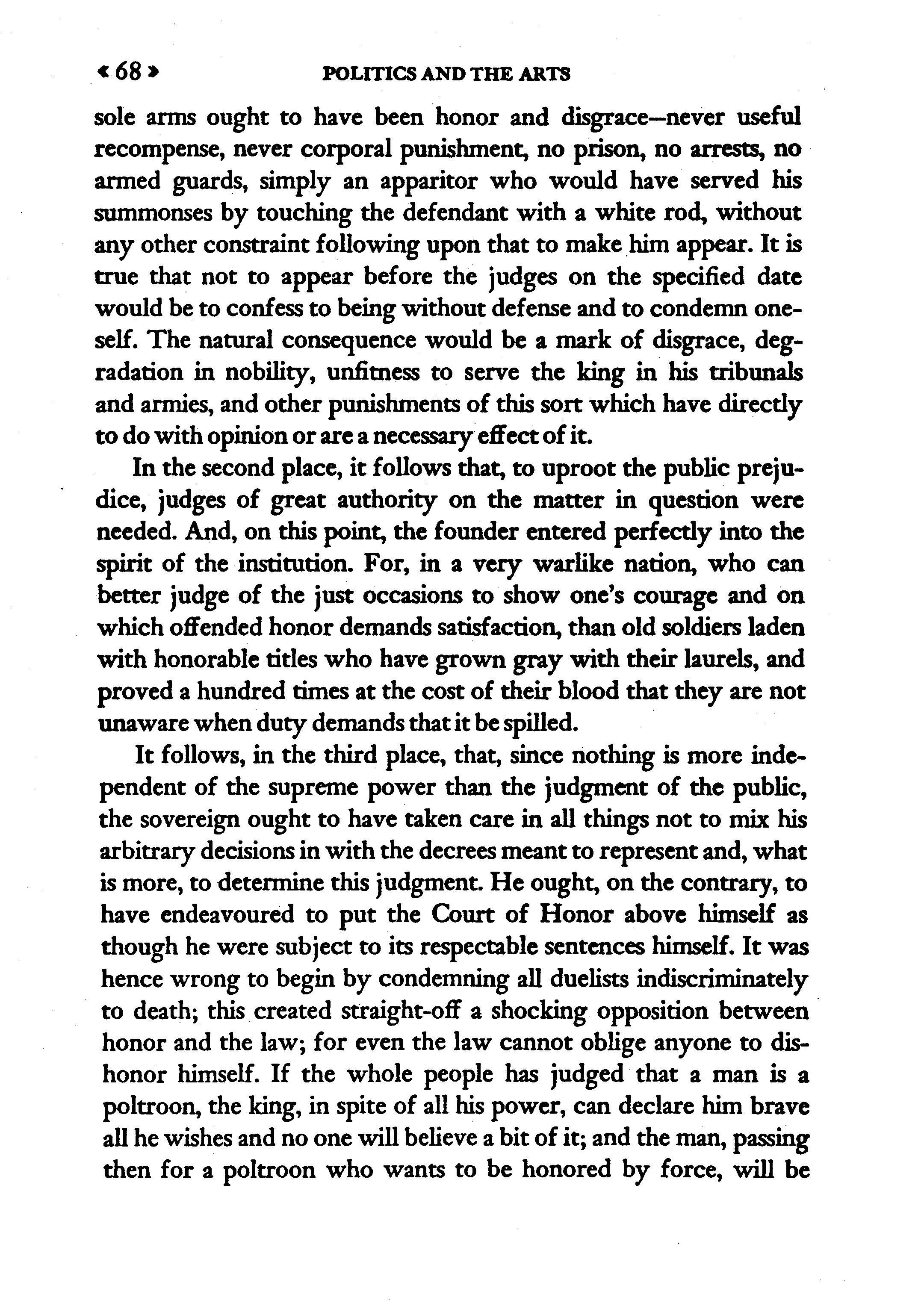
only the more despised. As to what the edicts say, that to fight is to offend God, this is undoubtedly a very pious opinion; but the civil law is no judge of sins, and every time that the sovereign authority wants to interpose itself in the conflicts between honor and religion, it will be compromised on both sides. Tht same edict'S reason no betterwhentheysaythatinstead offighting, the marshals must be consulted; to condemn combat without distinction or reservein thisway isto begin by judging beforehand what is referred to their judgment. It is known that it is not permitted to them to accord a duel even when insulted honor has no other recourse; and, according to the prejudices of society, there are many such cases. For, as to the ceremonious satisfactions which have been offered to theoffendedpersons, theyare really child'splay.
By artfully manipulating the maxim that a man has the right to accept a compensation and pardon his enemy, it can be gradually substituted for the ferocious prejudice it attacks; but it is not the same when the honor of persons is attacked with whom our own is connected. From this moment on there is no further accomodation possible. If my father has been slapped, my sister, wife, or mistress insulted, shall I preserve my honor in selling their's cheaply? There are neither marshals nor satisfactions which suffice; I must get revenge for them or dishonor myself; the edicts leave me only the choice of torture or disgrace. To cite an example which relates to my subject, is it not a well-balanced harmony between the spirit of the stage and that of the laws, when we go to the theatre to applaud the same Cid whom we would go to see hanged at the Greve?5i
Thus we can do what we like; neither reason, nor virtue, nor laws will vanquish public opinion, so long as the art of changing it has not been found. Once again, this art has nothing to do with violence. If they were put into practice, the established means would serve only to punish the brave and spare the cowards; but, happily, they are too absurd to be used and have served only to
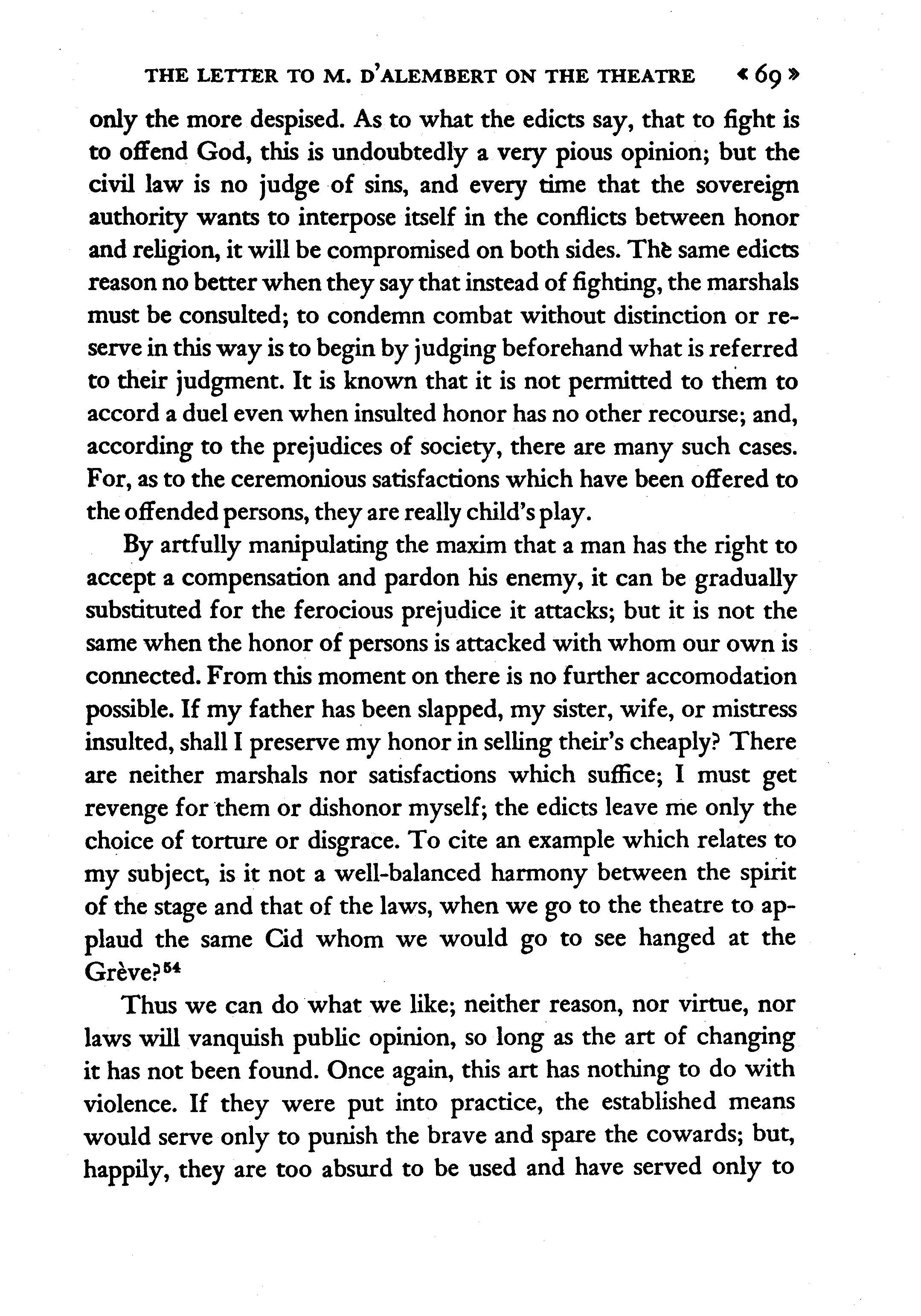
change the name of duels..How ought it to have been gone about? Private combats, it seems to me, ought to have been submitted absolutely to the jurisdiction of the marshals, either to judge them, to prevent them, or even to permit them. Not only ought they to have been allowed the right to grant combat when they judged it appropriate; but it was important that they sometimes exercise this right, if only to rid the public of an idea rather difficult to do away with and which by itself annuls all their authority, which is, that in the affairs which pass before them, they follow less their own sentiment than the will of the prince. Then there would have been no shame in asking them to permit combat on a necessary occasion; there would have been none even in refraining from doing so when the reasons for granting it were not judged sufficient. But there always will be shame to say to them: I have been offended; arrangeitso thatI willnothaveto fight.
By this means, all secret challenges would surely have fallen into disrepute, since, honor offended being able to defend itself, and courage being able to show itself on the field of honor, those who had hidden themselves to fight would have been quite justly suspect, and those whom the CourtofHonor judged to havefought badly·would have been turned over to the criminal courts as vile assassins. I admit that, since many duels would have been judged only after the fact and others even solemnly authorized, it would have, at first, cost the lives of some brave men; but it would have been to save the lives ofcountless others afterwards; whereas, from the blood which is spilled in spite of the edicts, there arises a reason forspillingevenmore.
Whatwould have happened afterwards? As the CourtofHonor acquired authority over the opinion of the people by the wisdom and the weight ofits decisions, it would little by little have become more severe until the legitimate occasions had been reduced to
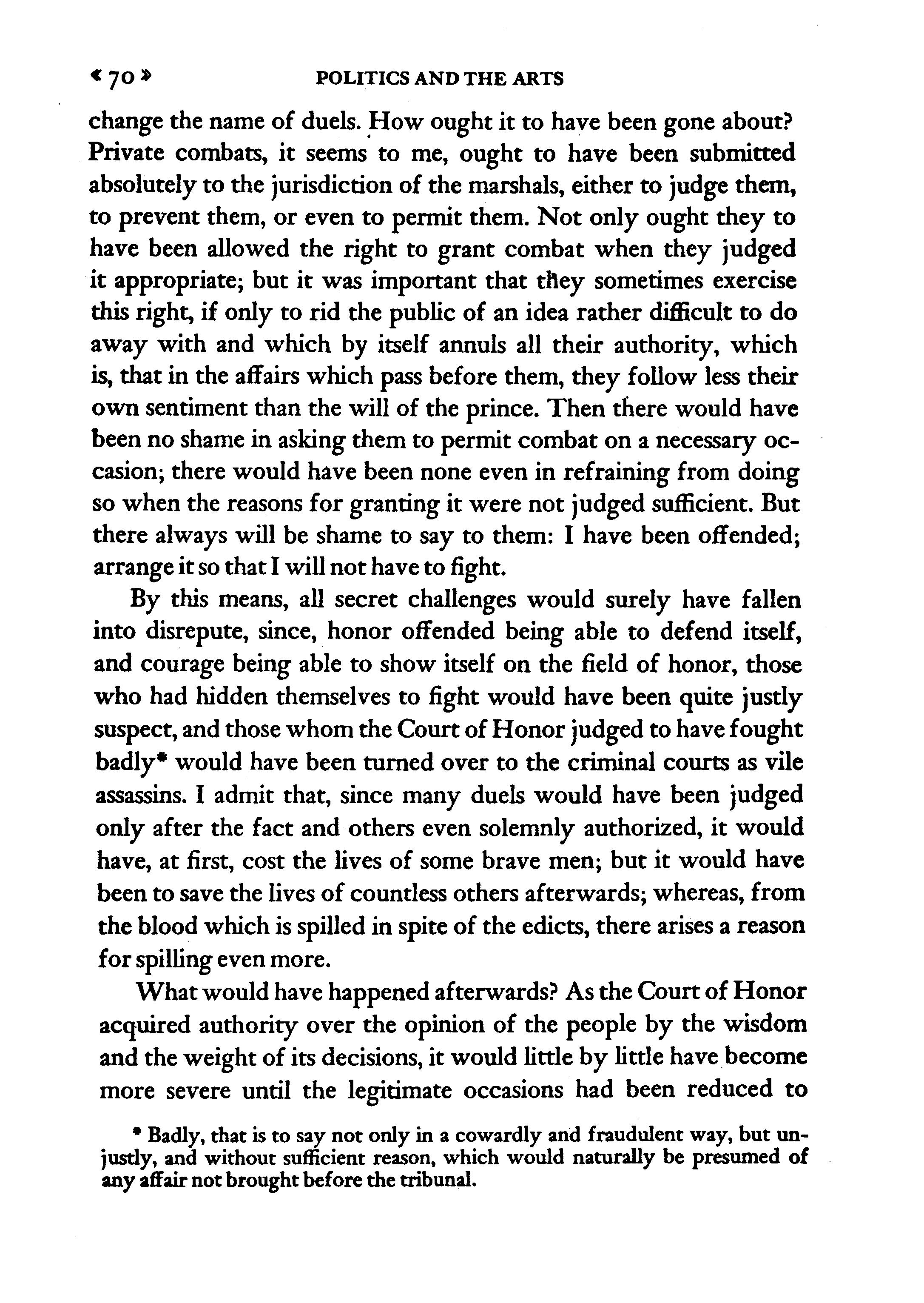
• Badly, that is to say not only in a cowardly and fraudulent way, but unjusdy, and without sufficient reason, which would naturally be presumed of any affairnotbroughtbeforethe tribunal.
nothingness, the point of honor had changed principles, and duels were entirely abolished. In truth, all this effort did not have to be taken, but also a useless institution was founded. If duels are rarer today, it is not because they are despised or punished, but because the morals [manners] have changed.· And the proof that this change comes from entirely different causes in which the government has no part, the proof that public opinion has in no wise changed on this point, is that, after so many ill-conceived pains, any gentleman who does not get satisfaction for an affront with swordinhand isno less dishonored than before.
A fourth consequence of the object of the same institution is that, no man being able to live civilly without honor, all the estates in which one carries a sword, from prince to private soldier, and even all the estates in which one is not worn, ought to be under the jurisdiction of this Court of Honor; the former to give an account of their conduct and their actions, the others of their speeches and their maxims; all equally subject to being honored or stigmatized according to the conformity or the opposition of their lives or sentiments to the principles of honor established in the nation and gradually reformed by the tribunal on the basis of those of justice and reason. To limit this competence to the nobles and the soldiers is to cut the shoots and leave the root; for if the point of honor makes the nobility act, it makes the people talk; the former fight only because the others judge them; and to change the actions of which public esteem is the object, the judgments that are made about them must be changed beforehand. I am convinced that we
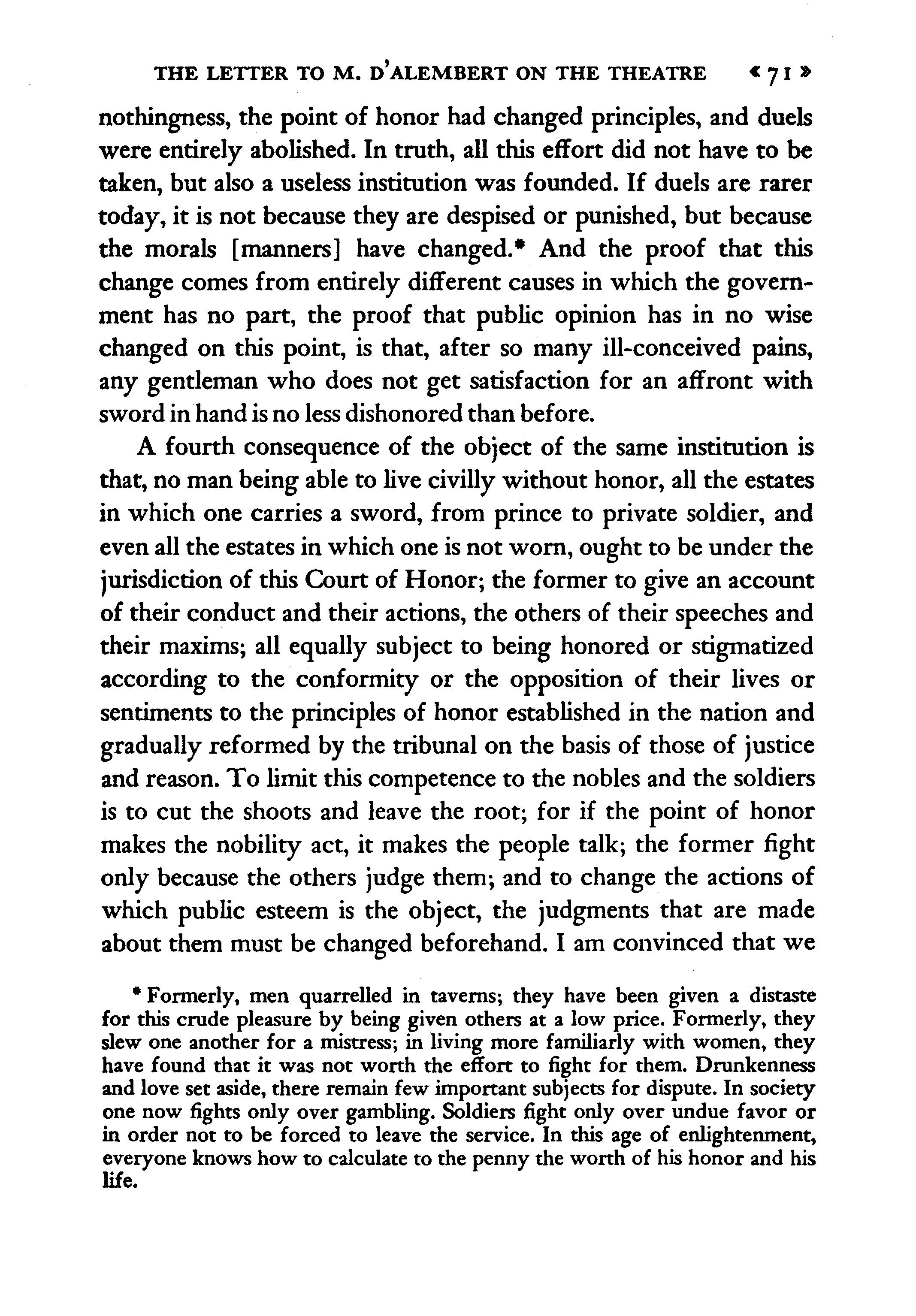
• Fonnerly, men quarrelled in taverns; they have been given a distaste for this crude pleasure by being given others at a low price. Fonnerly, they slew one another for a mistress; in living more familiarly with women, they have found that it was not wonh the effon to fight for them. Drunkenness and love set aside, there remain few imponant subjects for dispute. In society one now fights only over gambling. Soldiers fight only over undue favor or in order not to be forced to leave the service. In this age of enlightenment, everyone knows how to calculate to the penny the wonh of his honor and his life.
will never succeed in working these changes without bringing about the intervention of women, on whom men's way of thinking inlargemeasure depends.
Fromthisprincipleitfollows, moreover,that the tribunal ought to be more or less dreaded in the various ranks in proportion to their having more or less honor to lose according to the vulgar ideas which must always be taken here as rules. If the institution is well constructed, the grandees and the princes ought to tremble at the very name of Court of Honor. When it was established,all the personal quarrels then existing among the first men of the realm ought to have been brought before it; the tribunal would have judged them definitivelyinso far as is possible by the laws of honor alone; these judgments would have been severe; there would have been surrender of privilege and rank, personal and independent of the right of position, prohibition to bear arms or to appear before the prince, or other similar punishments, nothing in themselves, grievousin opinion, up to total disgrace which would have been regarded as the capital punishment handed down by the Court of Honor. All these punishments would have had, with the support of the supreme authority, the same effects that public judgment naturallyhaswhen force does not annulits decisions; the tribunal would not have pronounced about trifles but would have never done anything halfway; the king himself would have been summoned when he threw his cane out the window for fear, he said, of striking a gentleman;· he would have appeared,'as the defendant, with his opponent; he would have been solemnly judged and condemned to make amends for the indirect affront done the gentleman; and the tribunal would have at the same time awarded him a prize for the monarch's moderation in anger. This prize, which ought to have been a very but conspicuous mark, worn by the king throughout his life, would have been, it seems to me, an ornament
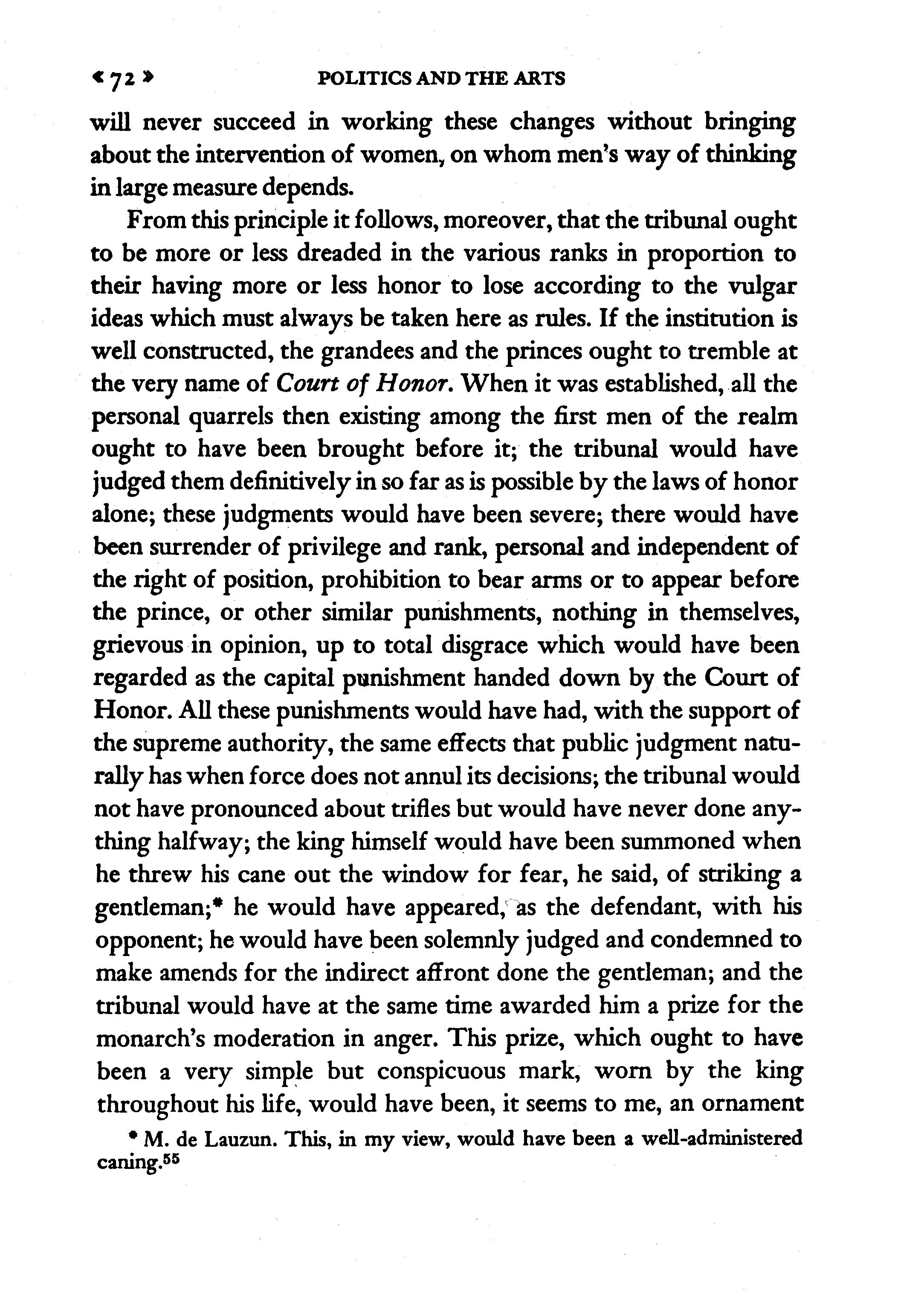
• M. de Lauzun. This, in my view, would have been a well-administered caning.55
more honorable than those of royalty, and I do not doubt that it would have become the subject of the refrains of more than one poet. It is certain that, as to honor, the kings themselves are more subject than anyone to public judgment and can, consequently, without lowering themselves, appear before the tribunal which represents it. Louis XIV was capable of doing such things; and I believe he would have done them if someone had suggested them tohim.
With all of these precautions and other similar ones, it is very doubtful if success could have been attained, because such an institution is entirely contrary to the spirit of monarchy. But it is quite certain that for having neglected them, for having wanted to mix force and laws in matters of prejudice. and change the point of honor by violence, the royal authority has been compromised and laws which went beyond their power have been rendered contemptible.
However, in what did this·prejudice consist that was to be done away with? In the wildest and most barbarous opinion which ever entered the human mind, namely, that bravery can take the place of all the duties of society; that a man is no longer a cheat, rascal, or slanderer, that he is civil, humane, and polite when he knows how to fight; that falsehood is changed into truth, robbery becomes legitimate, perfidy honesty, infidelity praiseworthy, as soon asallthisismaintained swordin hand; thatan affront is always made good by a sword thrust; that a man is never wrong in relation to another provided that he kill him. There is, I admit, another kind of affair in which politeness is mixed with cruelty and men are killed only by accident, that in which one fights to the first blood. 10 the first blood! Great God! And what do you·want to do with this blood, ferocious beast? Do you want to drink it? How can these things be thought of without emotion? Such are the prejudices that the kings of France, armed with the wholepublic force, have attacked in vain. Opinion, queen of the world, is not
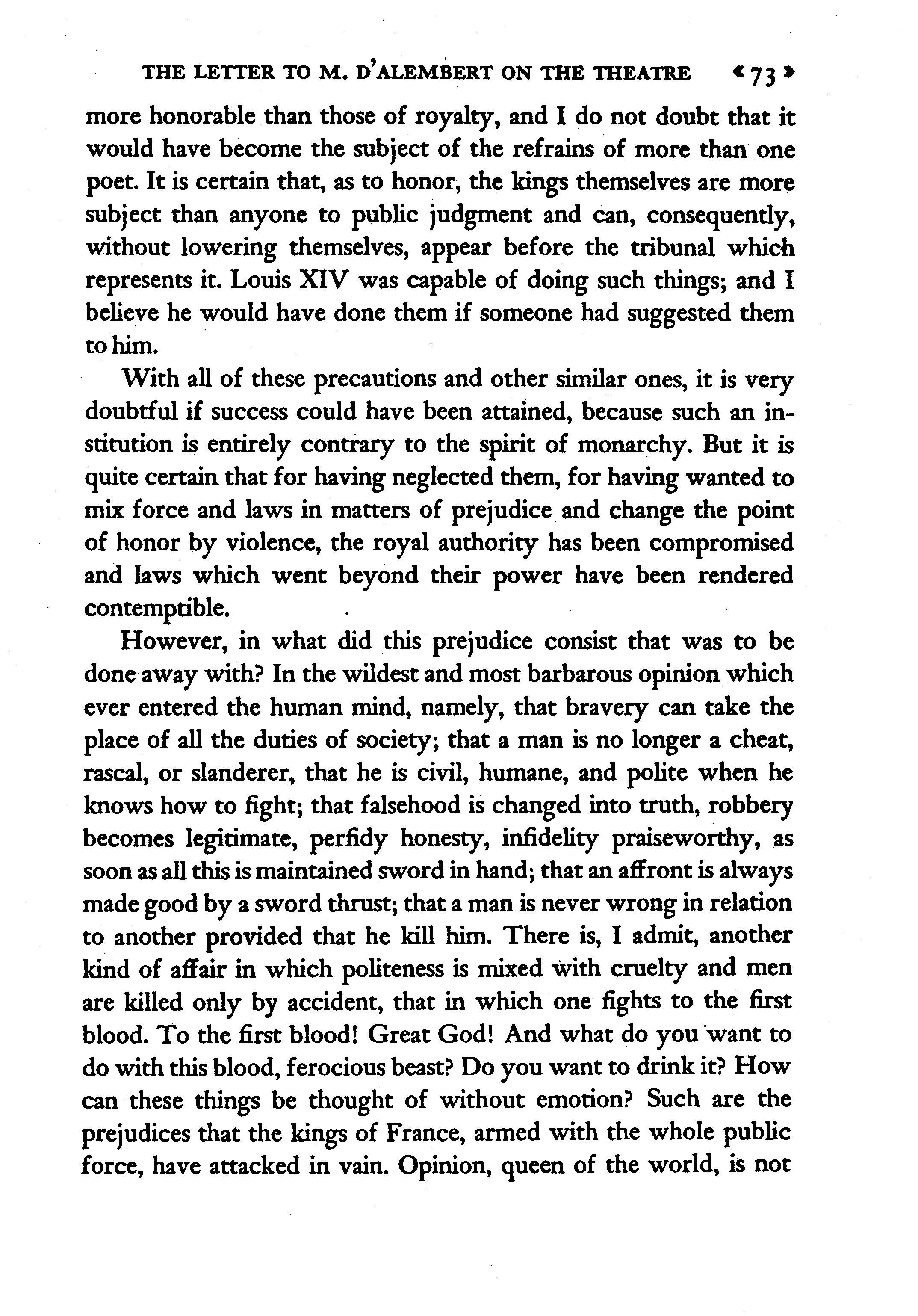
subject to the power of kings; they are themselves her first slaves.
I bring to an end this long digression which unhappily will not be the last; and, from this perhaps too dazzling example, si PIlT'VQ licet componere 111IlgniS,G6 I retwn to simpler applications. One of the inevitable effects of a theatre established in a town as little as ourswill be to change our maxims, or, if you please, our prejudices and our public opinions, which will necessarily change our morals [manners] for others, better or worse I do not yet say, but assuredly less appropriate to our constitution. I ask, Sir, by what efficient law will you remedy that? Ifthe government can do much in morals [manners], it is only in its primitive institution; when once it has determined them, not only does it no longer have the power to change them without itself changing, it has great difficulty in maintaining them against the inevitable accidents which attack them and the natural inclination which corrupts them. Public opinions, although so difficult to govern, are nevertheless in themselves very mobile and changing. Chance, countless accidental causes, countless unforeseen circumstances, do what force and reason could not; or,rather, itis precisely because chance directs them that force can do nothing; like the dice which leave the hand, whatever impulsion is given them does not bring up the desired pointanymore easily.
All that human wisdom can do is to forestall changes, to arrest from afar all that brings them on. But, once they are tolerated and authorized, we are rarely master of their effects and cannot be held answerable for them. How then shall we prevent those of which we have voluntarily introduced the cause? In imitation of the institution of which I have just spoken, will you propose to institute censors? We already have them;- and if the whole force of this tribunal barely suffices to maintain us as we are, when we have added a new inclination·to the penchant of morals [manners], what will it do to arrest this progress? It is clear that it will no
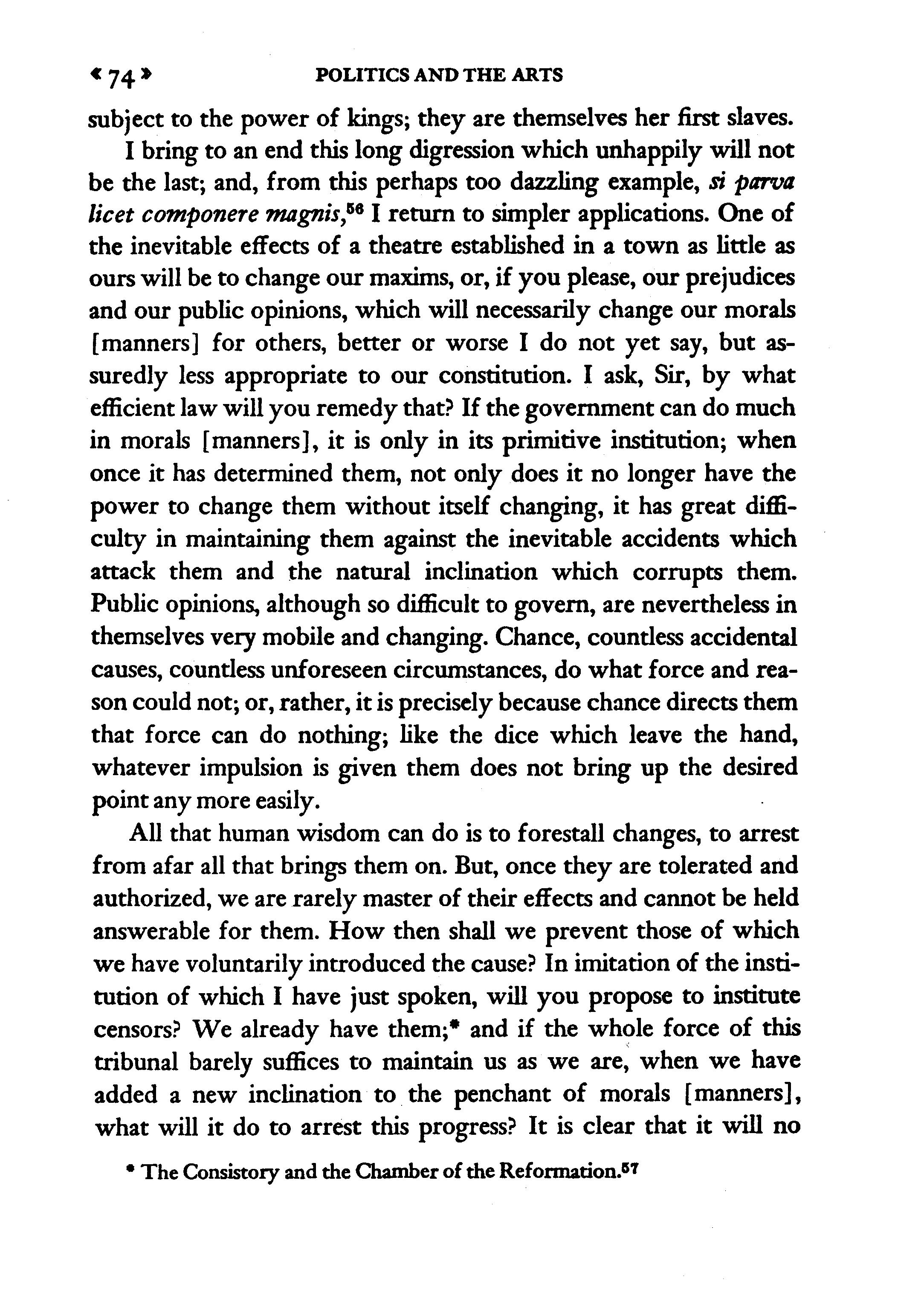
• The Consistory and the Chamberofthe Refonnation.CS7
longer suffice. The first sign of its impotence to forestall the abuses of the drama will be to permit its establishment. For it is easy to foresee that these two institutions will not long exist side by side, and that the drama will turn the censors to ridicule or the censors willdriveoutthe actors.
VIII
BUT it is not only the insufficiency of the laws in repressing bad morals [manners] when their cause is allowed to subsist that is the question here. It will be found, I foresee, that, my mind being filled with the abuses that the theatre necessarily engenders and with the general impossibility of preventing these abuses, I do not respond precisely enough to the expedient proposed, which is, to have actors who are decent men and women, that is to say, to make them such. At bottom, this special discussion is not really very necessary, since all that I have said up to now about the effects of the drama is independent of the morals [manners] of the actors, and would take place even if they profited from the lessons which you urge us to give them and became, under our guidance, so many models of virtue. However, out of consideration for the sentiment of those of my compatriots who see no other danger in the drama than the bad example of the actors, I want to investigate whether, even on the basis of their supposition, this expedient is practicable with some hope of success and whether it ought to suffice to reassurethem.
To begin by observing the facts before reasoning about the causes, I see in general that the estate of the actor is one of license and bad morals [manners]; that the men are given to disorder; that the women lead a scandalous life; that both, avaricious and spendthrift at the same time, always overwhelmed by debts and always spending money in torrents, are as little controlled in their dissipations as they are scrupulous about the means of providing for
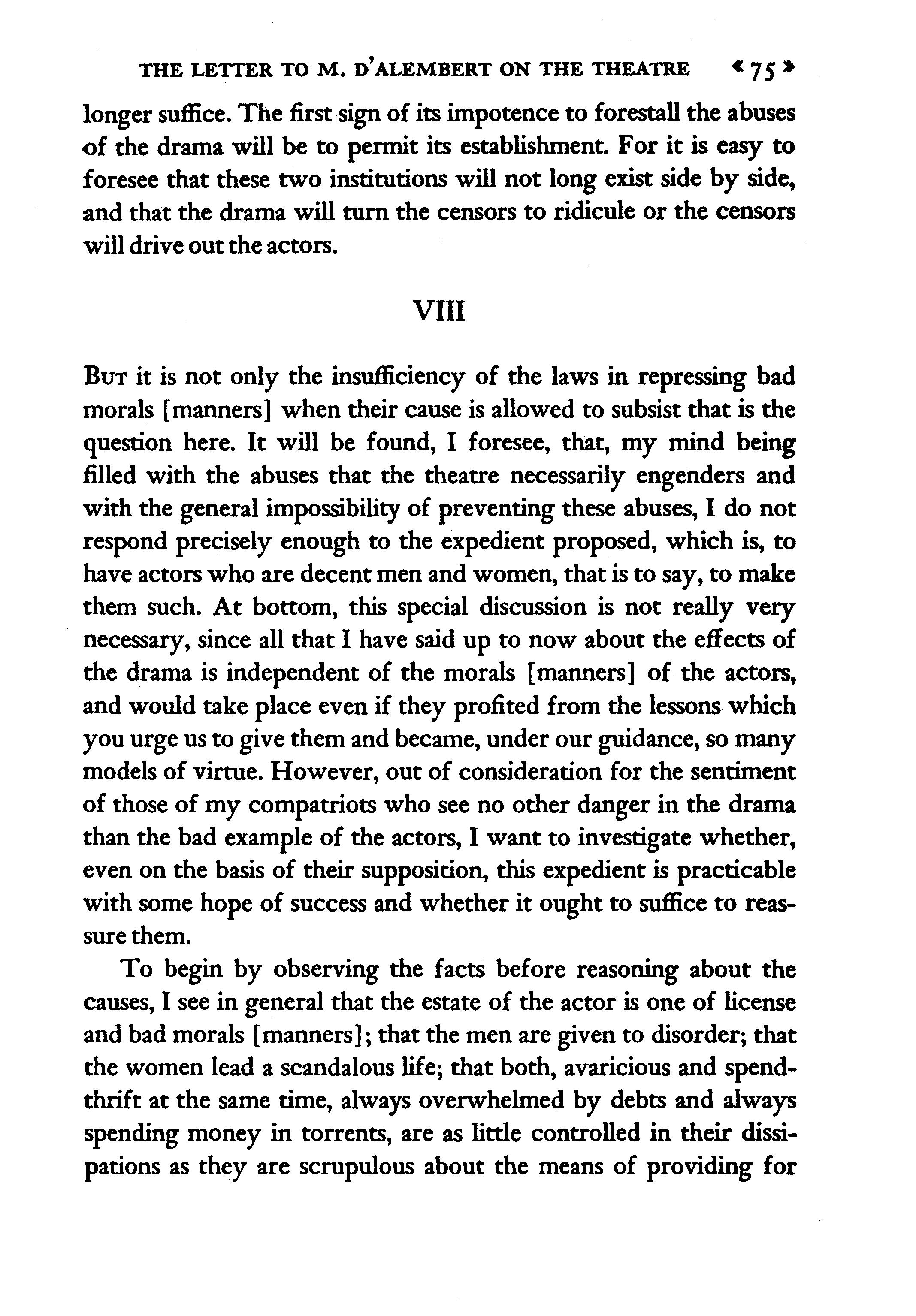
them. I see, moreover, that in every country their profession is one that dishonors, that those who exercise it, excommunicated or not, are everywhere despised;· and that even in Paris, where they are most respected and behave better than anywhere else, a man of the middle class would be afraid to frequent these same actors who are seen everyday at the tables of the great. A third observation, no less important, is that this disdain is stronger everywhere the morals [manners] are purer, and there are innocent and simple countrieswheretheactor'sprofessionalmosthorrifies.Theseareincontestable facts. You will tell me that they are only the results of prejudice. I agree; butsincethese prejudices are universal, auniversal cause must be sought, and I cannot see that it·can be found elsewhere thanin the professionitselfto which they relate. To that you answer that the actors only make themselves contemptible because they are held in contempt. But why should they have been held·in contempt if they had not been contemptible? Why would their estate have been worse thought of than others if there were nothing which distinguished it from them? This is perhaps what must be considered before justifying the actors at the expense of thepublic.
I could impute these prejudices to the declamations of the priests, ifI did not find them established among the Romans before the birth of Christianity and not only vaguely current in the spirit of the people but authorized by express laws which declared the actors disreputable, stripped them ofthe name and rights ofRoman citizens, and put the actresses in the class of prostitutes. Here every reason is missing, other than that which is drawn from the nature of the thing. The pagan priests and the devout were more in favor of, than against, the theatrical entertainments which were parts
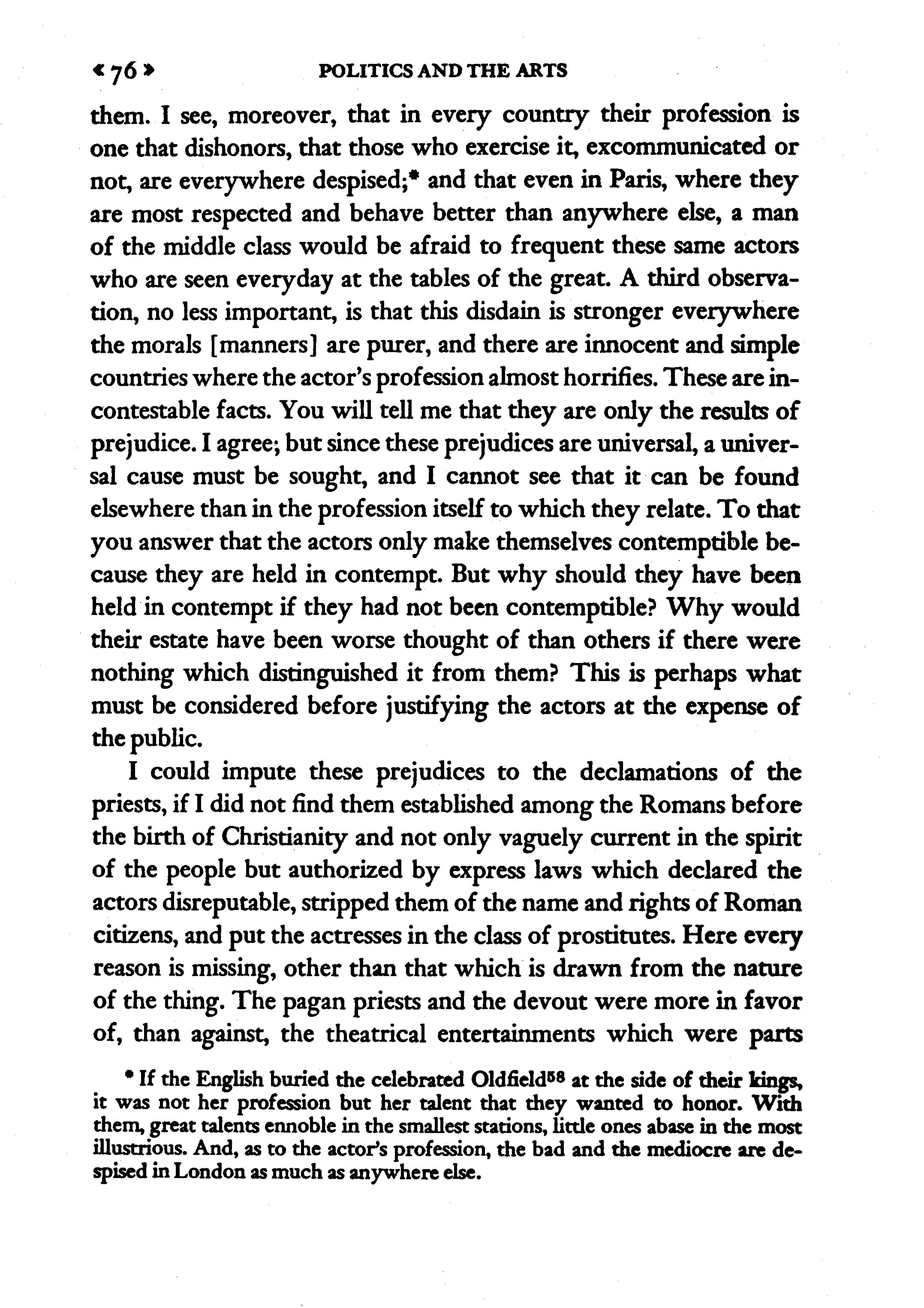
• If the English buried the celebrated OldfieldG8 at the side of their kings, it was not her profession but her talent that they wanted to honor. With them, great talents ennoble in the smalleststations, little ones abase in the most illustrious. And, as to the actor's profession, the bad and the mediocre are despisedinLondon as much as anywhere else.
of the games consecrated to religion,· and had no interest in paragingthe theatre nor did they do so. Nevertheless, as soon as this was the case, it was possible to criticize, as you do, the inconsistencyofdishonoringpeople whom we protect, pay, and pension. To tell the truth, it does not seem so strange to me as it does to you; for it is sometimes proper for the state to encourage and protect dishonorable but useful professions, without those who exercise them being more highly considered for that.
I read somewhere that this stigma was less attached to real actors than to histrions and jesters who soil their entertainment with indecency and obscenity. But this distinction is indefensible; for the words, actor and histrion, were perfectly synonymous and had no difference other than that one was Greek and·the other Etruscan. Cicero, in his book On The Orator," calls the two greatest actors which Rome ever had, Esopus and Roscius, histrions. In his defense of the latter, Cicero pities so decent a man for exercising so indecent a profession.81 Far from distinguishing between the actors, histrions, and jesters, or between the actors of tragedy and those of comedy, the law indiscriminately covers all those who step on the stage with the same opprobrium. Quisquis in scentrm prodierit flit Praetor, infamis est.62 It is true, only, that this opprobrium attached·itself less to performing as such than to making a profession of it, inasmuch as the Roman youth publicly performed the Atellanae or Exodia 63 at the end of the long plays without dishonor. With this exception, it can be observed in countless places that all the actors, without distinction, were slaves and were treated assuchwhen the public was notsatisfiedwith them.
I know of only one people which did not have the same maxims as all the others about this; that is the Greeks. It is certain that among them the profession of the theatre was so little indecent that Greece furnishes examples of actors charged with certain public
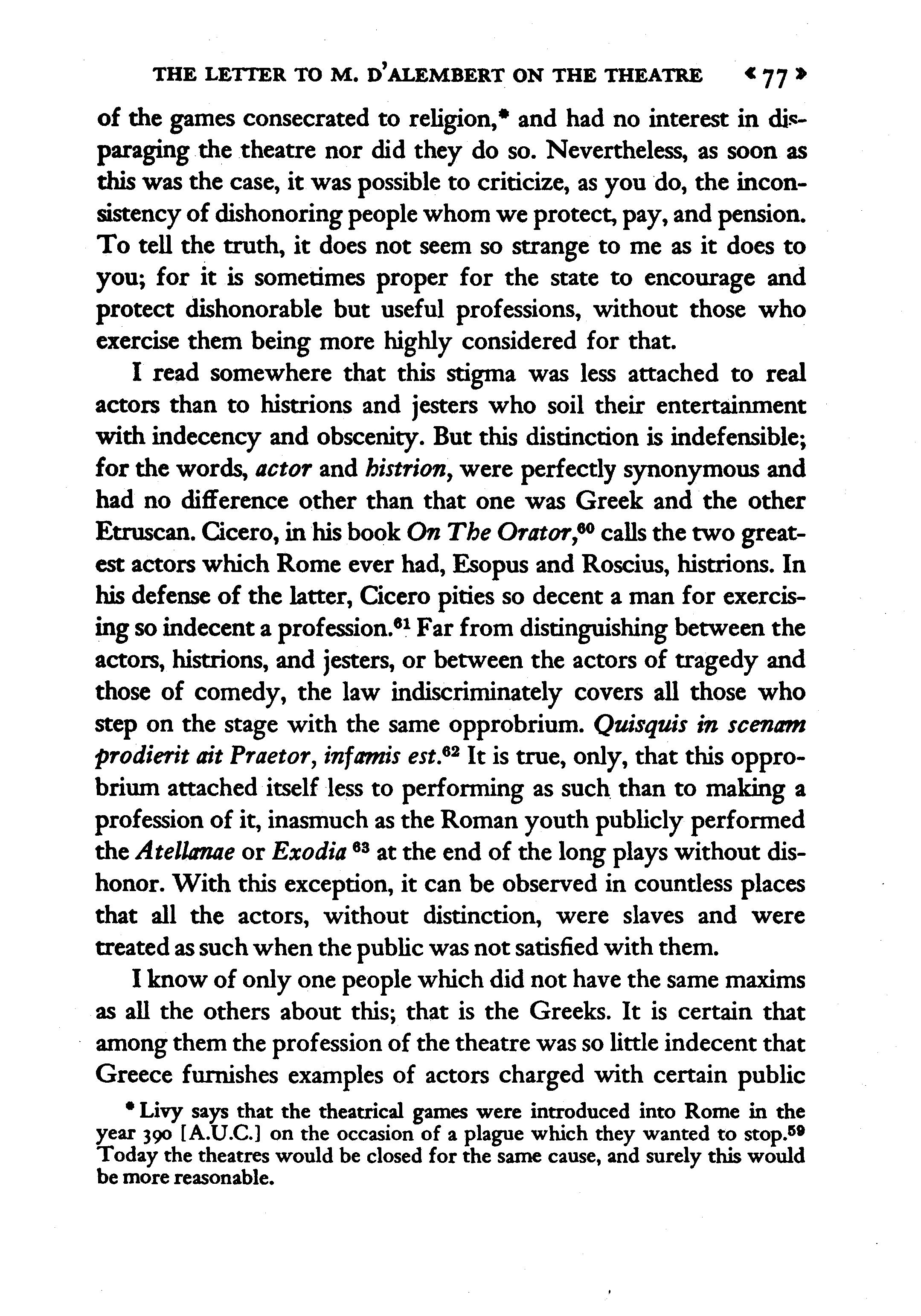
• Livy says that the theatrical games were introduced into Rome in the year 390 [A.U.C.] on the occasion of a plague which they wanted to stop.59 Today the theatres would be closed for the same cause, and surely this would be more reasonable.
functions either in the state or on embassies. But the reasons for this exception can easily be found. (I) Since tragedy, as well as comedy, was invented by the Greeks, they could not in advance put a mark of contempt on an estate the effects of which they did not yet know, and, when they began to be known, public opinion was already fixed. (2) Since tragedy had something sacred in its origin, at first its actors were regarded as priests rather than buffoons. (3) Since all the subjects of the plays were drawn exclusively from the national antiquities which the Greeks idolized, they saw in these actors less men who played fables than educated citizenswho performed the history oftheir countryso that it could be seen by their fellow citizens. (4) This people, so enthusiastic about its liberty as to believe that the Greeks were the only men free by nature,· recalled with a vivid sentiment of pleasure its ancient misfortunes and the crimes of its masters. These great depictions ceaselessly instructed this people who could not prevent themselves from feeling some respect for the organs of this instruction. (5) Tragedy was at first played only by men, so that in their theatre this scandalous·mixture of men and women, which makes of our theatres so many schools of bad morals [manners], was not to be seen. (6) Finally, their performances had none of the meanness of today's; their theatres were not built by interest and avarice; they were not closed up in dark prisons; their actors had no need to make collections from the spectators or to count out of the comer of their eye the number of people whom they saw coming inthe doorto besureoftheirsupper.
These great and proud entertainments, given under the sky beforeawhole nation, presented on all sidesonly combats, victories, prizes, objects capable of insipiring the Greeks with an ardent emulation and of warming their hearts with sentiments of honor and glory. It is in the midst of this imposing array, so fit to elevate one and stir the soul, that the actors, animated with the same zeal,
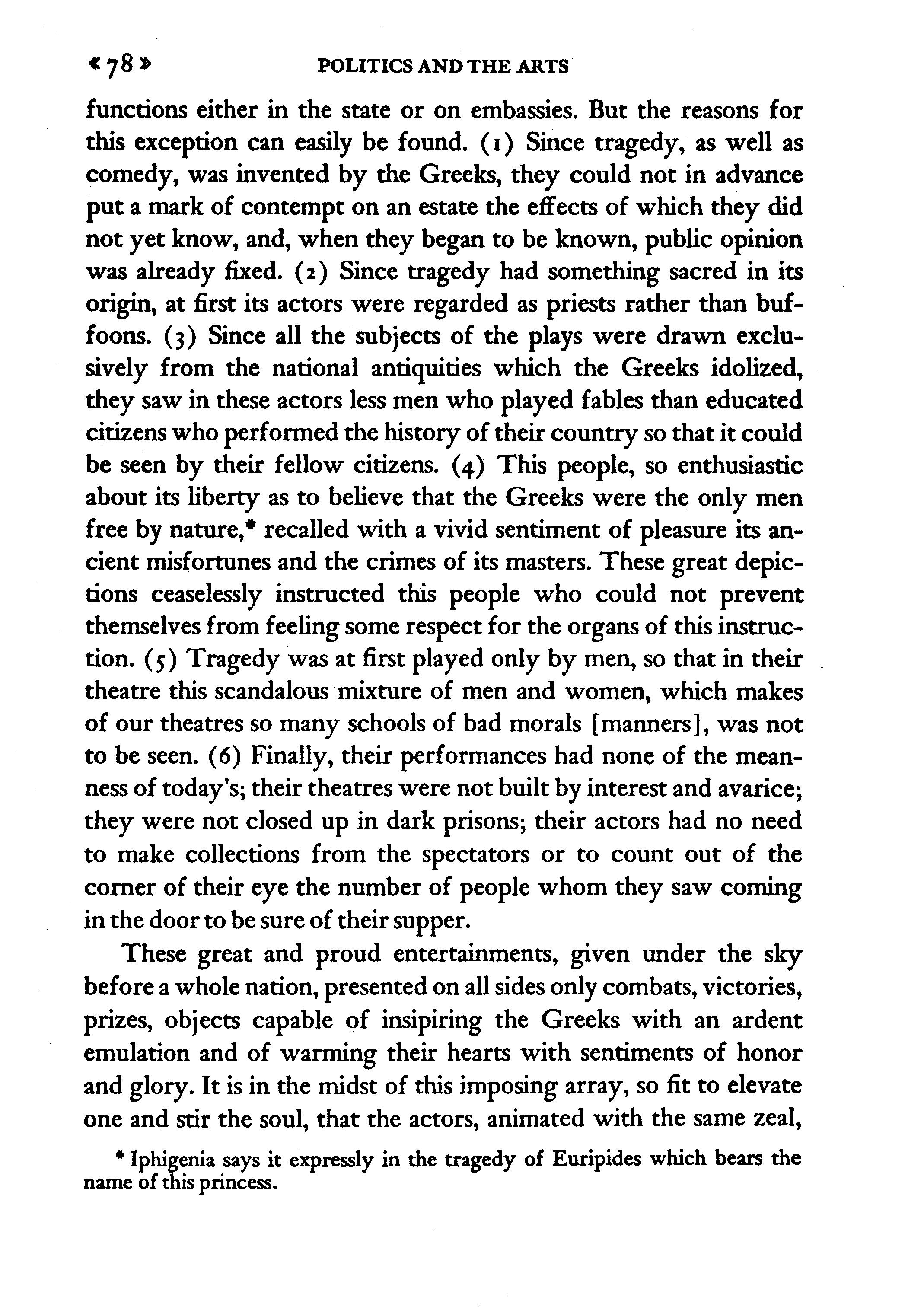
• Iphigenia says it expressly in the tragedy of Euripides which bears the name ofthis princess.
shared, according to their talents, the honors rendered to the conquerors of the games, often the first men of the nation. I am not surprised that, far from abasing them, their profession, exercised in this manner, gave them that pride of courage and that noble disinterestedness which seemed sometimes to raise the actor to the level of his role. With all of this, never was Greece, Sparta excepted, cited as an example of good morals [manners]; and Sparta, which tolerated no theatre,· was not concerned with honoring thosewho appearedinit.
Let us return to the Romans who, far from following the example of the Greeks in this respect, set an entirely contrary one. If their laws declared the actors disreputable, was it with the design of dishonoring the profession? What would have been the benefit of so cruel a provision? They did not dishonor it, they only gave authoritative expression to the dishonor which is inseparable from it. For never do good laws change the nature of things; they only follow it, and only such laws are obeyed. The point is not to begin by crying out against prejudices but first to know if they are only prejudices, whether the actor's profession is really not dishonorable in itself. For if unfortunately it is, for all that we decree that it is not, rather than rehabilitating it, we will only abase ourselves.
What is the talent of the actor? It is the art of counterfeiting himself, of putting on another characterthan his own, of appearing different than he is, of becoming passionate in cold blood, of saying what he does not think as naturally as if he really did think it, and, finally, of forgetting his own place by dint of taking another's. What is the profession of the actor? It is a trade in which he performs for money, submits himself to the disgrace and the affronts that others buy the right to give him, and puts his person publicly on sale. I beg every sincere man to tell if he does not feel in the depths of his soul that there is something servile and base in this traffic of oneself. You philosophers, who have the pretention of being so far above prejudices, would you not all die of shame if,
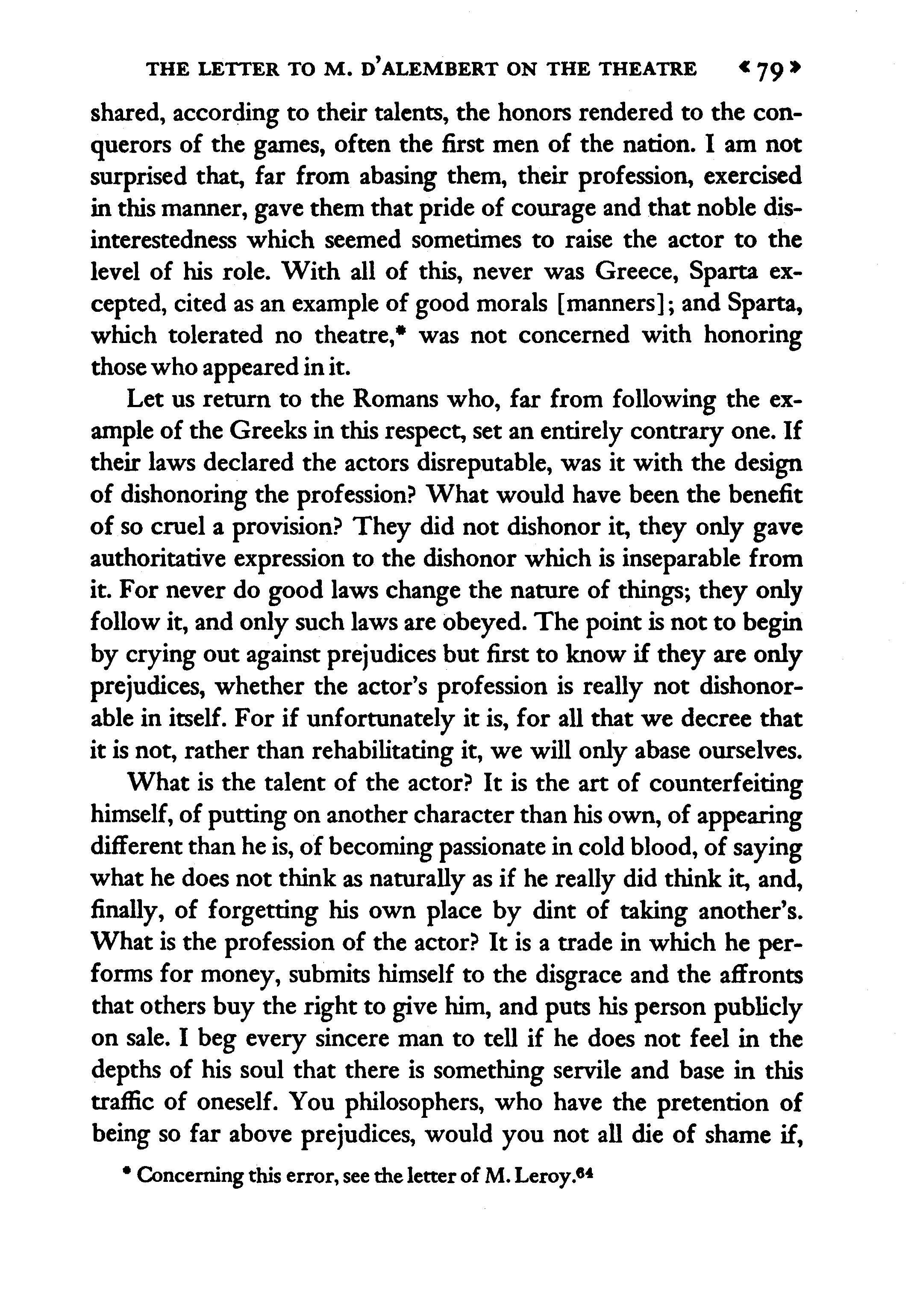
• Concerningthis error,see theletterofM.Leroy.64
ignominiously gotten up as kings, you had to take on in the eyes of the public a different role than your own and expose your majesties to the jeers of the populace? What, then, is the spirit that the actor receives from his estate? A mixture of abjectness, duplicity, ridiculous conceit, and disgraceful abasement which renders him fit for all sorts of roles except for the most noble of all, thatofman,which heabandons.
I know that the actor's playing is not that of a scoundrel who wants to cheat, that he does not intend to be really taken for the person he represents or to be believed by the passions he imitates, and that, in presenting this imitation· for what it is, he renders it entirely innocent. And I do notprecisely accuse him of being a deceiver but of cultivating by profession the talent of deceiving men and of becoming adept in habits which can be in':' nocent only in the theatre and can serve everywhere else only for doing harm. Will these men, so well adorned, so well practiced in the tone of gallantry and in the accents of passion, never abuse this art to seduce young persons? Will these thieving valets, so subtle with tongue and hand on the stage, never make a useful application of their art in the interests of a profession more expensive than lucrative, will they never have any useful distractions? Will they never take the purse of a prodigal son or of an avaricious father for that of Leander or Argan?· In all things the temptation to do evil increases with its facility; and actors must be more virtuous thanothermeniftheyarenotmore corrupt.
The orator and the preacher, it could be said, make use of their persons as does the actor. The difference is, however, very great. When the orator appears in public, it is to speak and not to show himself off; he represents only himself; he fills only his own role,
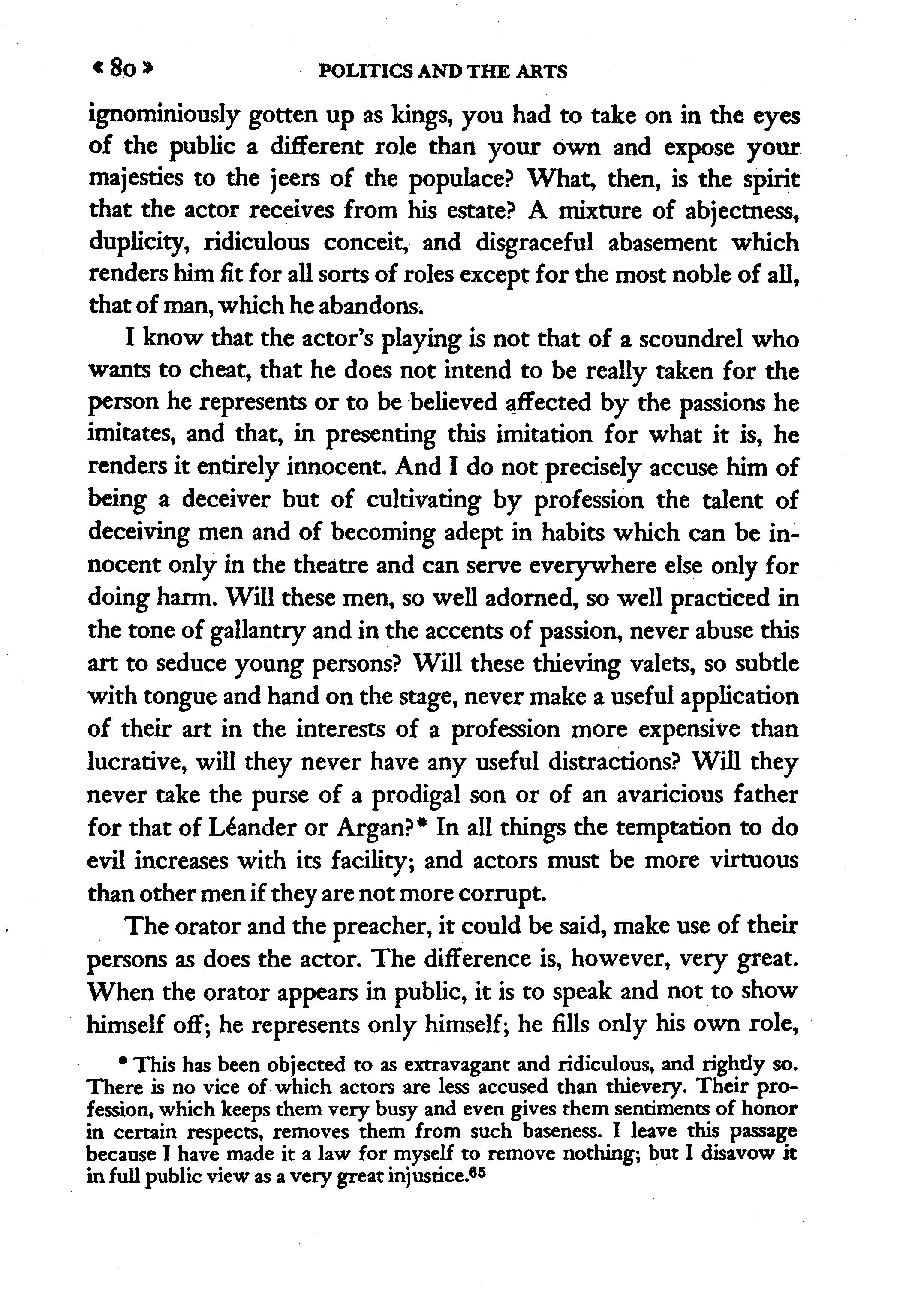
• This has been objected to as extravagant and ridiculous, and righdy so. There is no vice ofwhich actors are less accused than thievery. Their profession, which keeps them very busy and even gives them sentiments of honor in cenain respects, removes them from such baseness. I leave this passage because I have made it a law for myself to remove nothing; but I disavow it infull public view as avery greatinjustice.65
speaks only in his own name, says, or ought to say, only what he thinks; the man and the role being the same, he is in his place; he is inthe situation of any citizenwho fulfils the functions of his estate. Butan actoron the stage, displaying other sentiments than his own, saying onlywhat he is made to.say, often representing a chimerical being, annihilates himself, as it were, and is lost in his hero. And, in this forgetting of the man, if something remains of him, it is used as the plaything of the spectators. What shall I say of those who seem to be afraid of having too much merit as they are and who degrade themselves to the point of playing characters whom they would bequite distressed to resemble? It is certainly a very bad thing to see so many rascals playing the roles of decent men in society; but is there anything more odious, more shocking, more' ignoble, than a decent man playing a rascal's role in the theatre and using all his talent to make criminal maxims convincing, maxims forwhichhehimselfhasonlydisgust?
If all of this only seems to give evidence of a not very respectable profession, the dissoluteness of the actresses should be seen as anothersource of bad morals [manners] which compels and carries in its wake dissoluteness in the actors. But why is this dissoluteness inevitable? Oh, why! In any other time there would be no need to ask; but, in this age when prejudices reign so proudly and error gives itself the name of philosophy, men, besotted with their vain learning, have closed their minds to the voice of reason and their heartstothatofnature.
In every station, every country, every class, the two sexes have so strong and so natural a relation to·one another that the morals [manners] ofthe one always determine those ofthe other. Notthat these morals [manners] are always the same, but they always have thesame degree of goodness, modified bythe penchants peculiar to each sex. The English women are gentle and timid. The English men are hard and haughty. From whence does this apparent opposition stem? From the fact that the character of each sex is thus heightened and that it.is also the national character to carry every..
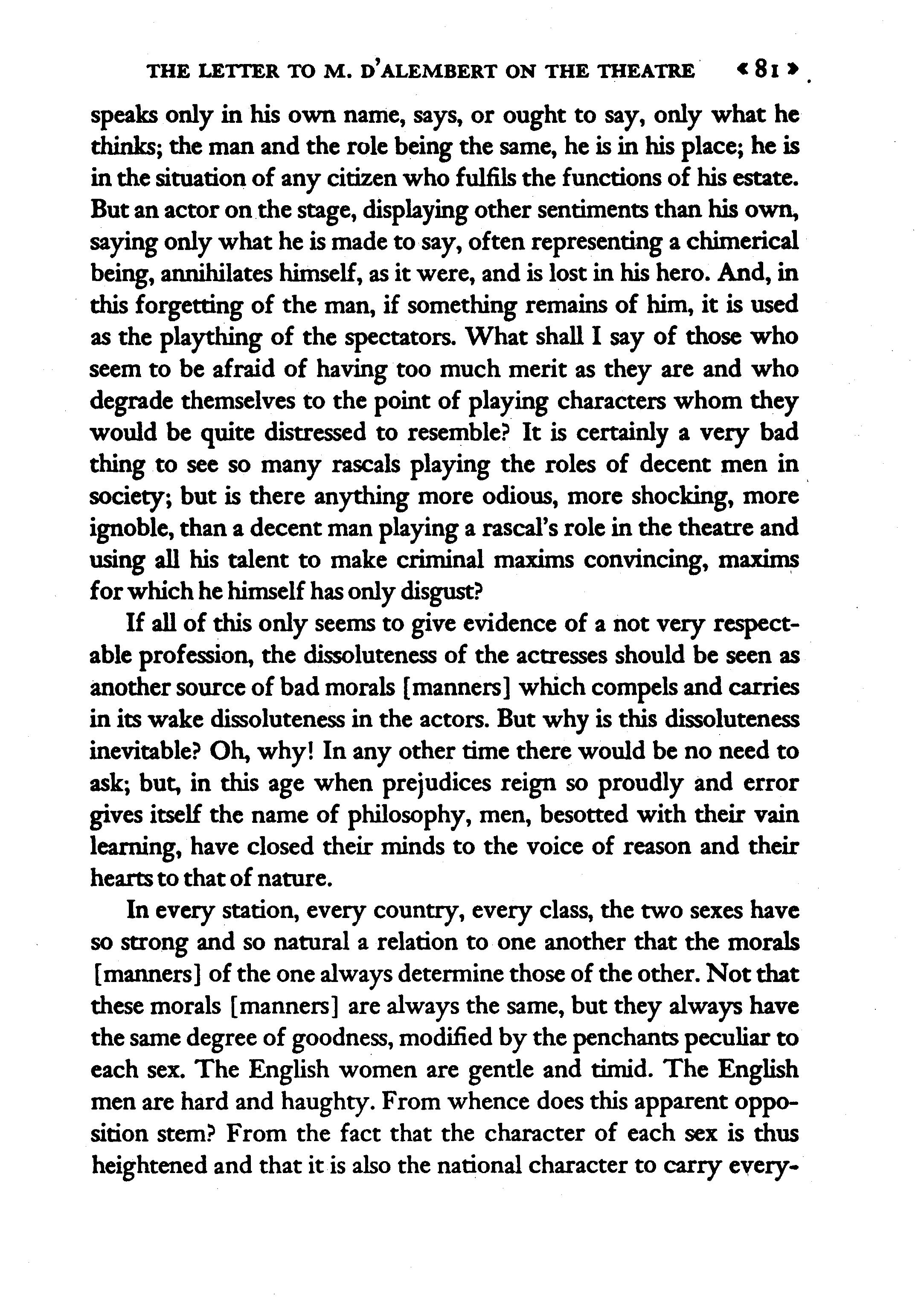
thing to the extreme. Apart from this, everything is similar. The two sexes like to live apart; both esteem the pleasures of the table; both gather to drink after the meal, the men wine, the women tea; both indulge in games without them being a rage and make a craft of it rather than a passion; both'have a great respect for decent things; bothlove their countryand itslaws; both honorconjugal fidelity, and, if they violate it, do not make it an honor to do so; domestictranquillity pleases both; both are quietand taciturn; they are both difficult to move; both violent in their Passions; for both, love is terrible and tragic, it decides the fate of their days; nothing less is atstake, says Muralt,88 than losingreason or life in it. Finally, both enjoy themselves in the country, and English ladies like to wander in their solitary parks as much as to go to show themselves off at Vauxhall. From this common taste for solitude arises a taste for the contemplative readings and the novels with which England is inundated.· Thus both, withdrawn more into themselves, give themselves less to frivolous imitations, get more of a taste for the true pleasures of life, and think less of appearing happy than of beingso.
I have made especial mention of the English because they are, of all the nations of the world, the one in which the morals [manners] of the two sexes appear at first glance to be most contrary. From their relation in this country we can draw a conclusion about the others. The whole difference consists in the fact that the life of women is a continual development of their morals [manners], whereas, since those of men disappear in the uniformity of business, one must wait to see them in their pleasures to judge of them. Do you want to know men? Study \\'omen. This maxim is general, and up to this point everybody will agree with me. But if' I add that there are no good morals [manners] for women outside of a withdrawn and domestic life; if I say that the peaceful care of the family and the home are their lot, that the dignity of their sex
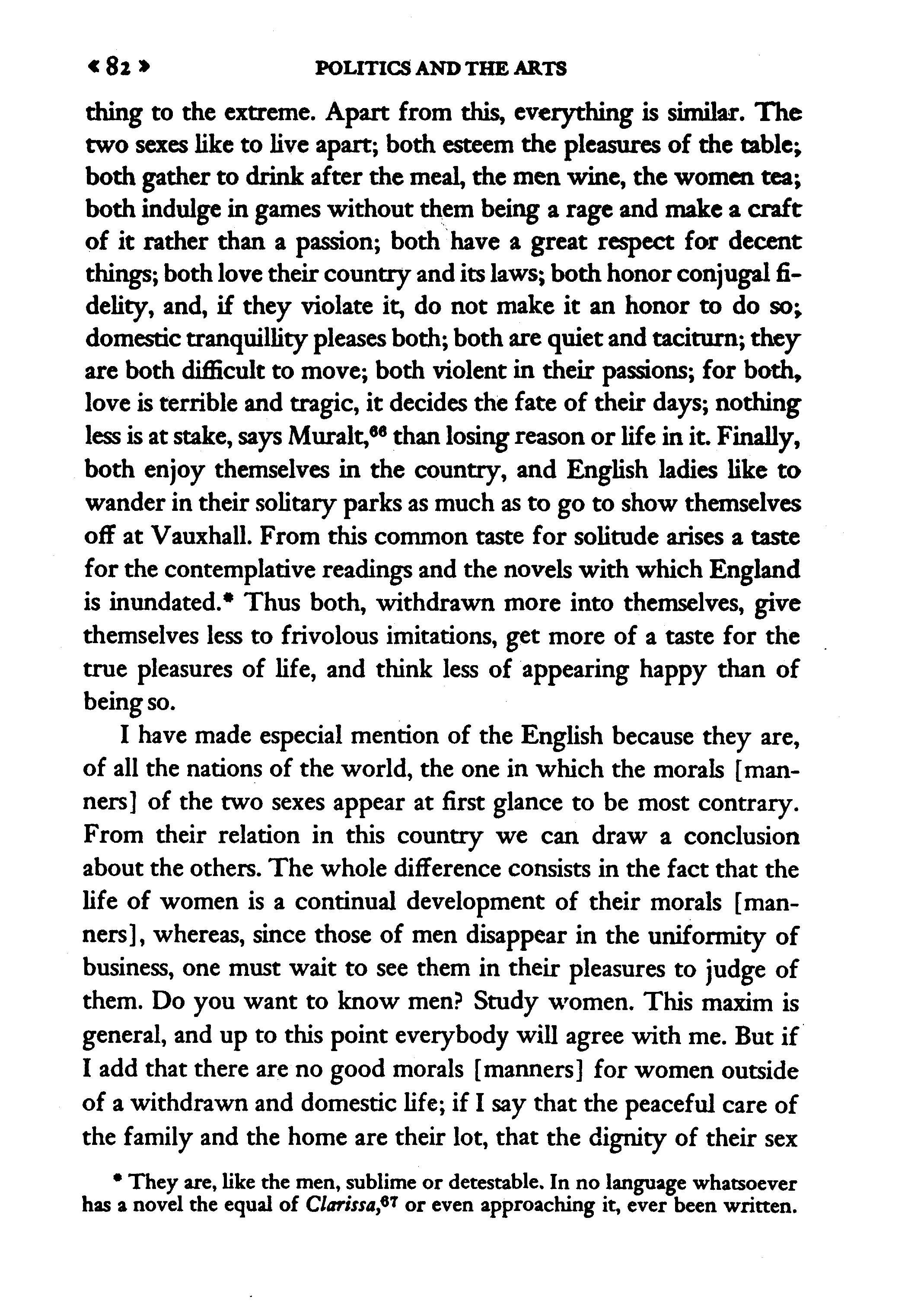
• They are, like the men, sublime or detestable. In no language whatsoever has a novel the equal of ClarisslI,6T or even approaching it, ever been written.
consists in modesty, that shame and chasteness88 are inseparable from decency for them, that when they seek for men's looks they are already letting themselves be corrupted by them, and that any woman who shows herself off disgraces herself; I will be immediately attacked by this philosophy of a day which is born aI)d dies in the comer of a big city and wishes to smother the cry of nature and the unanimous voice of humankind. "Popular prejudices!" exclaim some. "Petty errors of childhood. Deceit of the laws and of education! Chasteness is nothing. It is only an invention of the social laws to protect the rights of fathers and husbands and to preserve some order in families. Why should we blush at the needs which nature has given us? Why should we find a motive for shame in an act so indifferent in itself and so beneficialin its effects as the one which leads to the perPetuation of the species? Since the desires are equal on both sides, why should their manifestations be different? Why should one of the sexes deny itself more than the other in the penchants which are common to them both? Why should man have different laws on this pointthan theanimals?"
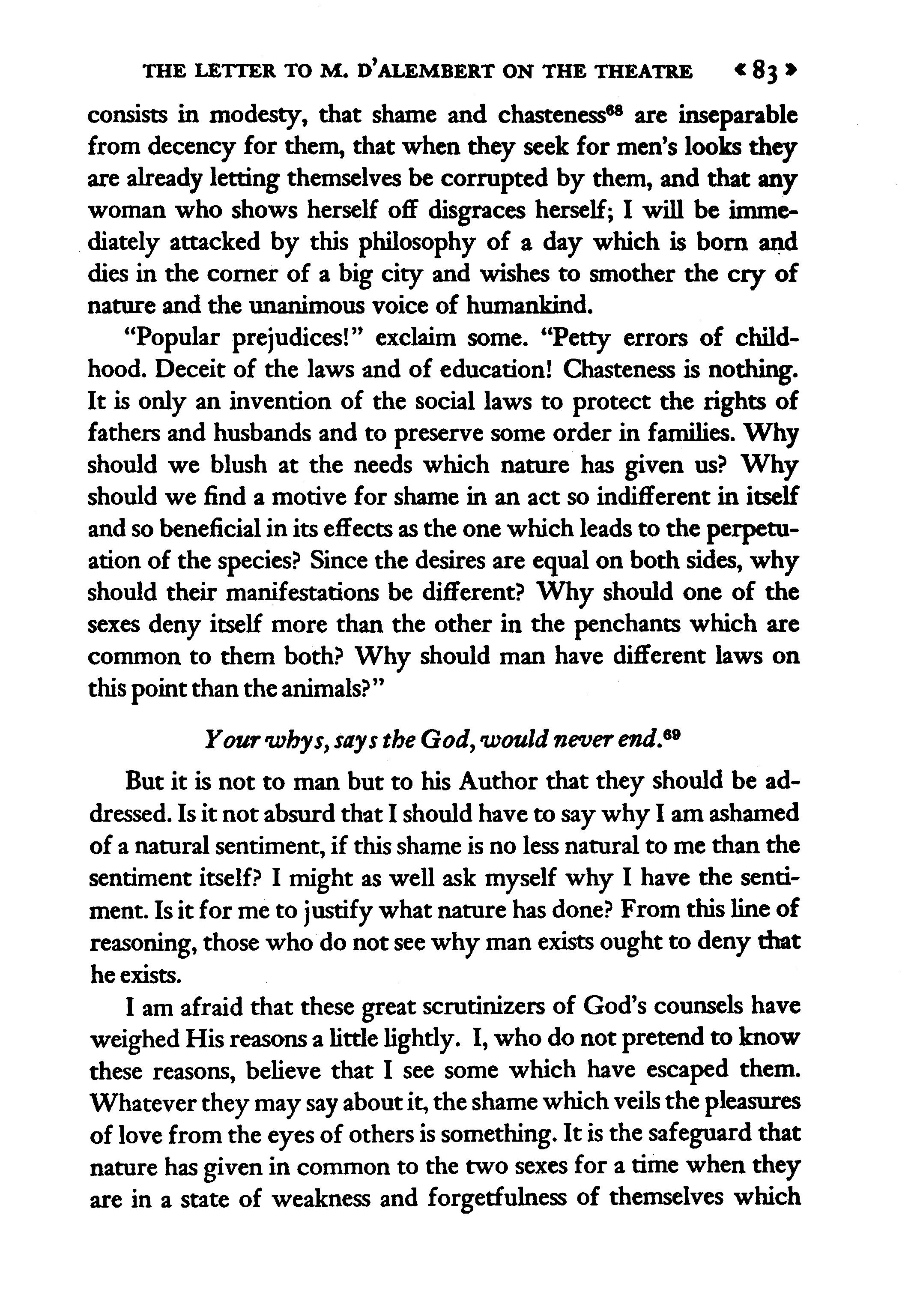
Y OUT whyS, sllYS the God, would never end.89
But it is not to man but to his Author that they should be addressed. Is it not absurd that I should have to say why I am ashamed of a natural sentiment, if this shame is no less natural to me than the sentiment itself? I might as well ask myself why I have the sentiment. Isitfor me to justifywhat nature has done? From this line of reasoning, those who do not see why man exists ought to deny that he exists.
I am afraid that these great scrutinizers of God's counsels have weighed His reasonsa little lightly. I, who do not pretend to know these reasons, believe that I see some which have escaped them. Whatevertheymaysay aboutit, the shamewhichveilsthe pleasures of love from the eyes of others is something. It is the safeguard that nature has given in common to the two sexes for a time when they are in a state of weakness and forgetfulness of themselves which
puts them at the mercy of the first comer; it is thus that it covers .sleep with the shadows of night, so that, during·this time of darkness, they will be less exposed to one another's attacks. It is thus that it causes every sick animal to seek isolation and deserted places, so that it can suffer and die in peace, safe from the blows it cannolongerfend off.
In relation to the chasteness of women inparticular, what gentler arm could this same nature have given to the one it destined to resist? The desires are equal. What does that mean? Are there on both sides the same faculties for their satisfaction? What would become of the human species if the order of attack and defense were changed? The assailant would choose by chance times when victory would be impossible; the assailed would be left in peace when he needs to be vanquished, and pursued without interruption when he is too weak to succumb; in a word, since the power and the will, always in disaccord, would never permit the desires to be mutually shared, love would no longer be the support of nature butitsdestroyerandplague.
H the two sexes had equally made and received the advances, vain importunity would have never been preserved; the passions, ever languishing in a boring freedom, would have never been excited; the sweetest ofall the sentiments would hardly have touched the human heart, and its object would have been badly ful1illed. The apparentobstacle,whichseemstokeepthisobjectatadistance, is in reality what brings it nearer. The desires, veiled by shame, become only the more seductive; in hindering them, chasteness inflames them. Its fears, its tricks, its reserves, its timid avowals, its tenderand naive delicacy, say better what chasteness thinks to hide than passion could have said it without chasteness. It is chasteness which lends value to favors granted and sweetness to rejection. True love possesses really what chasteness alone contests with it; that mixture of weakness and modesty·renders it more touching and tenderer; the less it obtains, the more the value of what it does
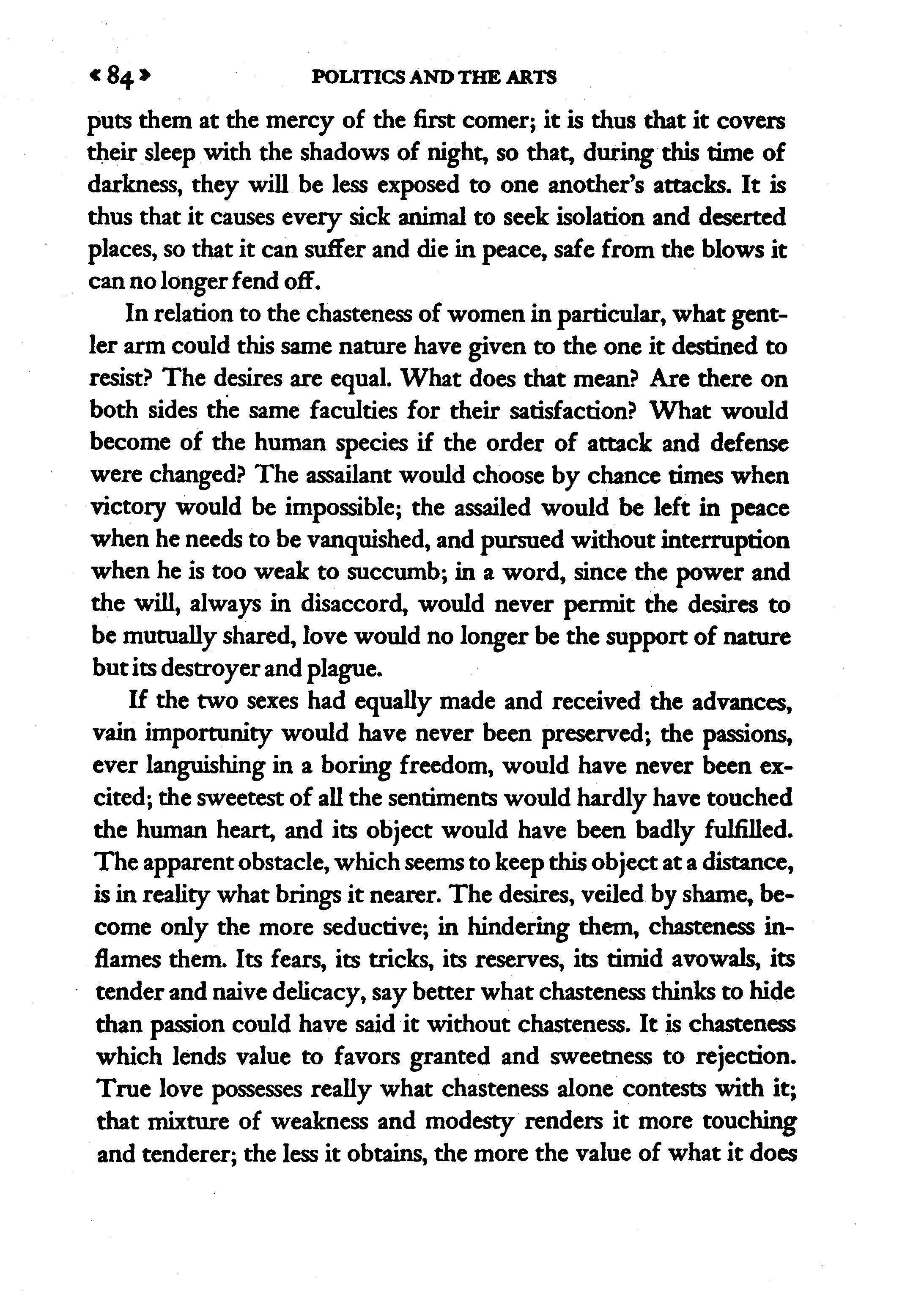
obtain increases, and it is thus that it enjoys both its privations and itspleasures. "Why," they ask, "should what is not shameful for a man be so for a woman? Why should one of the sexes make a crime for itself out of what the other believes itself permitted?" As if theconsequences were the same on both sides! As if all the austere duties of the woman were not derived from the single fact thata child ought to have a father. Even if these important considerations were·lacking to me, we would nevertheless still have the same response and it would still be without reply. Nature wanted it so, and it would be a crime to stifle its voice. The man can be audacious, such is his vocation;· someone has to declare. But every woman without chasteness is guilty and depraved, because she tramples on a sentimentnaturalto hersex.
How can one dispute the truth of this sentiment? If the whole earth did not give unmistakable witness to it, the simple compari-
• We must distinguish between this audacity, and insolence and brutality. For nothing issues from more opposed sentiments, nor does anything have more contrary effects. I suppose an innocent and free love, receiving its laws only from itseH; it belongs to this love alone to preside at its mysteries and to form the union of persons as well as that of hearts. When a man insults the chasteness of woman and attacks with violence the charms of a young object which feels nothing for him, his coarseness is not the result of ardent passion; it is only scandalous outrage; it bespeaks a soul without morals [manners], without refinement, incapable of either love or decency. The greatest value of the pleasures is in the heart of the one who grants them; a true lover would find only pain, anger, and despair in the very possession of the one he loves if hethought he were notloved in return.
To wish to satisfy his desires insolently, without the consent of the one who gave rise to them, is the audacity of a satyr; that of a man is to know how to give wimess to them without displeasing, to make them attractive, to act in such a way that they be shared, to enslave the sentiments before attacking the person. It is not yet enough to be loved; desires shared do not alone give the right to satisfy them; the consent of the will is also needed. The heart accords in vain what the will refuses. The decent man and the lover holds back even when he could obtain what he wishes. To win this silent consent is to make use of all the violence permitted in love. To read it in the eyes, to see it in the ways in spite of the mouth's denial, that is the art of he who knows how to love. If he then completes his happiness, he is not brutal, he is decent. He does not insult chasteness; he respects it; he serves it. He leaves it the honor ofstill defendingwhat itwould have perhaps abandoned.
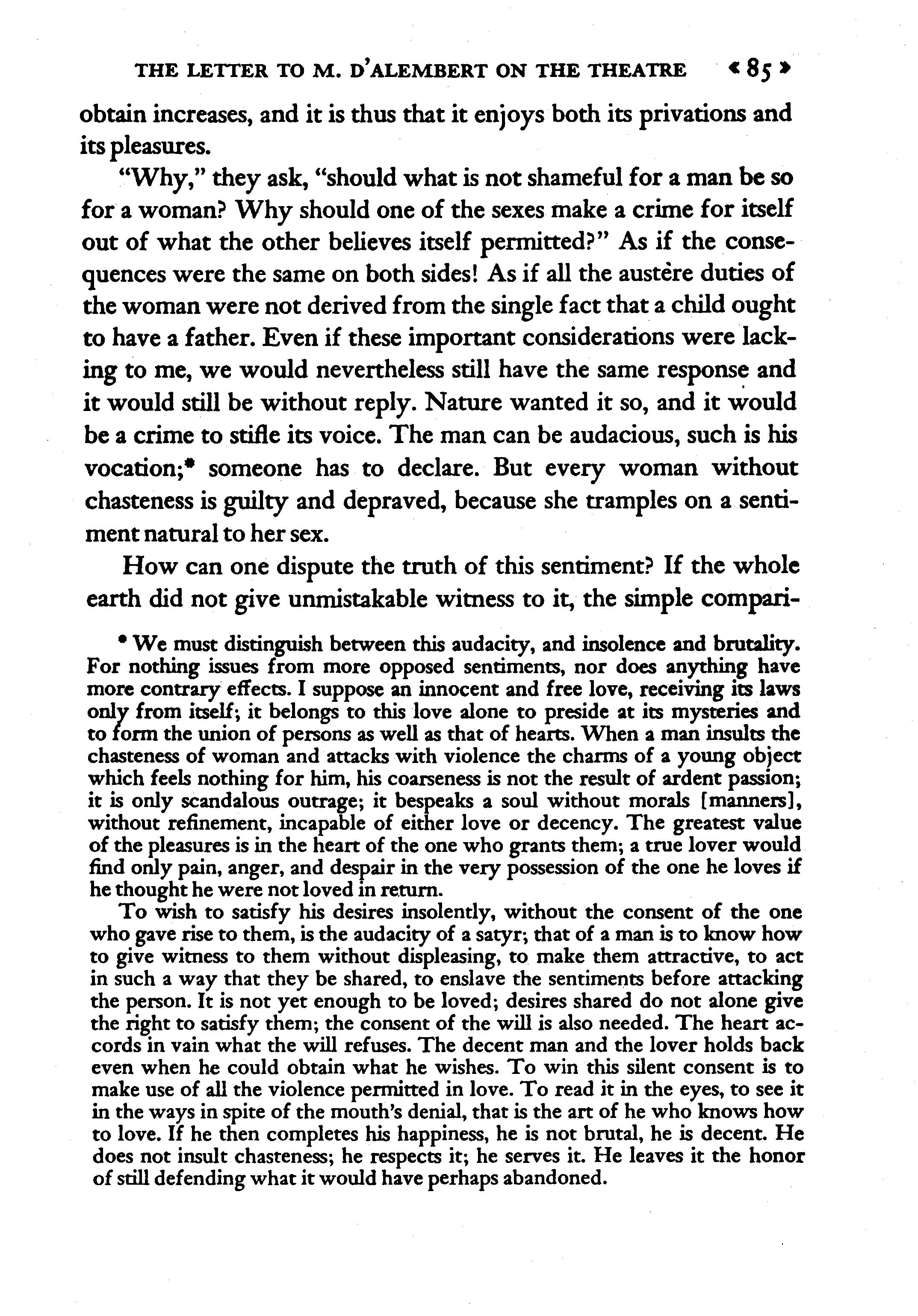
son of the sexes would suffice for recognizing it. Is it not nature which adorns young women with those features so sweet and which a little shame renders even more touching? Is it not nature which puts that timid and tender glance in their eyes which is resisted with such difficulty? Is it not nature which gives their complexion more lustre and their skin more delicacy so that a modest blush can be better perceived? Is it not nature which renders them apprehensive so that they flee, andfeeble so that they succumb? To what end are they given a heart more sensitive to pity, in running less speed, a body less robust, a shorter stature, more delicate muscles, if nature had not destined them to let themselves be vanquished? Subjected to the indispositions of pregnancy and the pains of childbirth, should such an increase in labor exact a diminution of strength? But, to be reduced to this hard estate, they had to be strong enough to succumb only when they want to and feeble enough always to have a pretext for submitting. This is exactly the pointatwhich nature hasplacedthem.
Let us move from reasoning to experience. If chasteness were a prejudice of society and education, this sentiment ought to increase in places where more attention is paid to education and where the social laws are ceaselessly refined; it ought to be weaker wherever man has stayed closer to the primitive state. It is all to the contrary.- In our mountains, the women are timid and modest; a word makes them blush; they dare not raise their eyes to men, and keep silence before them. In the big cities, chasteness is ignoble and base. It is the only thing for which a well brought up woman would be ashamed. And the honor of having made a decent man blushbelongsonlyto women ofthe besttone.
The argument drawn from the example of the beasts proves nothing and is not true. Man is not a dog or a wolf. It is only necessaryin his species to establish the first relations of society to give to
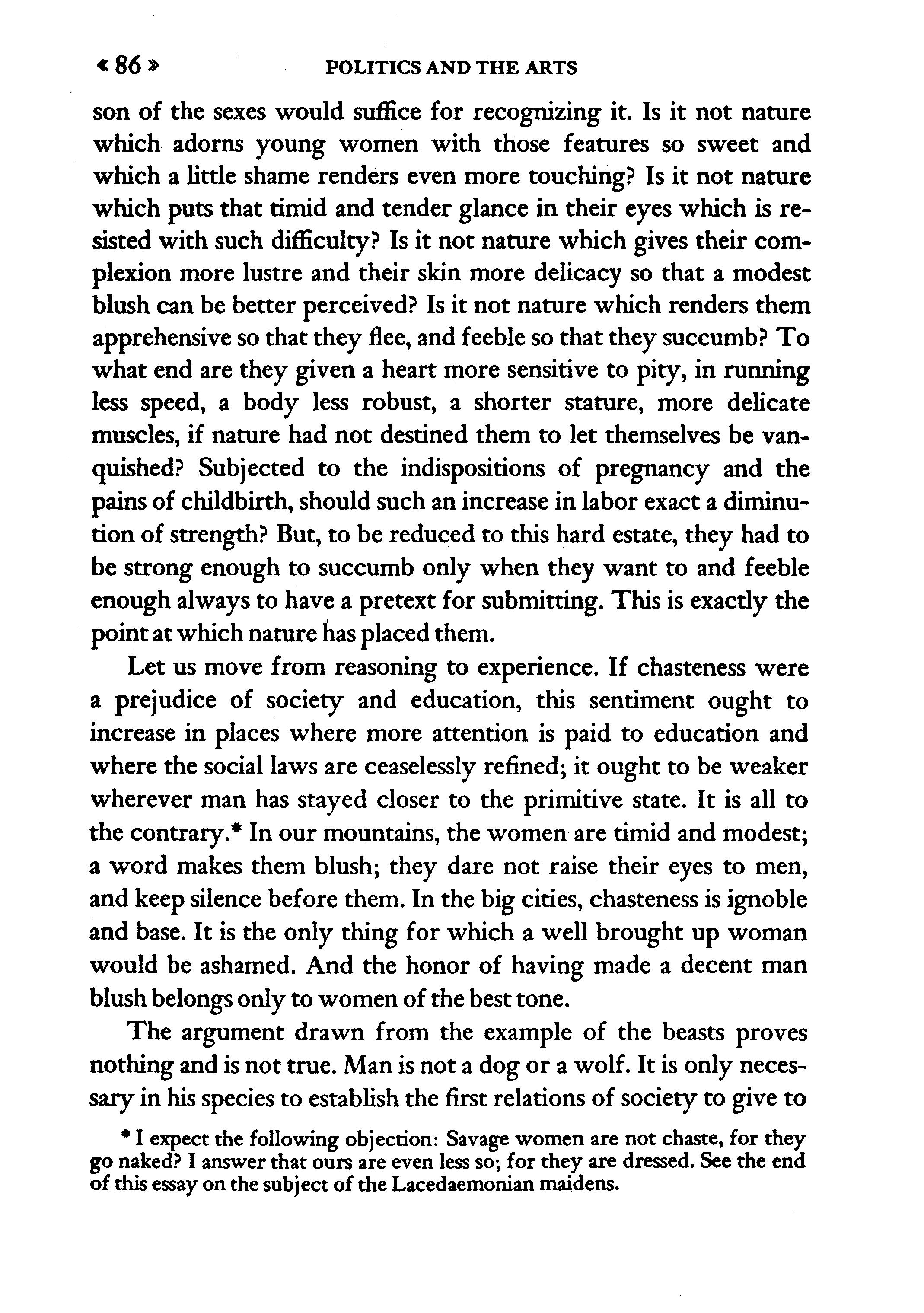
•I expect the following objection: Savage women are not chaste, for they go naked? I answer that ours are even less so; for they are dressed. See the end ofthis essayon the subject ofthe Lacedaemonian maidens.
his sentiments a morality unknown to beasts. The animals have a heart and passions; but the holy image of the decent and the fait entersonlythe heartofman.
Inspite ofthis, wherewas itlearned that instinct never produces effects in animals similar to those that shame produces in men? I see proofs to the contrary every day. I see some animals hide themselves when satisfying certain needs, in order to keep a disagreeable object from the senses; I see them, instead of fleeing, eager to cover the vestiges afterwards. What is needed for these efforts to have an air of propriety and decency other than that they be taken by men? In their loves I see caprices, choices, and concerted refusals which come very close to following the maxim of exciting the passions by obstacles. At the very instant I write this, I have before my eyes an example which confirms it. Two young pigeons in the happy time of their first loves provide me with a picture very different from the stupid brutality ascribed to them by our supposed wise men. The white female goes following her beloved step by step and takes flight herself as soon as he turns around. Does he remain inactive? Light pecks with the bill wake him up; if he retires, he is pursued; if he protects himself, a little flight of six steps attracts him again. Nature's innocence arranges the provocations and the feeble resistance with an art which the most skillful coquette could hardly attain. No, the playful Galatea did not do better, and Virgil could have drawn one of his most charming imagesfrom apigeonhouse.
Even if it could be denied that a special sentiment of chasteness was natural to women, would it be any the less true that in society their lot oughtto be a domestic and retired life, and that they ought to be raised in principles appropriate to it? If the timidity, chasteness, and modesty which are proper to them are social inventions, it is in society's interest that women acquire these qualities; they must be cultivated in women, and any woman who disdains them offends good morals [manners]. Is there a sight in the world so touching, so respectable, as that of a mother surrounded by her
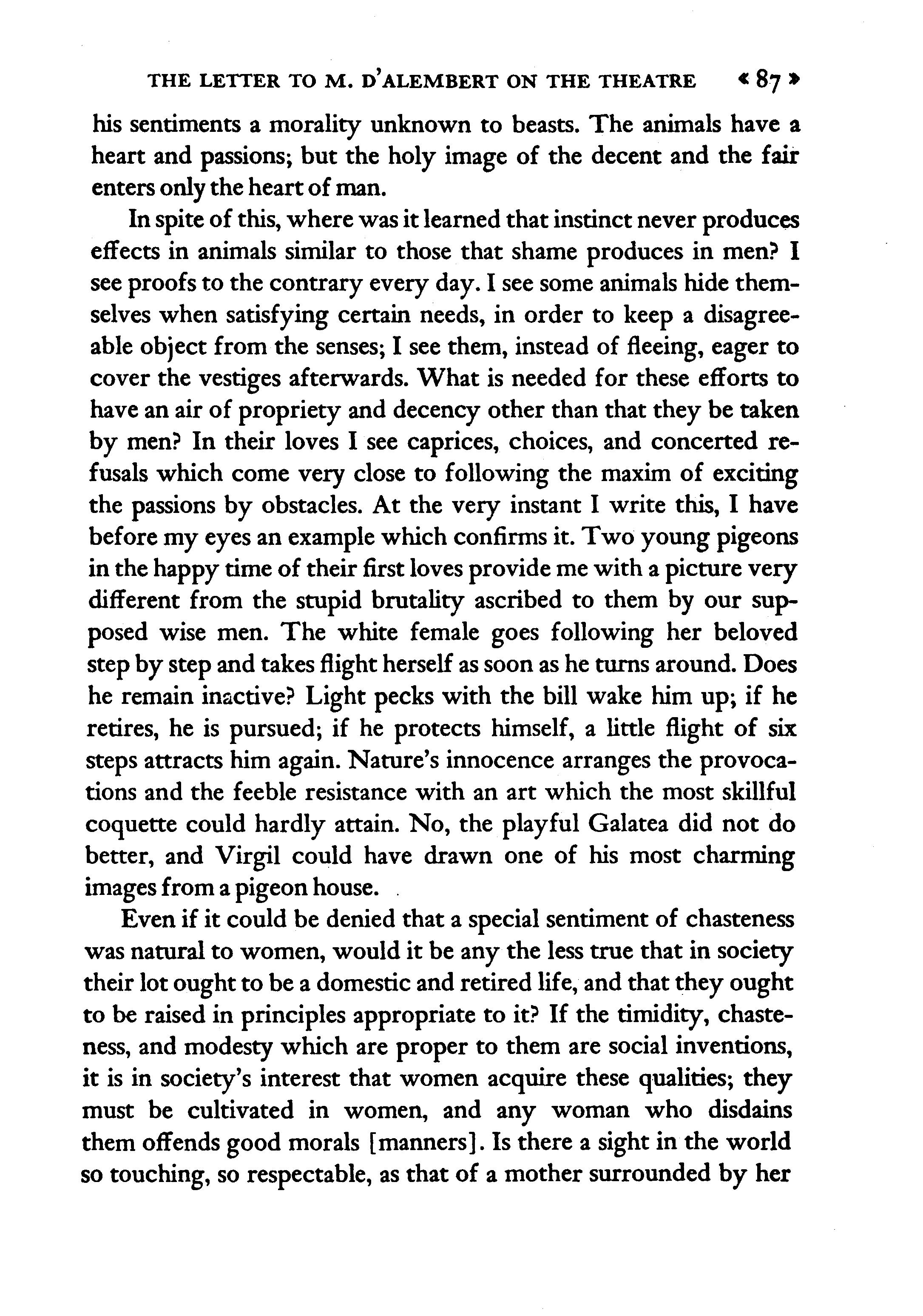
children, directing the work of her domestics, procuring a happy life for her husband and prudently governing the home? It is here that she shows herself in all the dignity of a decent woman; it is here that she really commands respect, and beauty shares with honor the homages rendered to virtue. A home whose mistress is absent is a body without a soul which soon falls into corruption; a woman outside of her home loses her greatest luster, and, despoiled of her real ornaments, she displays herself indecently. If she has a husband, what is she seeking among men? If she does not, how can she expose herself to putting off, by an immodest bearing, he who might be tempted to become her husband? Whatever she may do, one feels that in public she is not in her place; and her very beauty, which pleases without attracting,·isonly one more fault for which the heart reproaches her. Whether this impression comes to us from nature or education, it is common to all the peoples of the world; everywhere, women are esteemed in proportion to their modesty; everywhere, there is the conviction that in neglecting the ways of their sex they neglectits duties; everywhere, itis seen that, when they take on the masculine and firm assurance of the man and turn it into effrontery, they abase themselves by this odious imitation and dishonor both their sex and ours.
I know that in some countries contrary customs prevail. But look at the sort of morals [manners] to which they have given rise. I need no other example to confirm my maxims. Let us apply to the morals [manners] of women what I said above concerning the honorwith which they are treated. Among all the ancient civilized peoples they led very retired lives; they appeared rarely in public; never with men, they did not go walking with them; they did not have the best places at the theatre; they did not put themselves on display;· they were not even always permitted to go; and it is well
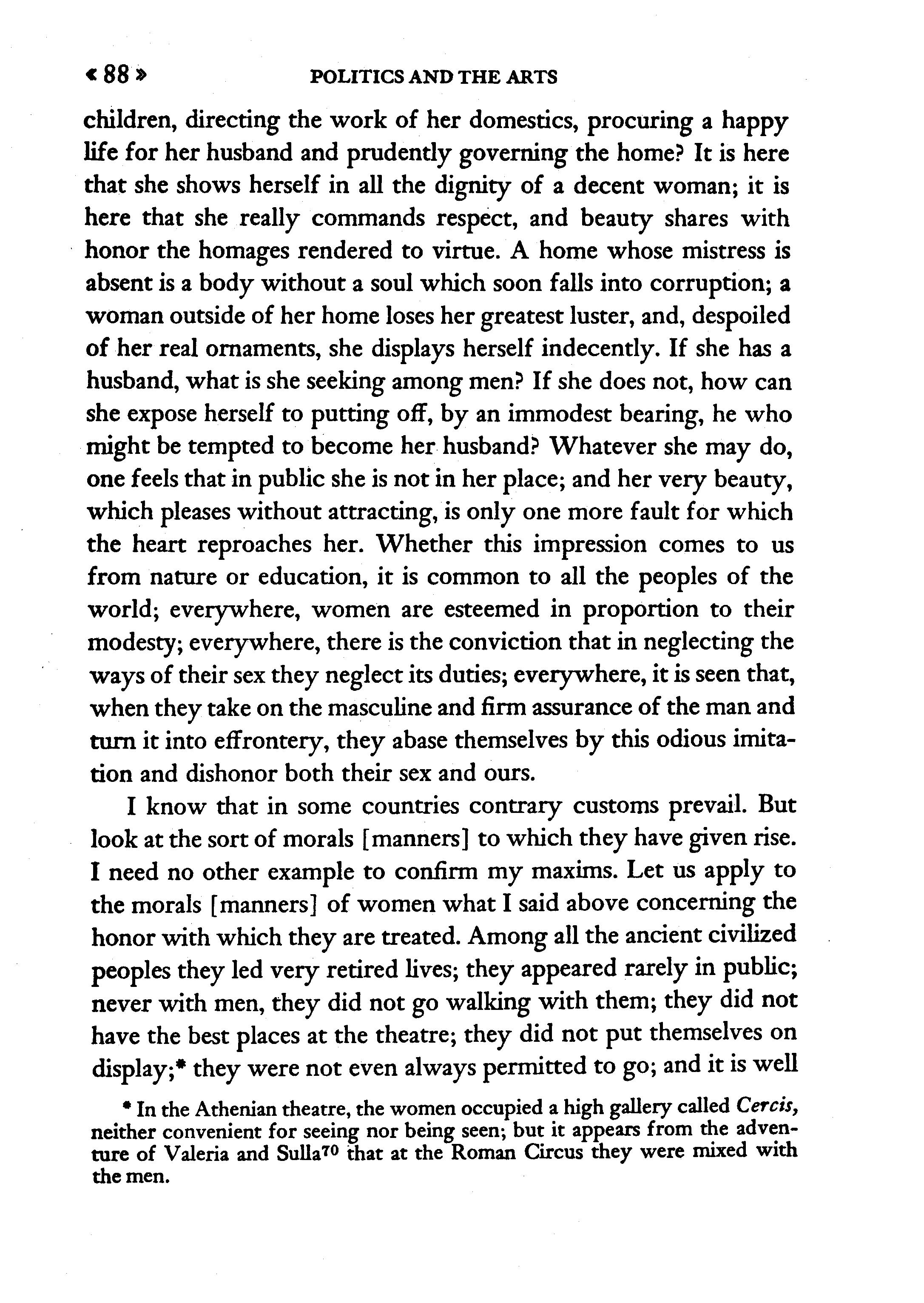
• In the Athenian theatre, the women occupied a high gallery called Cercis, neither convenient for seeing nor being seen; but it appears from the ture of Valeria and Sulla70 that at the Roman Circus they were mixed WIth the men.
known that there was a death penalty for those who dared to show themselves at the·Olympic games.
In the home, they had a private apartment where the men never entered. When their husbands entertained for dinner, they rarely presented themselves at the table; the decent women went out before the end of the meal, and the others never appeared at the beginning. There was no common place of assembly for the two sexes; they did not passthe day together. This effort not to become sated with one another made their meetings more pleasant. It is certain that domestic peace was, in general, better established and that greater hannony prevailed between man and wife- than is thecasetoday.
Suchwerethe practicesofthe Persians, the Greeks, the Romans, and even the Egyptians, in spite of Herodotus' bad jokes which refute themselves.71 If, on occasion, women stepped out of the bounds of this modesty, the public outcry showed that this was an exception. What has not been said about the liberty of the fair sex at Sparta? It can also be seen in the Lysistrata of Aristophanes how shocking the impudence of the Athenian women was in the eyes of the Greeks; and, at Rome, already corrupted, with what scandal were the Roman ladies viewed who presented themselves at the tribunalofthetriumvirs!
Everything is changed. Since then, hordes of barbarians, dragging their women with them in their armies, have inundated Europe; the licentiousness of camps, combined with the natural coldness of the northern climates, which makes reserve less necessary, introduced anotherway oflifewhichwas encouraged by thebooks of chivalry, in which beautiful ladies spent their lives in getting themselves honorably and decently kidnapped by men. Since these books were the schools of gallantry of the time, the libertine ideas that they inspire were introduced, especially at the courts and in
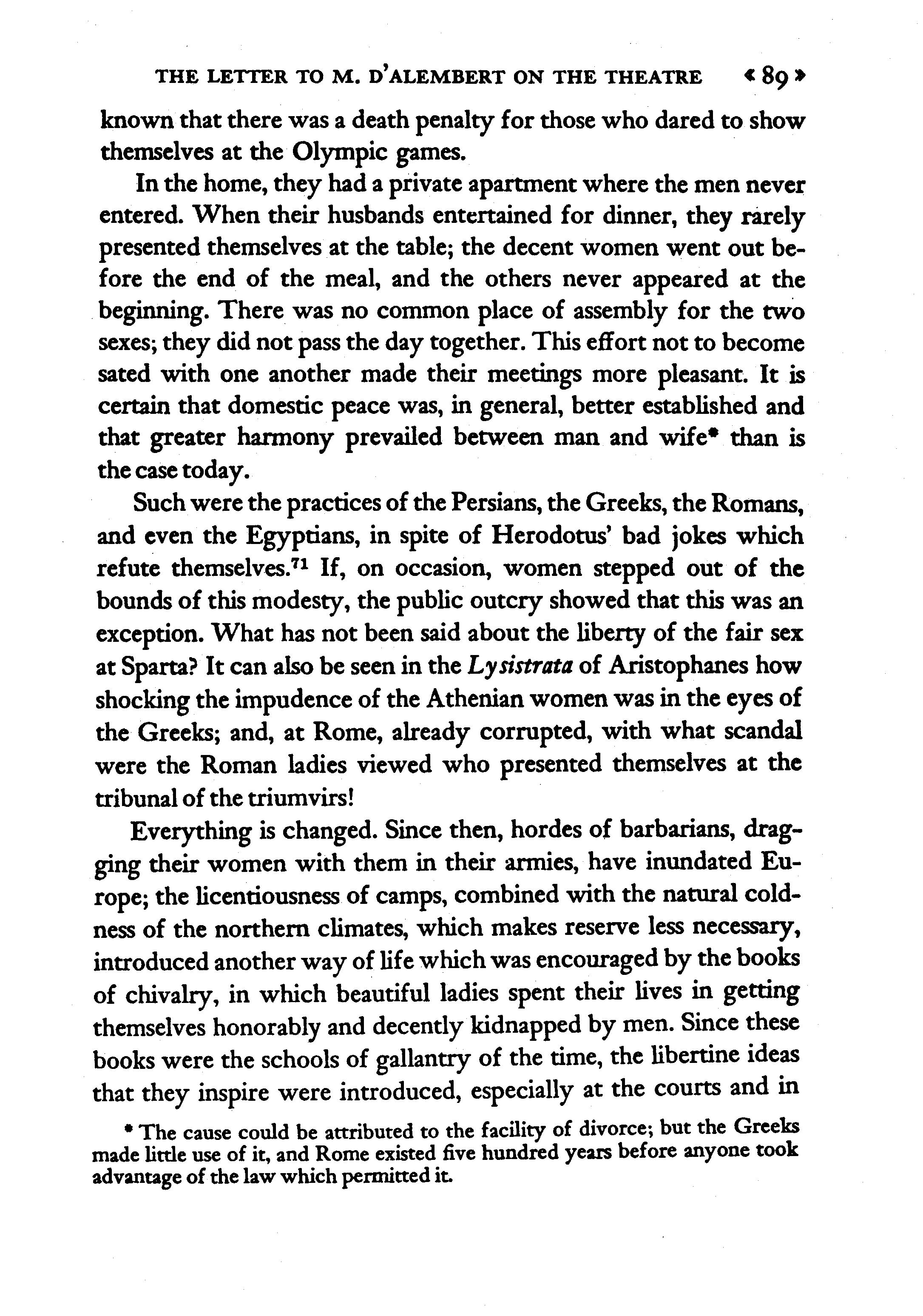
• The cause could be attributed to the facility of divorce; but the Greeks made little use of it, and Rome existed five hundred years before anyone took advantage ofthe lawwhich permittedit.
the big cities where people pride themselves rather more on their refinement; by the very progress of this refinement, it had to degenerate finally into coarseness. It is thus that the modesty natural to women has little by little disappeared and that the manners [morals] of sutlers have been transmitted to women of quality.
But, do you want to know how shocking these practices, contrary to natural ideas, are for those who have not the habit of them? You can judge from the surprise and distress of foreigners and people from the provinces at the sight of these ways so new for them. This distress constitutes a praise of the women of their country, and it is to be believed that those who cause it would be less proud of it if its source were better known to them. It is not that this impresses, but rather that it embarrasses, and that chasteness, banished by the woman from her speech and her bearing, takes refugeinthe heartoftheman.
To return now to our actresses, I ask how an estate, the unique object of which is to show oneself off to the public and, what is worse, for money, could agree with decent women and be compatible with modesty and good morals [manners]? Is there even need to dispute about the moral differences between the sexes to feel how unlikely it is that she who sets herself for sale in performance would not soon do the same in person and never let herself be tempted to satisfy desires that she takes so much effort to excite? What! In spite of countless timid precautions, a decent and prudent woman, exposed to the leastdanger, has neverthelessgreatdifficulty in keeping a faithful heart; and these audacious young persons, with no education other than in a system of coquetterie and amorous roles, immodestly dressed,· constantly surrounded by ardent and daring youth, in the midst of the sweet voices of love and pleasure-these young persons, I say, will resist their age, their heart, the objects that surround them, the speeches addressed to them, the ever recurring opportunities, and the gold for which
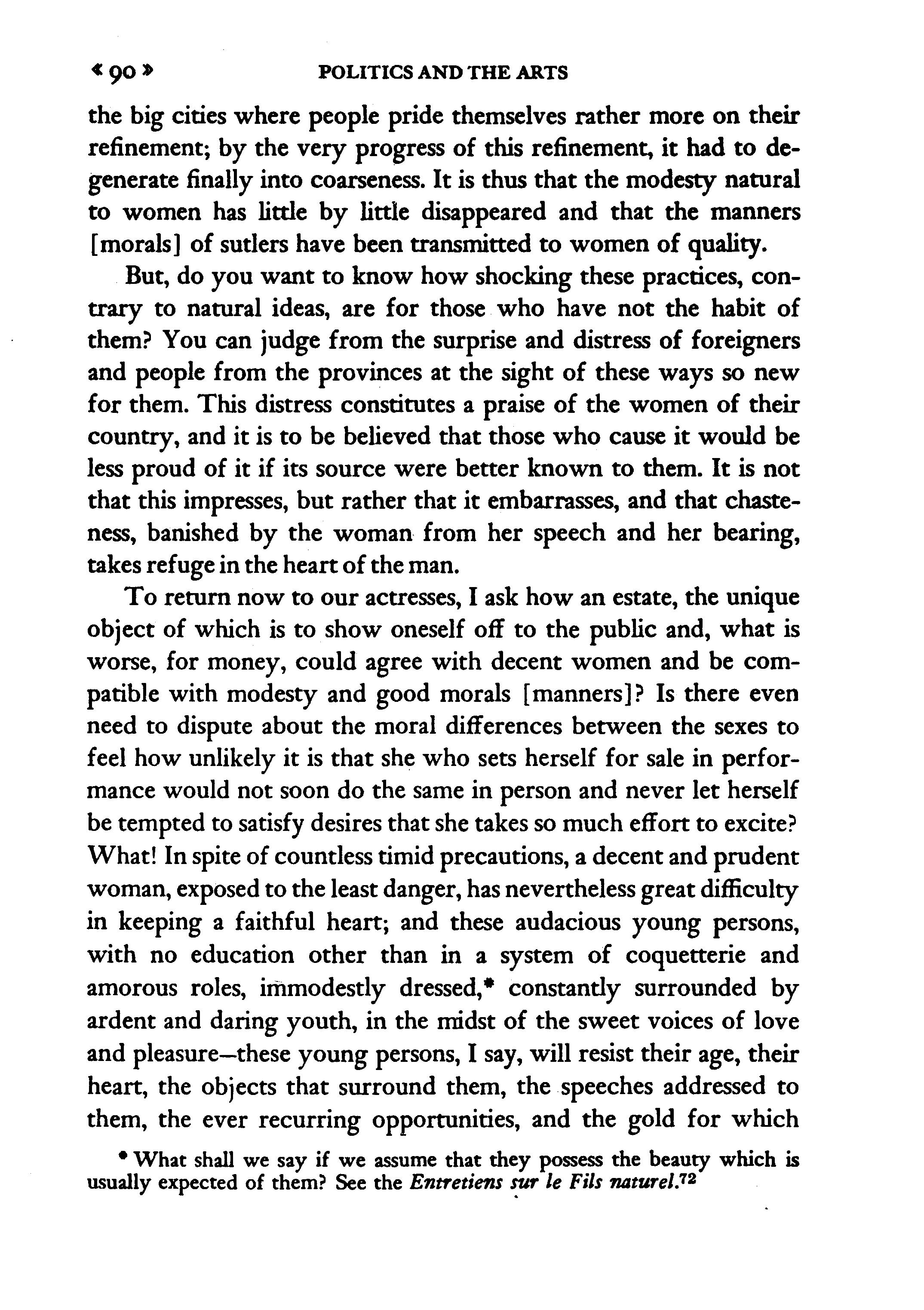
• What shall we say if we assume that they possess the beauty which is usually expected of them? See the Entretiens S?r Ie Fils 1latuTel.72
they are beforehand half sold! We would have to be believed to possess a childlike simplicity for someone to want to impose on us to this extent. Vice in vain hides itself in obscurity; its imprint is on the guilty faces. A woman's audacity is the sure sign of her shame; it is for having too much cause to blush that she blushes no more; and, if chasteness sometimes outlives purity, what must one think about purity when chasteness itself is extinguished?
Letusassume, ifyouwish, thatthere have beensome exceptions; letusassmue:
that there are as many as three whom one could ntrme.73 I am prepared to believe what I have never seen nor head said. But shall we call a profession decent in which a decent woman is a prodigy and which leads us to despise those who exercise it unless we count on a constant miracle? Immodesty conforms so well to their estate and they are so well aware of it themselves that there is not one who would not think herself ridiculous even in feigning to take for her own the discourses of prudence and honor that she retails to the public. For fear that these severe maxims might make a progress injurious to her interests, the actress is always the first to parody her role and destroy her own work. As soon as she reaches the wings, she divests herself of the morality of the theatre as well as of her dignity; and if lessons of virtue are learned on the stage, they are quickly forgotten in the dressing rooms.
After what I have just said, I believe I need not explain further how the dissoluteness of the actresses leads to that of the actors; especially in a profession which forces them to live in the greatest familiarity with each other. I need not show how, from an estate which dishonors, indecent sentiments arise, nor how the vices divide those whom common interest ought to unite. I shall not expand onthe countlesssubjects for discord and quarrels which the distributionofroles, the division ofthe receipts, the choice of plays, and the jealousy over applause must constantly excite, principally
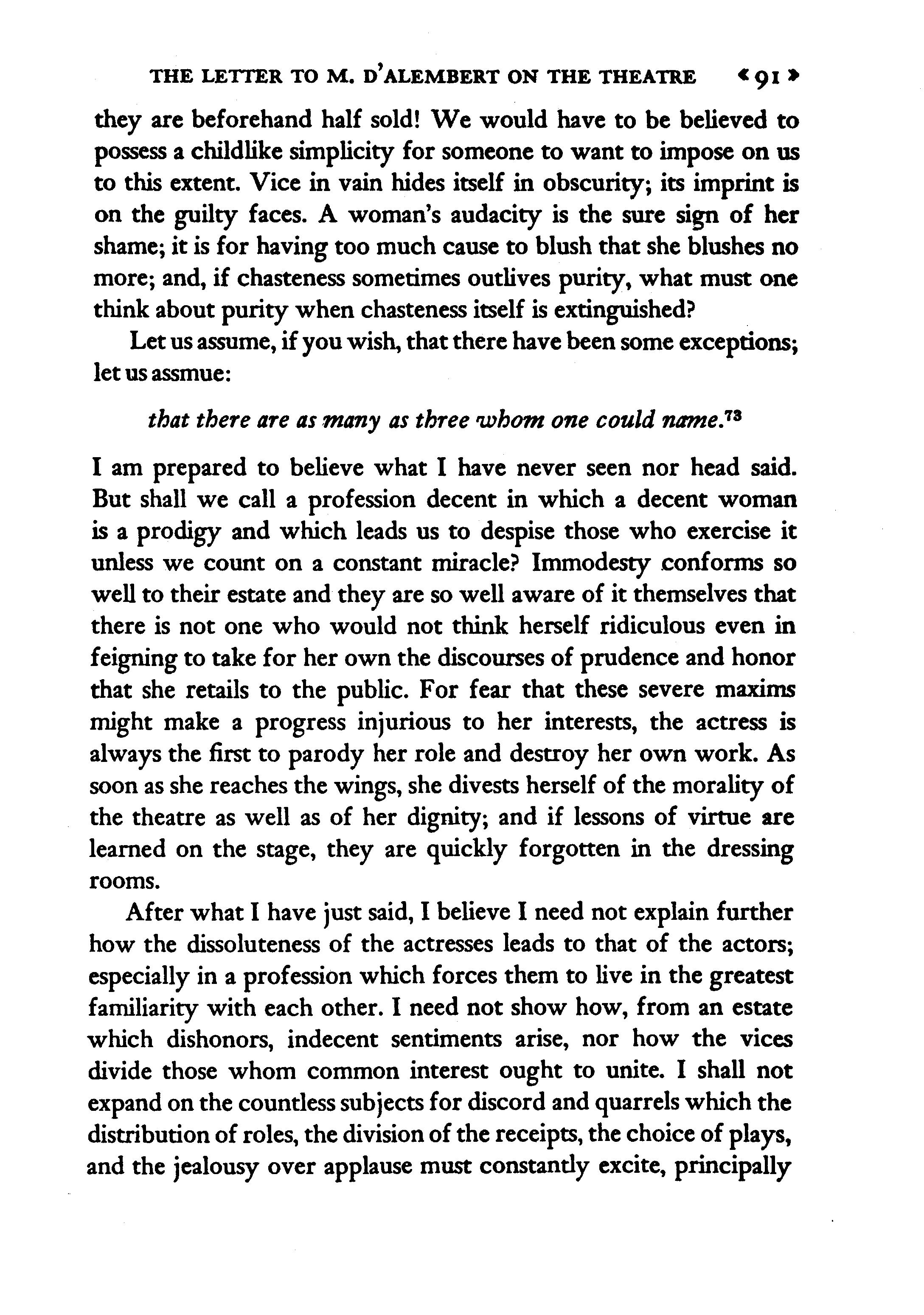
among the actresses, not to speak of the intrigues of gallantry. It is even more useless that I set forth the effects that the association of luxury and misery, inevitable among this sort of person, must naturally produce. I have already said too much for you and for reasonable men; I could never say enough for the predisposed who do not want to see what reason shows them but only what accords withtheirpassionsortheirprejudices.
Ifall this is bound up with the actor's profession, what shall we do, Sir, to prevent its inevitable effects? As for me, I see only one way; itis toremove the cause. When the ills of.a man come to him from his natureoracertainway oflife which he cannot change, do the doctors try to prevent them? To forbid an actor to be vicious istoforbid themantobesick.
Does itfollow from this that we must despise all actors? On the contrary, it follows that an actor who is modest, decent, and has morals [manners] is, as you have said so well, doubly estimable, since he shows thereby that his love of virtue wins out over the passions of man and the ascendency of his profession. The only fault that can be imputed to him is to have chosen it in the first place; but, too often, a youthful error decides(life's destiny; and when a man feels a real talent in himself, can he resist its appeal? The great actors carry their excuse with them; it is the bad ones whooughtto be despised.
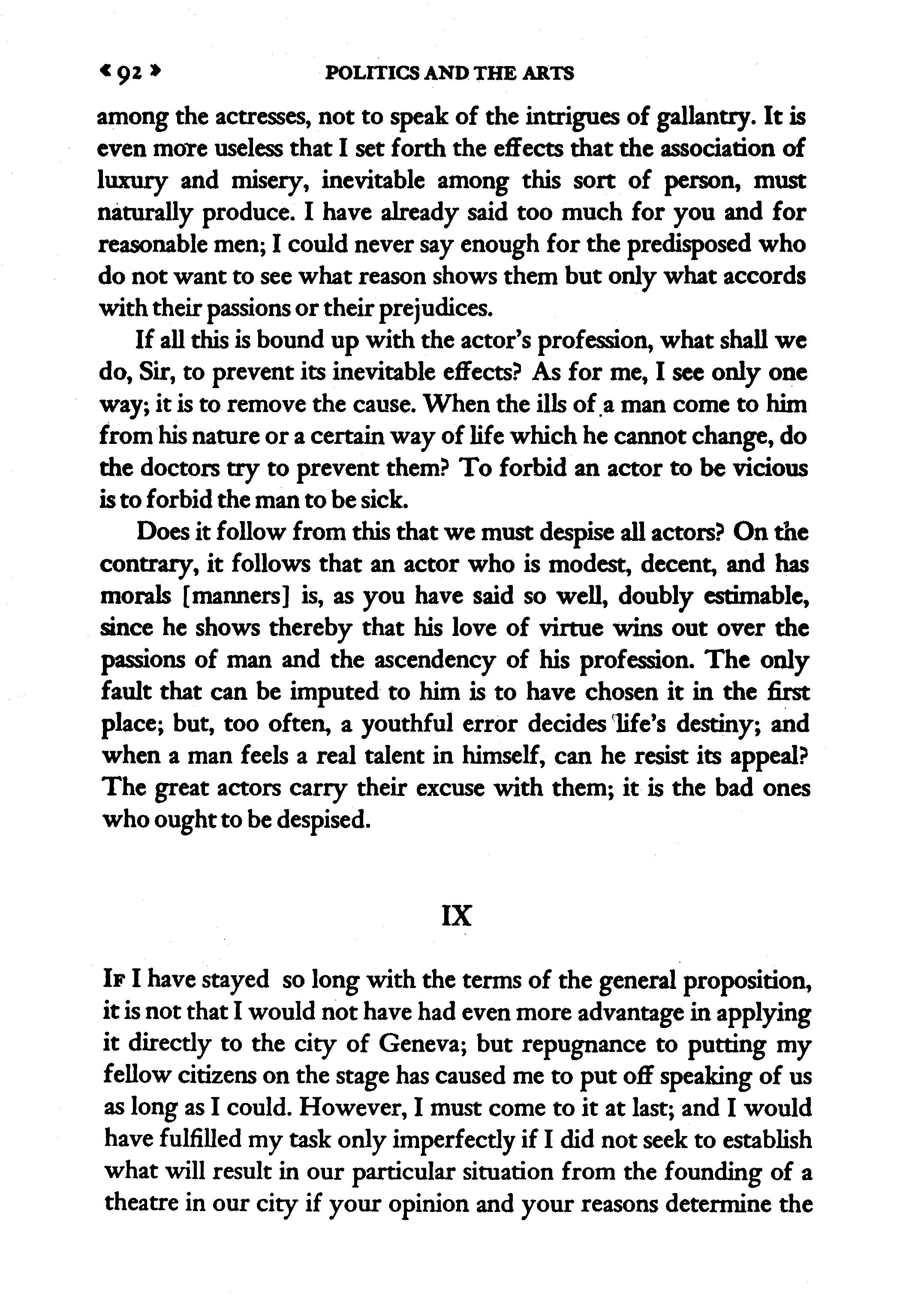
IX
IF I have stayed so long with the terms of the general proposition, itis not that I would not have had evenmore advantage inapplying it directly to the city of Geneva; but repugnance to putting my fellow citizens on the stage has caused me to put off speaking of us as long as I could. However, I must come to it at last; and I would have fulfilled my task only imperfectly if I did not seek to establish what will result in our particular situation from the founding of a theatre in our city if your opinion and your reasons determine the
government to tolerate one there. I shall limit myself to effects so evident that they could not be contested by anyone who knows a bitaboutourconstitution.
Geneva is rich, it is true; but although those enormous disproportions offortune, whichimpoverish awhole land to enrich a few inhabitants and sow misery around opulence, are not to be seen there, it is certain that, if some Genevans possess a rather large property, many live in relatively harsh poverty and that the easy circumstances of the majority come from hard work, economy, and moderation rather than positive wealth. There are many cities poorer than OUf own in which the citizen can give much more to his pleasures because the land which feeds him is never worn out, and, since his time is of no value, he can waste it without loss. It is not so with us, who, without lands to subsist by, have only our industry. The people of Geneva supports itself only by dint of labor and has what is necessary only insofar as it denies itself every excess; this is one of the reasons for our sumptuary laws. It seems to me that what ought first to strike every foreigner coming to Geneva is the air of life and activity which prevails there. Everyone is busy, everyone is moving, everyone is about his work and his affairs. I do not believe that any other city so small in the world presents such a spectacle. Visit the St. Gervais Quarter. All the watchmaking of Europe seems centered there. Go through the Molard and the low streets; there, an organization for commerce on a large scale, stacks of boxes, barrels scattered at random, an odor of the orient and of spices, make you think you are in a seaport. At Paquis and Eaux-Vives the sight and sound of the printed calico and linen mills seems to transport you to Zurich. The city appears, as it were, multiplied by the labors which take place in it; and I have seen people who, at first glance, estimate the population at a hundred thousand souls. Its a: fiS, its use of time, its vigilance, its austere parsimony, are the treasures of Geneva. This is with what we await an amusement of the idle which, in taking from us both time and money, willtruly double ourloss.
Geneva does not have twenty-four thousand inhabitants, you
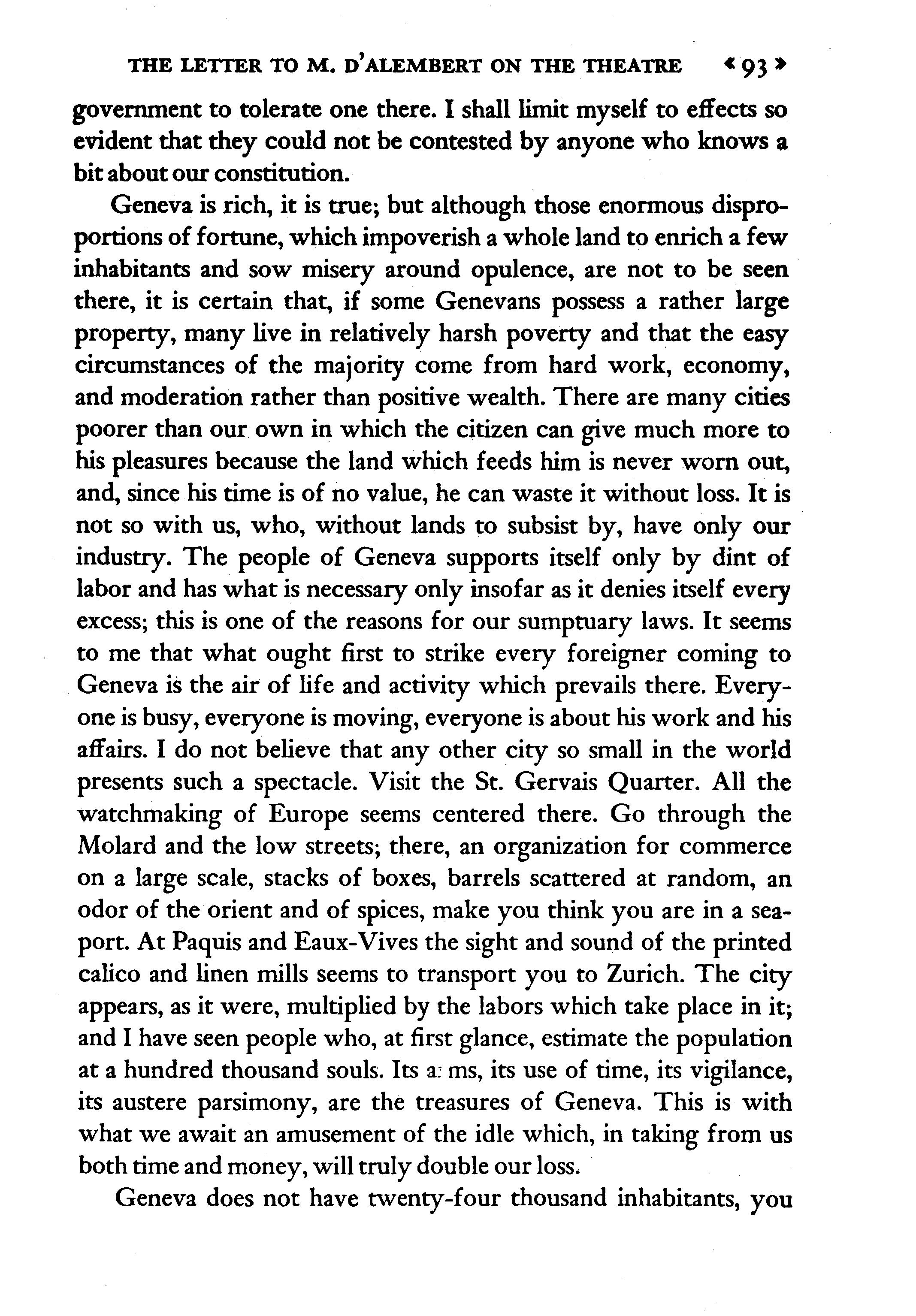
will agree. I see that Lyons, much richer in proportion, and at least five or six times more populous, barely supports a theatre and that, ifthis theatre were an opera, the city would not be adequate to it. I see that Paris, the capital of France and the whirlpool which engulfs the wealth of this great realm, supports three in what is at best a modest fashion, and a fourth at certain seasons of the year. Let us suppose that this fourth- were permanent. I see that with more than six hundred thousand inhabitants, this meeting place of opulence and idleness provides, all things.considered, scarcely one thousand to twelve hundred spectators daily. In the rest of the realm, I see that Bordeaux, Rouen, large seaports, I see that Lille, Strasbourg, large military centers, full of idle officers who spend their lives waitingfor noon and eight o'clock, have each a dramatic theatre; yet involuntary taxes are needed to support it. But how many other cities incomparably larger than ours, how many seats of both royal and autonomous courts of justice, cannot support a residenttheatre.
In order to judge if we are in a position to do better, let us take a well-known point of comparison, such as, for example, Paris. I say, then, that, if more than six hundred thousand inhabitants provide, altogether, only twelve hundred spectators daily for the Paris theatres, less than twenty-four thousand inhabitants will certainly not provide more than forty-eight at Geneva. Moreover, free tickets must be deducted from this number, and it must be supposed that there are not proportionally fewer unoccupied people at Geneva than at Paris, a supposition that seems to me indefensible.
Now, if the actors of the French theatre, pensioned by the king and proprietors of their own theatre, have great difficulty in
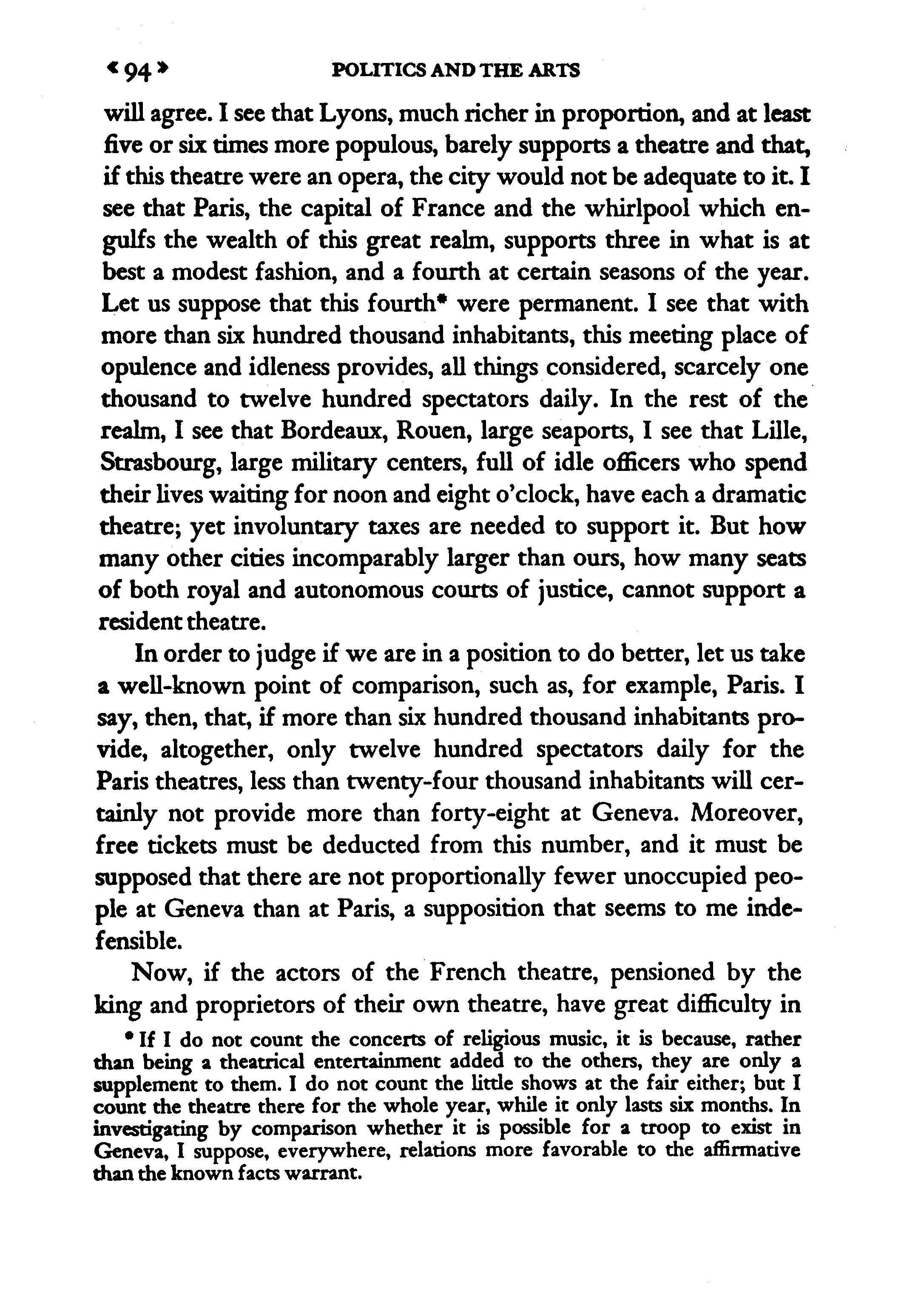
• If I do not count the concerts of religious music, it is because, rather than being a theatrical entertainment added to the others, they are only a supplement to them. I do not count the little shows at the fair either; but I count the theatre there for the whole year, while it only lasts six months. In investigating by comparison whether it is possible for a troop to exist in Geneva, I suppose, everywhere, relations more favorable to the affirmative than the known facts warrant.
supporting themselves at Paris with an audience of three hundred spectators per performance,· I ask how the actors of Geneva will support themselves with an audience of forty-eight spectators for their entire resource? You will tell me that life is cheaper in Geneva than in Paris. Yes, but the tickets will cost proportionately less; and then, board is nothing for actors. It is costumes and jewelry which cost. All this must be sent for from Paris or maladroit workers must be trained. It is in places where all these things are common that they are most cheaply made. You will say that they will be subjected to our sumptuary laws. But we would wish in vain to bring reform to the theatre; never will Cleopatra or Xerxes have a taste for our simplicity. Since the business of actors is to appear, it is to deprive them of the taste for their craft to prevent them from appearing; and I doubt if ever a good actor would consent to becoming a Quaker. Finally, it can be objected that the Geneva troop, since it will be considerably less numerous than that of Paris, will be able to subsist at considerably less cost. Agreed; but will this difference be in the proportion of 48 to 30o? Add that a more numerous company has also the advantage of being able.to play more often, while in a little company, which lacks understudies, not everyone can play every day; the illness or the absence of a single actor causes a performance to be missed, and this means that muchlostfor the receipts.
The Genevans are excessively fond of the country; this can be judged by the number of homes scattered out around the city. The charm of the hunt and the beauty of the surroundings nourish this salutary taste. The gates, closed before nightfall, deprive one of the liberty of taking walks outside; and, since the country homes are so near, very few well-to-do people sleep in town during the summer. Each, having spent the day at his business, leaves at
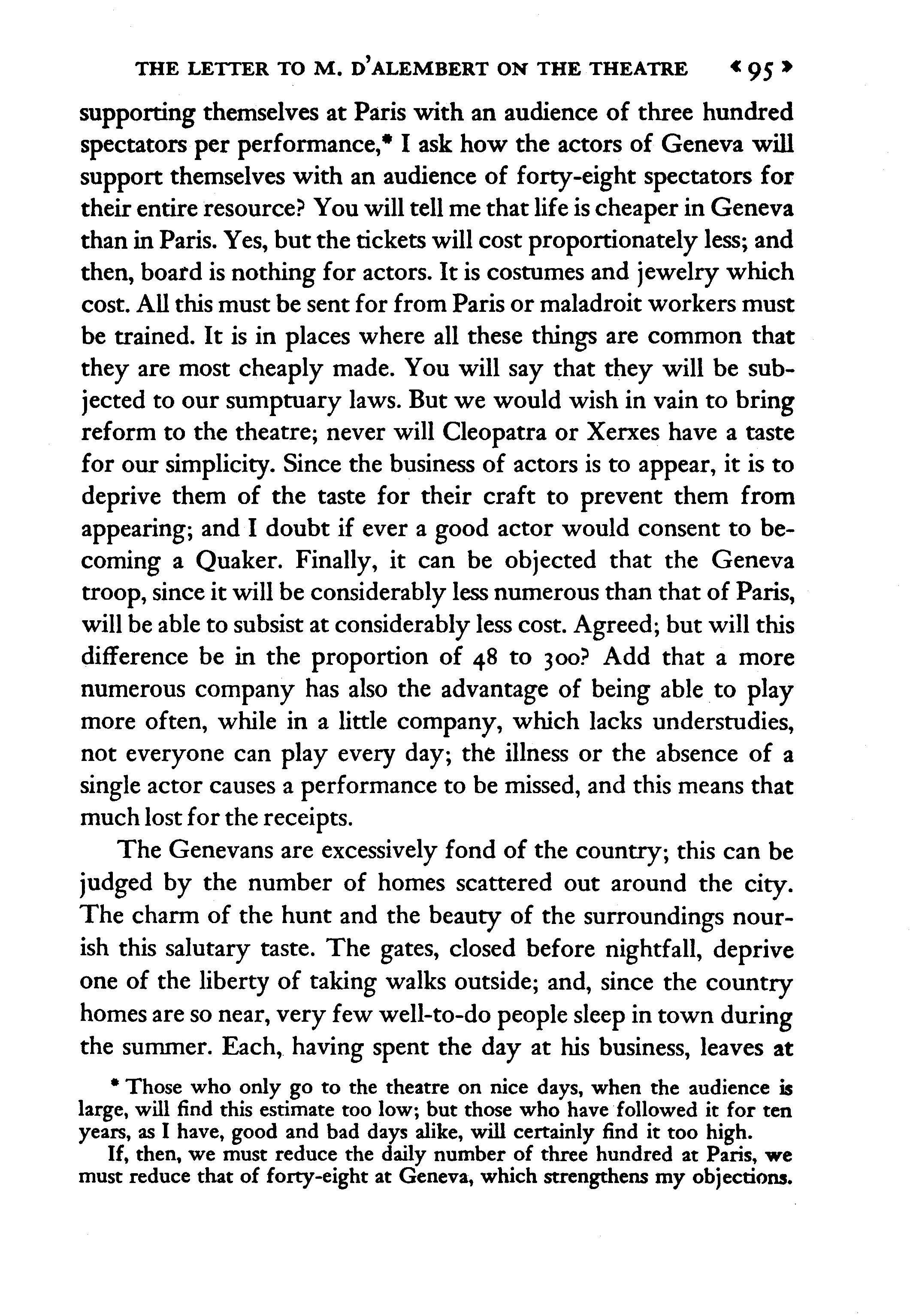
• Those who only go to the theatre on nice days, when the audience is large, will find this estimate too low; but those who have followed it for ten years, as I have, good and bad days alike, will certainly find it too high.
If, then, we must reduce the daily number of three hundred at Paris, we must reduce that of forty-eight at Geneva, which strengthens my objections.
the closing of the gates in the evening and goes to his little retreat to breathe the purer air and enjoy the most charming countryside on earth. There are even many citizens andtownsmen who reside there the whole year and have no dwelling in Geneva. All of this is so much lost to the theatre; and, during the entire season of good weather, almost the only ones remaining to support it will be people who never go. In Paris it is an entirely different thing; there one cancombinethe theatre and the countryquitewell; and, during the whole·summer, you see nothing but carriages leaving the gates of the city at the hour when the theatre is over. As to the people who sleepintown, the liberty ofgoing out atany time tempts them less than the inconveniences which accompany it repel them. One gets bored so quickly with the public walks, one must go so far to find the country, its air is so infected with filth, and the prospect is so unattractive, that it is preferable to go and close oneself up in the theatre. Here is another difference to the disadvantage of our actors, and a half of the year lost for them. Do you think, Sir, that they will easily find in the remainder enough to fill up such a large void? As for me, I see no other remedy than that of changing the hour at which the gates are closed, of sacrificing our security to our pleasures and leaving a fortress open nights,· in the midst of three powers of which the furthest removed has to go only half a leagueto comeupto ourglacis.
This is not all; it is impossible that an establishment so contrary to ourancient maxims be generally applauded. How many generous citizens will look on with indignation at this monument of luxury and softness being elevated on the ruins of our antique simplicity and threatening from afar the public liberty? Do you think that
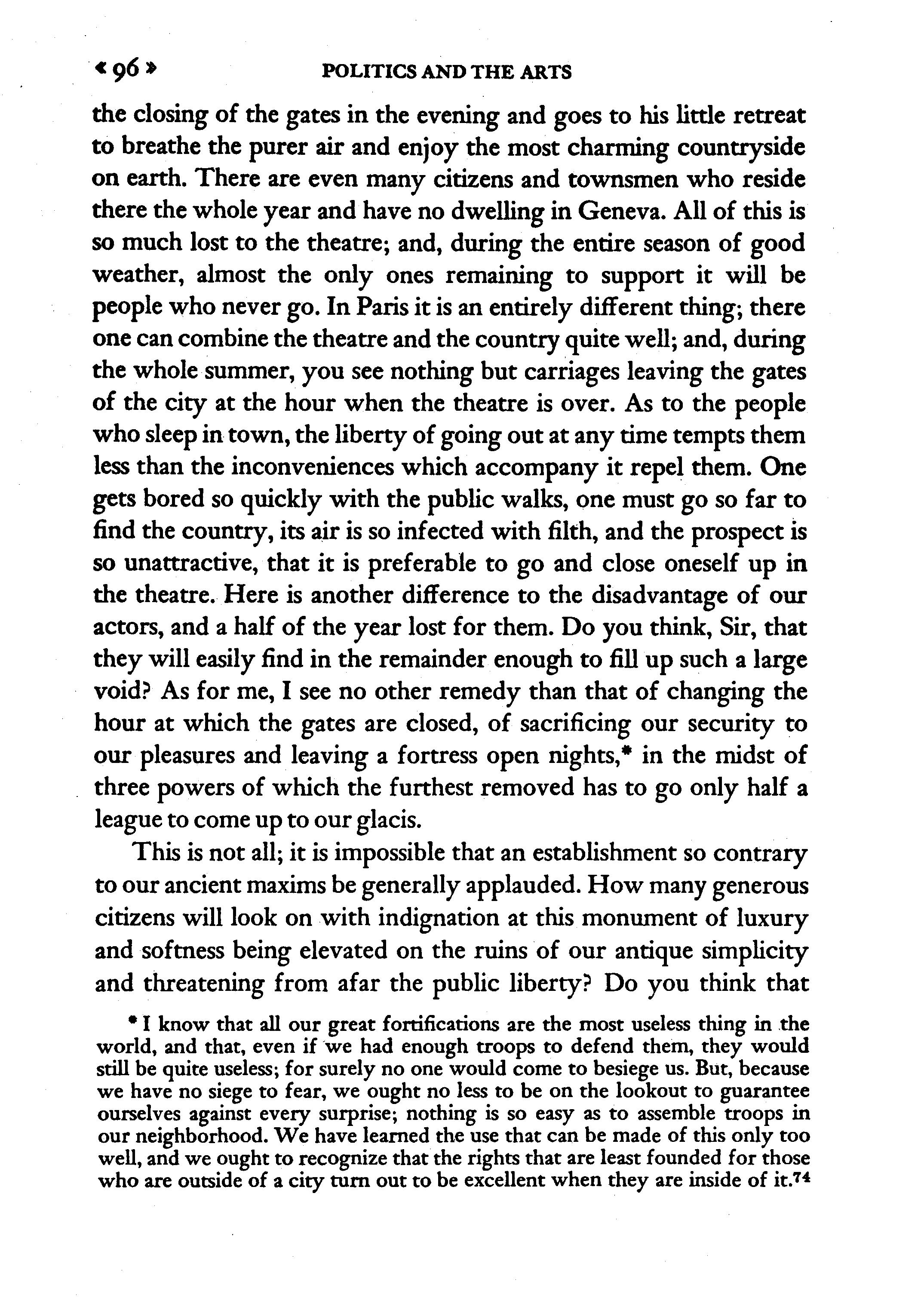
•I know that all our great fortifications are the most useless thing in the world, and that, even if we had enough troops to defend them, they would still be quite useless; for surely no one would come to besiege us. But, because we have no siege to fear, we ought no less to be on the lookout to guarantee ourselves against every surprise; nothing is so easy as to assemble troops in our neighborhood. We have learned the use that can be made of this only too well, and we ought to recognize that the rights that are least founded for those who are outside of a city tum out to be excellent when they are inside of it.74
they will go to. lend their authority to this innovation by their presence after having openly disapproved of it? Be certain that many go to the theatre in Paris without scruple who will never set foot in it in Geneva because the good of their country is dearer to them than their amusement. Where will the imprudent mother be who will dare to take her daughter to this dangerous school? And how many respectable women will think that they are disgracing themselvesin going? Ifin Paris some persons abstain from going to the theatre, it is solely from religious principle, which will surely be no less strong among us; and we will have more motives of morals [manners], of virtue, and of patriotism which will restrain eventhosewhomreligionwould not.·
I have shown that itis absolutely impossible to support a theatre at Geneva with the sole participation of the spectators. One of two things is necessary then: either the rich must subscribe to support it, a heavy burden which they will surely not be disposed to bear for a long time; or the state must involve itself and support the theatre at its own expense. But how will the state support the theatre? If it be by cutting back on the necessary expenses, for which its modest revenue barely suffices, with what will these be provided? Or, for this important use, will it destine the sums which economy and the integrity of the administration sometimes permit to be putin reserve for the most pressingneeds? Must we discharge our little garrison and guard our gates ourselves? Must we reduce the slender honoraria of our magistrates, or shall we deprive ourselves for this purpose of every resource for the least unforeseen accident? Without these expedients, I see only one which is practicable; that is the way of taxes and assessments, which means to assemble our citizens and townsmen in general. council in the
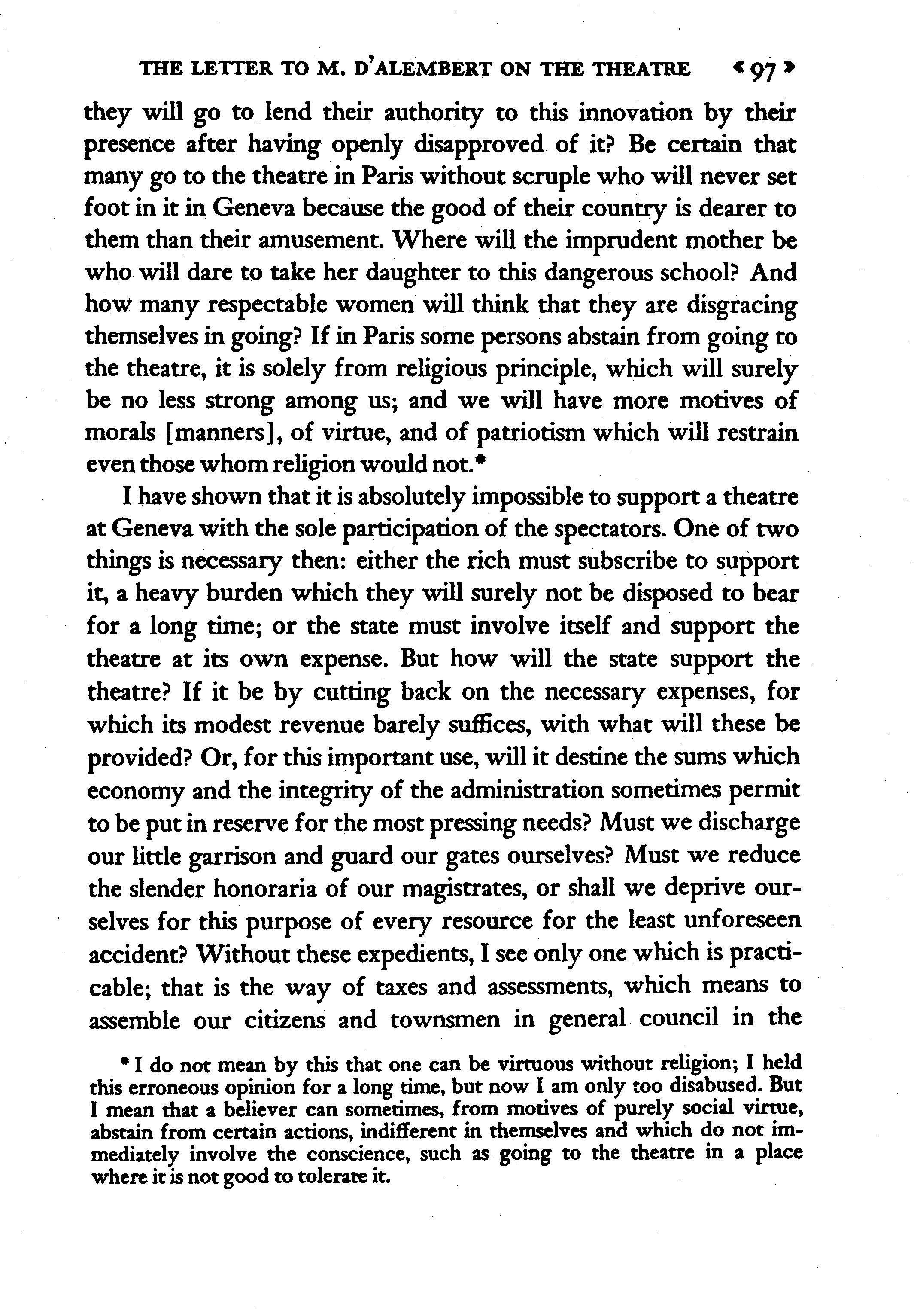
•I do not mean by this that one can be virtuous without religion; I held this erroneous opinion for a long time, but now I am only too disabused. But I mean that a believer can sometimes, from motives of purely social virtue, abstain from certain actions, indifferent in themselves and which do not immediately involve the conscience, such as going to the theatre in a place where itis not good to tolerate it.
temple of St. Pierre and there solemnly to propose that a tax be accorded for the establishment of the theatre.1G God forbid that I should believe our wise and worthy magistrates capable of ever making such a proposal; and from your own article one can judge howitwouldbereceived.
Ifwe had the misfortune of finding some expedient adequate to overcomingthese difficulties, it would be so much the worse for us; for that could come to pass only by means of some secret vice which, in weakening us stillmore in our smallness, would sooner or later destroy us. Let us suppose, nevertheless, that a noble zeal for the theatre accomplished a miracle of this order; let us suppose the actors well established in Geneva, well controlled by our laws, the drama flourishing and frequented. Finally, let us suppose that our city has attained the situation ofwhich you speak, that is, with both theatre and morals [manners] it would combine the advantages of both, advantages, moreover, which are, as far as I can see, hardly compatible, since the advantage of the theatre, which is to supplement morals [manners], is of no account where morals [manners] exist.
The first noticeable effect of this establishment will be, as I have already said, a revolution in our practices which will necessarily produce one in our morals [manners]. Will this revolution begoodorbad? Itistimeto examinethis.
There is no well-constituted state in which practices are not to be found which are linked to the form of government and which help to preserve it. The clubs in London were institutions of this sort before they were so unseasonably ridiculed by the authors of the Spectator; to these clubs, thus become ridiculous, have succeeded the coffee houses and the houses of ill fame. I doubt if the English people has gained much in the exchange. Similar clubs are now established in Geneva under the name of circles; and I have reason, Sir, to judge from your article that you did not observe without esteem the tone of good sense and judgment which they cause to prevail there. This practice is old among us although its
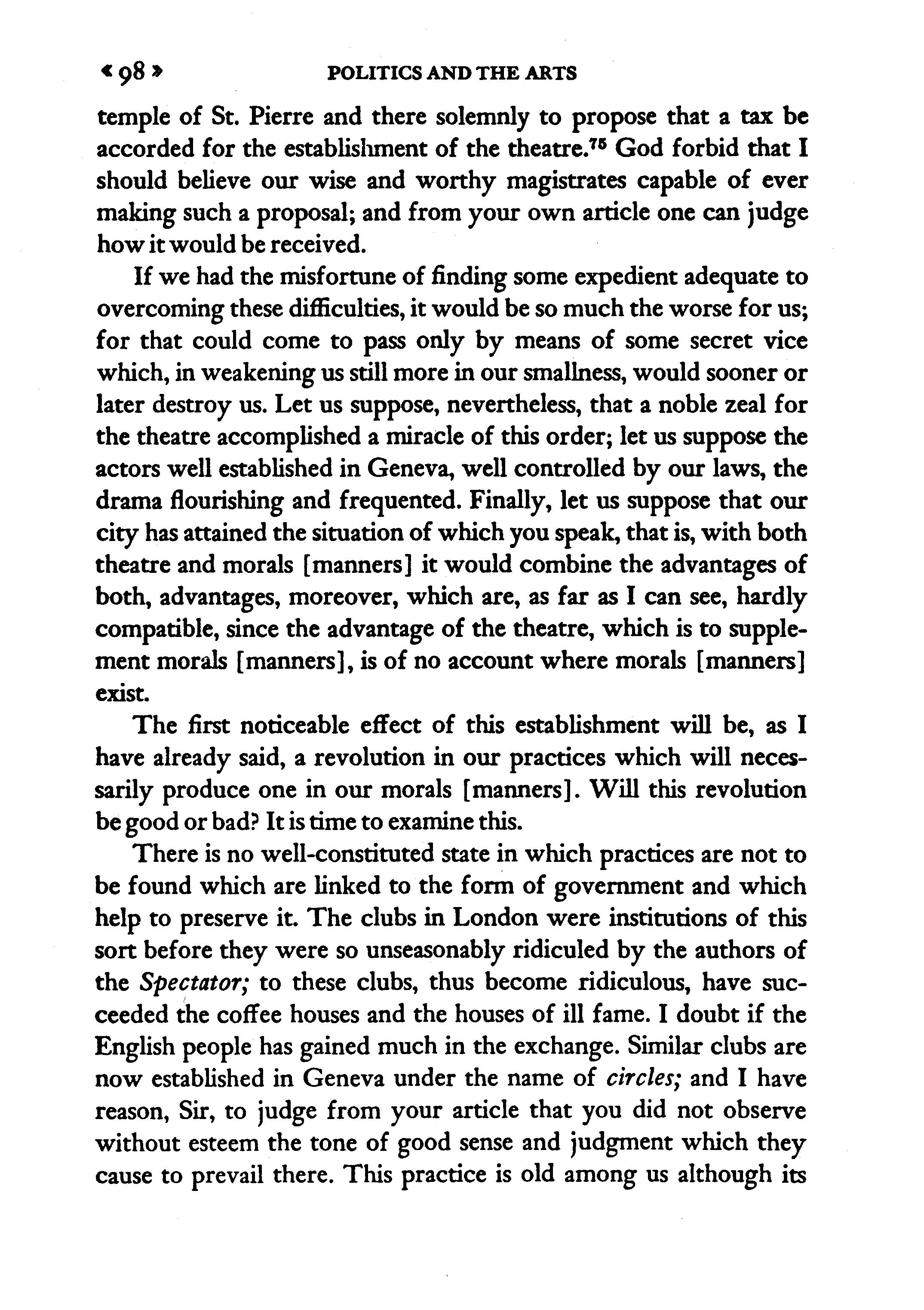
name is not. The clubs existed in my childhood under the name of societies; but their form was not so good nor so regular. The exercise of arms which brings us together every spring, the various prizes which are awarded during one part of the year, the military festivals which these prizesoccasion, the taste for the hunt common to all the Genevans, bringing the men frequently together, gave them the occasion to form among themselves dining societies, country outings and, finally, bonds of friendship. But these assemblies, having for their object only pleasures and joy, were pretty much always formed in taverns. Our civil discords, during which the necessity of affairs obliged us to meet more often and to deliberate coldly and calmly, caused these tumultuous societies to be changed into more decent associations. These associations took the nameof circles and,from averysad cause,issued verygood effects.·
These circles are societies of twelve to fifteen persons who rent comfortable quarters which they provide with furniture and the necessary store at common expense. Every afternoon all the associates whose affairs or pleasures do not retain them elsewhere go to these quarters. They meet and there each gives himself without restraint to the amusements of his taste; they gamble, chat, read, drink and smoke. Sometimes they dine there, but rarely, because the Genevan is a steady sort and likes to live with his family. Also, they often go walking together, and the amusements they provide for themselves are exercises fit to cause and maintain a robust body. The women and the girls, for their part, meet in societies at one another's homes. The object of this meeting is to provide the occasion for a little social card-playing, refreshments, and, as can be imagined, inexhaustible gossiping. The men, without being very severely excluded from these societies, are rather rarely involved in them; and I should think even worse of those who are always to befound therethan ofthosewho neverare.
Such are the daily amusements of the Geneva townsmen. Not unendowed with pleasure and gaiety, these amusements have
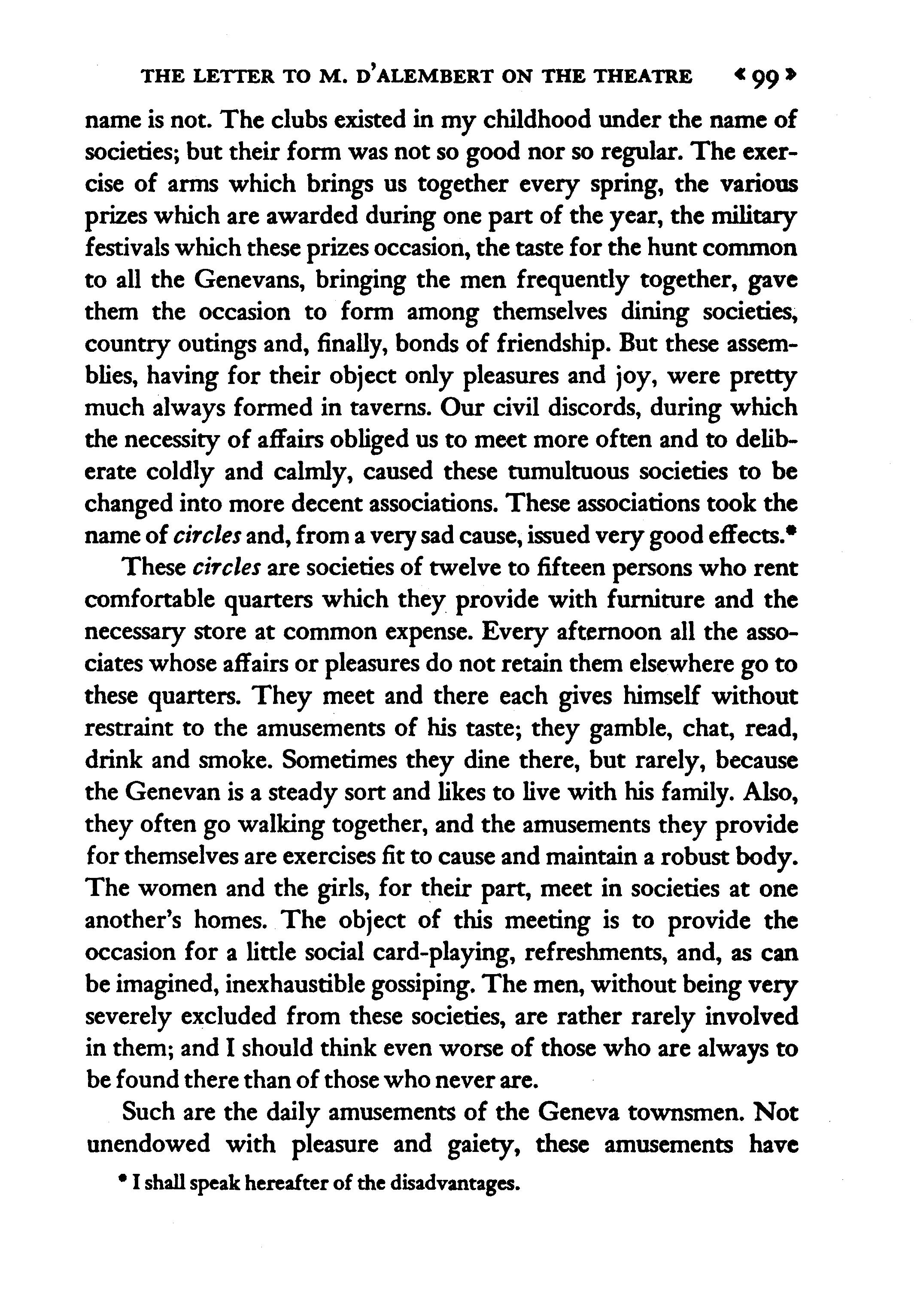
•I shallspeak hereafter of the disadvantages.
something simple and innocent which suits republican morals [manners]; but the moment there is drama, goodby to the circles, goodby to the societies! This is the revolution I predicted; all of this necessarily decays, and if you object the example of London cited by me where the established theatre did not prevent the clubs, I shall answer that there is, in relation to us, an extreme difference; it is that a theatre, which is only a speck in that immense city, will be in ours agreat object which will absorb everything.
If you ask me next what is so bad about abolishing the circles ... , No, Sir, that question will not come from a philosopher; it is a woman's speech, or that of a young man who treats our circles as guardhousesand thinks he smellsthe odoroftobacco. I must nevertheless answer; for, this once, although I address myself to you, I write for the people, and doubtless it is clear that I do so; but you haveforced metoit.
I say, in the first place, that, if the odor of tobacco is a bad thing, it is a very good one to remain·the master of one's property and to be sure ofsleepingat home. ButI am already forgetting that I do not write for d'Alemberts. I must express myself in another way.
Letusfollow theindicationsofnature, letus consultthe goodof society; we shall find that the two sexes ought to come together sometimes and to live separated ordinarily. I said it before concerning women, I say it now concerning men. They are affected as much as, and more than, women by a commerce that is too intimate; they lose not only their morals [manners], but we lose our morals [manners] and our constitution; for this weaker sex, not in the position to take on our way of life, which is too hard for it, forces us to take on its way, too soft for us; and, no longer wishing to tolerate separation, unable to make themselves into men, the womenmakeusintowomen.
This disadvantageous result which degrades man is very important everywhere; but it is especially so in states like ours, whose interest it is to prevent it. Whether a monarch governs men or
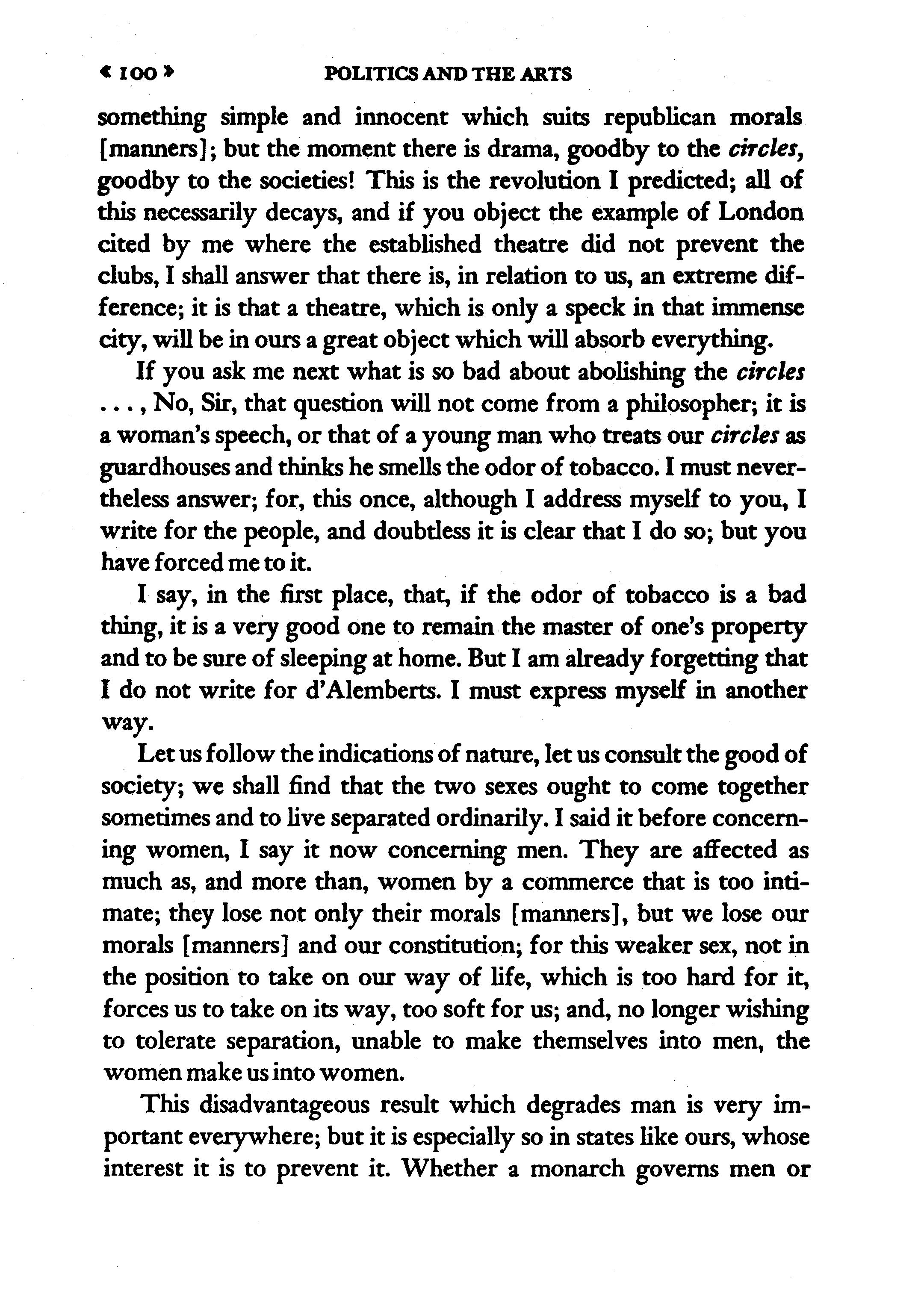
women ought to be rather indifferent to him, provided that he be obeyed; butinarepublic,menareneeded.·
The ancients spent almost their whole lives in the open air, either dispatching their business or taking care of the state's in the public place, or walking in the country, in gardens, on the seashore, inthe rain orunder the sun, and almost always bareheaded.•• In all of this, no women; but they were quite able to find them in case of need, and we do not find from their writings and the samples of their conversation which are left to us that intelligence, taste, or even love, lost anything by this reserve. As for us, we have taken onentirelycontraryways; meanly devoted to the wills of the sex which we ought to protect and not serve, we have learned to despise it in obeying it, to insult it by our derisive attentions; and every woman at Paris gathers in her apartment a harem of men more womanish than she, who know how to render all sorts of homage to beauty except that of the heart, which is her·due. But observe these same men, always constrained in these voluntary prisons, get up, sit down, pace continually back and forth to the fireplace, to the window, pick up and set down a fan a·hundred times, leaf through books, glance at pictures, turn and pirouette about the room, while the idol, stretched out motionlessly on her couch, has only her eyes and her tongue active. From where does this difference come if it is not that nature, which imposes this sed-
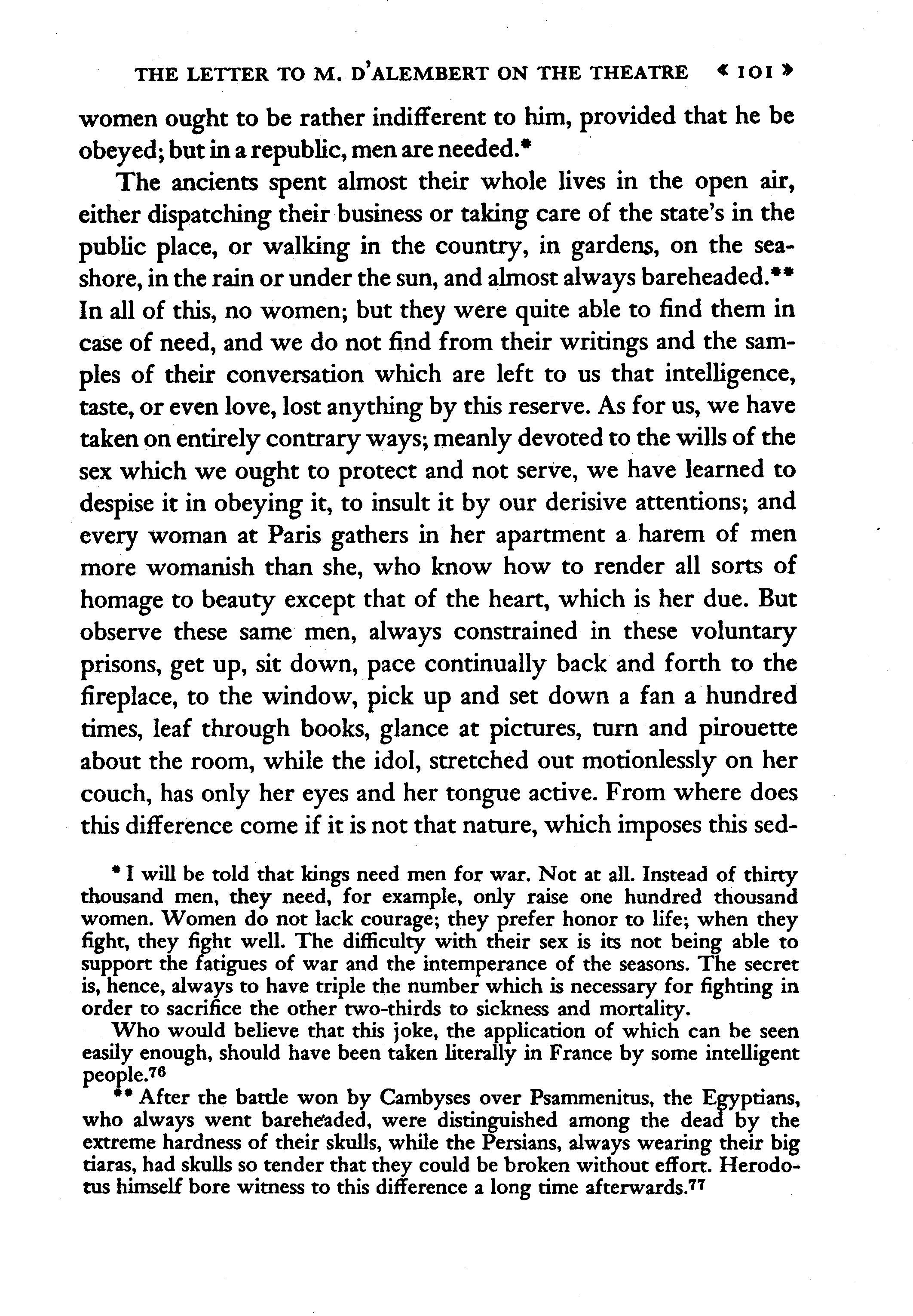
•I will be told that kings need men for war. Not at all. Instead of thirty thousand men, they need, for example, only raise one hundred thousand women. Women do not lack courage; they prefer honor to life; when they fight, they fight well. The difficulty with their sex is its not being able to support the fatigues of war and the intemperance of the seasons. The secret is, hence, always to have triple the number which is necessary for fighting in order to sacrifice the other two-thirds to sickness and mortality.
Who would believe that this joke, the application of which can be seen easily enough, should have been taken literally in France by some intelligent people.76 •• After the battle won by Cambyses over Psammenitus, the Egyptians, who always went bareheaded, were distinguished among the dead by .the extreme hardness of their skulls, while the Persians, always wearing their big tiaras, had skulls so tender that they could be broken without effort. Herodotus himself bore witness to this difference a long time afterwards.77
entary and homebound life on women, prescribes an entirely opposite one for men, and that this restlessness indicates a real need in them? If the Orientals, whose warm climate causes them to sweat a good deal, do little exercise and do not go walking at all, at least they go and sit in the open air and breath at their.ease, while here the women take great pains to suffocate their friends in sound roomsweb closed.
If the strength of the men of antiquity is compared to that of the men of today, no sort of equality can be found. Our gentlemen's exercises are children's games next to those of ancient gymnastic; rackets (la paume) has been abandoned as too fatiguing, and we can no longer travel by horseback. I say nothing of our troops. The marches of the Greek and Roman armies can no longer be conceived. Just to read of the length of march, the work, and the burden of the Roman soldier is tiring and overwhelms the imagination. Horses were not permitted to the infantry officers. Oftenthe generalsmade the same journeyson foot that their troops did.·Neverdid the two Catos travel otherwise, either alone or with their armies. Otho himself, the effeminate Otho, marched in full armor at the head of his army in going to meet Vitellius. Let one fighting man be found today capable of doing as much. Weare fallen in everything. Our painters and SCUlptors complain about not being able to find models comparable to those of antique art anymore. Why is that? Has man degenerated? Has the species a physical decrepitude just as does the individual? On the contrary; the northern barbarians, who have, so to speak, peopled Europe with a new race, were bigger and stronger than the Romans whom they vanquished and subjugated. We ought then to be stronger ourselves, we who for the most part are descended from these newcomers; but the first Romans lived like men· and found in their
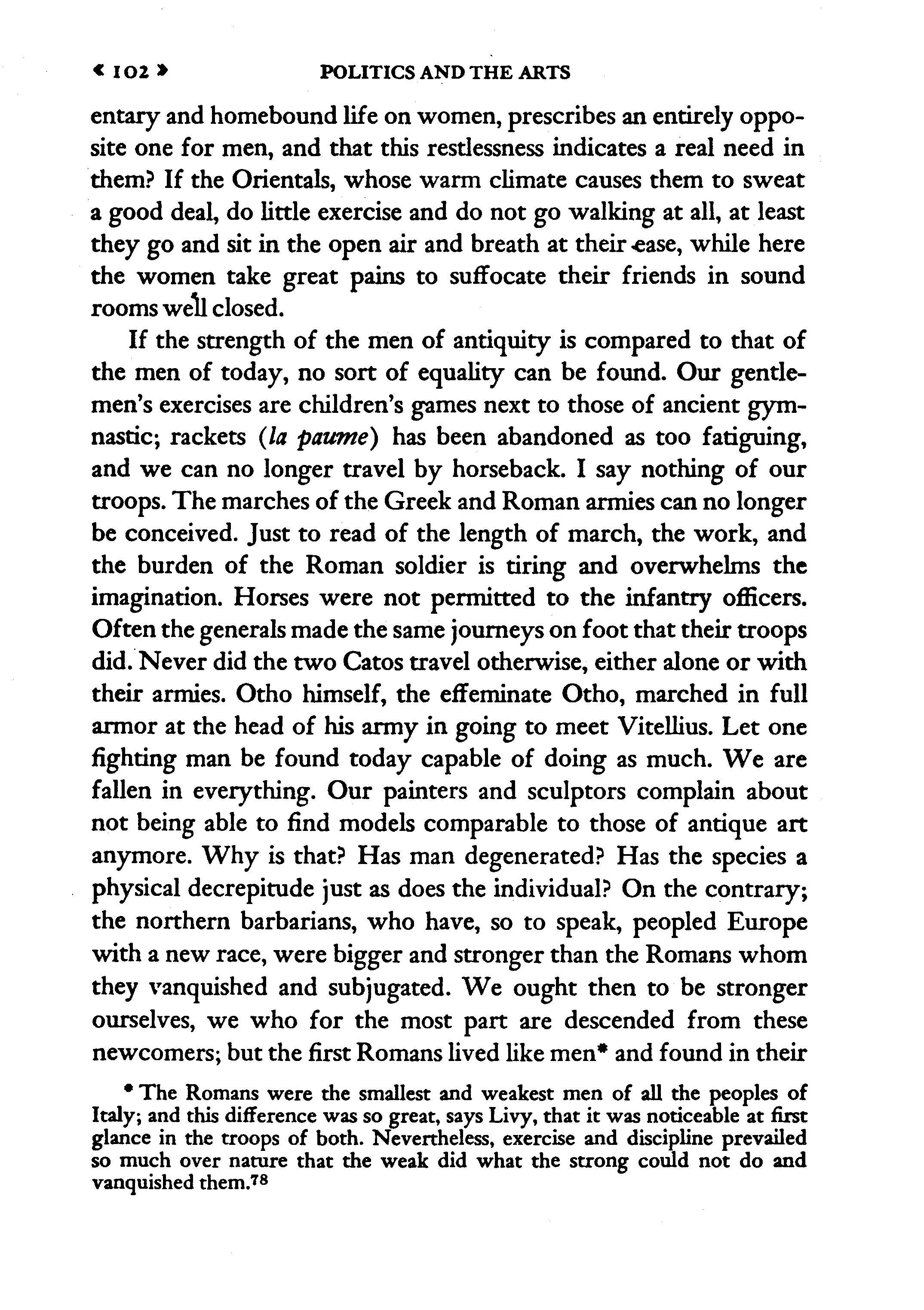
• The Romans were the smallest and weakest men of all the peoples of Italy; and this difference was so great, says Livy, that it was noticeable at first glance in the troops of both. Nevertheless, exercise and discipline prevailed so much over nature that the weak did what the strong could not do and vanquished them.78
constant exercises the vigor that nature had refused them, while we lose ours in the indolent and soft life to which our dependence on women reduces us. If the barbarians of whom I have just spoken lived with women, they did not, for all that, live like them. It was they who had the courage to live like the men, just as the Spartan women did. The woman made herself robust, and the man wasnotenervated.
If this effort to oppose Nature is hurtful to the body, itis even more so to the mind. Imagine what can be the temper of the soul of a man who is uniquely occupied with the important business of amusing women, and who spends his entire life doing for them what they ought to do for us when, exhausted by labors of which they are incapable, our minds have need of relaxation. Given to these puerile habits, to what that is great could we ever raise ourselves? Our talents and our writings savor of our frivolous occupations;- agreeable if one wishes, but, small and cold like our sentiments, they have as their sole merit that easy and clever style which is not hard to give to nothings. These throngs of ephemeral works which come to light every day, made only to amuse women and having neither strength nor depth, fly from the dressing table to the counter.79 This is the way to rewrite ever again the same things and to make them always new. Two or three will be cited which will serve as exceptions; but I will cite a hundred thousand which
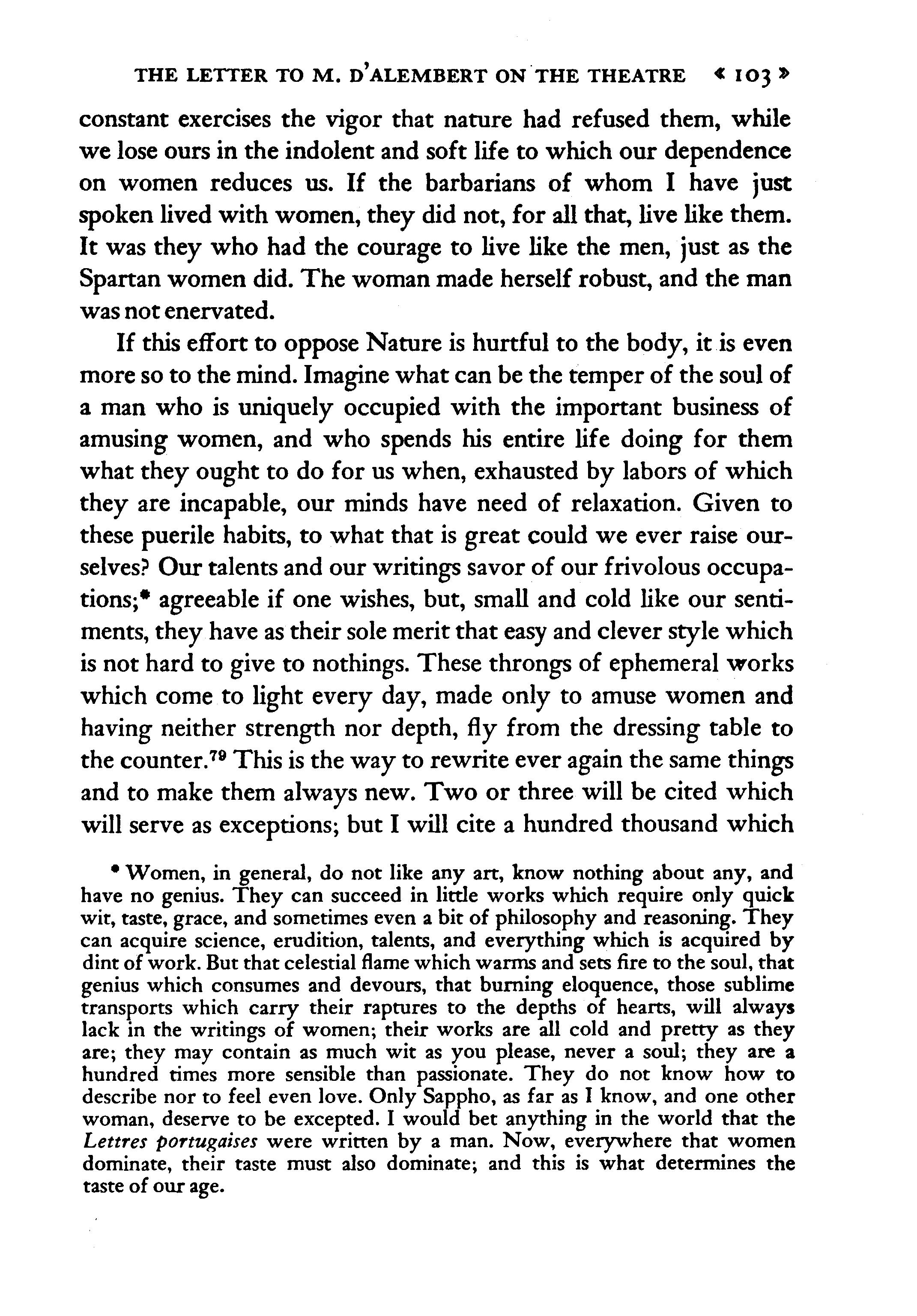
• Women, in general, do not like any art, know nothing about any, and have no genius. They can succeed in little works which require only quick wir, taste, grace, and sometimes even a bit of philosophy and reasoning. They can acquire science, erudition, talents, and everything which is acquired by dint of work. Bur that celestial flame which warms and sets fire to the soul, that genius which consumes and devours, that burning eloquence, those sublime transports which carry their raptures to the depths of hearts, will always lack in the writings of women; their works are all cold and pretty as they are; they may contain as much wit as you please, never a soul; they are a hundred times more sensible than passionate. They do not know how to describe nor to feel even love. Only Sappho, as far as I know, and one other woman, deserve to be excepted. I would bet anything in the world that the Lettres portugaises were written by a man. Now, everywhere that women dominate, their taste must also dominate; and this is what determines the taste ofour age.
will confinn the rule. It is for this reason that most of the productions of our age will pass with it, and posterity will think that very few books were written in this age which produced so many.
It would not be hard to show that instead of gaining by these practices, the women lose. They are flattered without being loved; they are served without being honored; they are surrounded by agreeable persons but they no longer have lovers; and the worst is that the former, without having the sentiments of.the latter, usurp nonetheless all the rights. The society of the two sexes, having becometoo usual and too easy, has produced these two effects, and it is thus that the general spirit of gallantry stifles both genius and love.
Asfor me,1find it hard to conceive how men can honor women so little as to dare to address these stale amorous speeches ceaselessly to thein, these insulting and mocking compliments to which they do not even deign to give an air of good faith. When we insult women by these evident lies, does it not amount to declaring to them rather plainly that no obliging truth can be found to say to them? It happens only too often that love makes illusions for itself about the qualities oi the one who is loved; but is·there a question of love in all this tedious jargon? Do not all those who use it use it equally for all women? And would they not be vexed if they were thought to be seriously in love with a single one? Let them not be disquieted. It would require strange ideas of love to believe them capable of it, and nothing is so far removed from its tone than that of gallantry. In the way that 1conceive of this terrible passion, its perplexity, its frenzies, its palpitations, its transports, its burning expressions, its even more energetic silence, its inexpressible looks which their timidity renders reckless and which give evidence of desires through fear, it seems to me that, after a language so vehement, if the lover only once brought himself to say, "I love you," the beloved, outraged, would say to him, "you do not love me anymore," and would neversee him againin herlife.
Our circles still preserve some image of ancient morals [man-
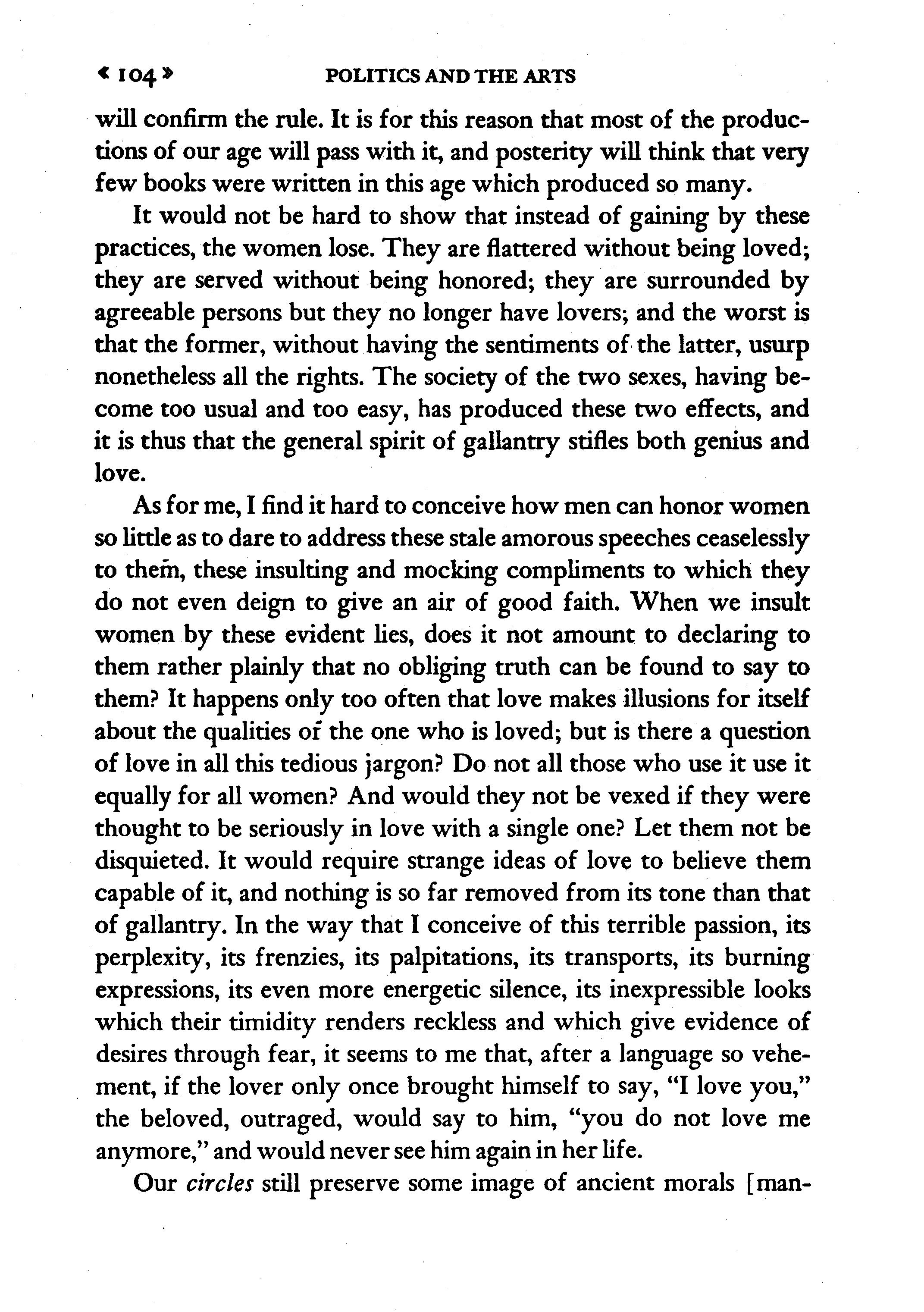
ners] among us. By themselves, the men, exempted from having to lower their ideas to the range of women and to clothe reason in gallantry, can devote themselves to grave and serious discourse without fear of ridicule. They dare to speak of country and virtue without passing for windbags; they even dare to be themselves without being enslaved to the maxims of a magpie. If the tum of conversation becomes less polished, reasons take on more weight; they are not satisfied by jokes or compliments. They cannot get away with fine phrases for answers. They do not humor one another in dispute; each, feeling himself attacked by all the forces of his adversary, is obliged to use all his own to defend himself; it is thus that the mind gains precision and vigor. If some licentious remarksare mixed in withall this, oneought notto take umbrage at it. The least vulgar are not always the most decent, and this language, a bit rustic, is still preferable to the more studied style with which the two sexes mutually seduce one another and familiarize themselves in all propriety with vice. The way of life that is more in conformity with the inclinations of man is also better suited to his temperament. He does not remain settled in a chair for the whole day. He applies himself to games which give exercise, he comes and·goes; many circles are held in the country, others go there. There are gardens for walking, spacious courts for exercise, a big lake for swimming, the whole country is open for the hunt..And it must not be thought that this hunt is conducted so comfortably as in the environs of Paris, where game is to be found underfoot and where one can shoot on horseback. In a word, these decent and ilfilocent institutions combine everything which can contribute to making friends, citizens, and soldiers out of the same men, and, in consequence, everything which is most appropriate to a free people.
The societies of women are blamed for one failing; they make the women scandalmongers and satirists; and, indeed, one can easily understand that the anecdotes of a little city do not escape these feminine meetings; it can also be believed that the absent
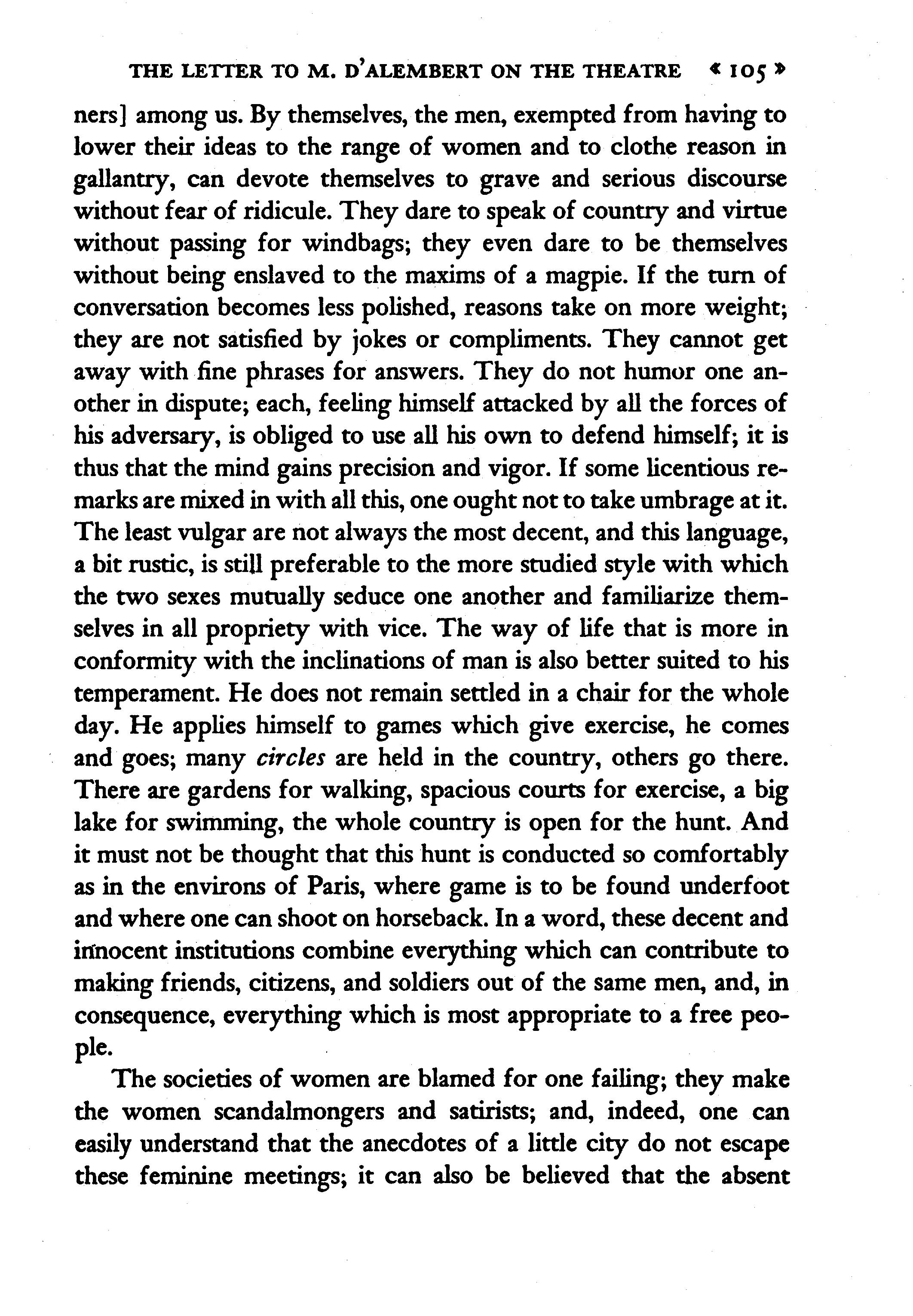
husbandsare hardly spared; and no pretty and sought-after woman has an easy time of it in her neighbor's circle. But perhaps there is more good than bad in this failing, and it is, in any event, incontestably less harmful than those whose place it takes; for which is better, that a woman speak ill of her husband with her friends or that she do it with a man in private conversation, that she criticize the disorder of her neighbor or that she imitate it? Although the Genevans tell rather easily what they know and sometimes what they conjecture, they are really disgusted by calumny, and they will never be heard to make accusations against another that they believe to be false; while in other countries, the women, guilty equally by their silence and by their speech, hide, for fear of reprisals, the ill which they know, and publish for vengeance what theyhaveinvented.
How many public scandals are prevented for fear of these severe observers? They almost perform the function of censors in our city. It is thus that in the great days of Rome, the citizens, watching one another, publicly accused one another out of zeal for justice; but when Rome was corrupted and there was nothing left to do for good morals [manners] other than to hide the bad ones, the hatred of vices which unmasks them became one itself. The infamous informers succeeded zealous citizens; and, whereas formerly the good accused the vicious, they were accused in their turn. Thank heaven we are far from so terrible an end. We are not reduced to hiding from our own eyes for fear of disgusting ourselves. As for me, I will not have a better opinion of women when they are more circumspect. Women will humor one another more when there are more reasons for doing so and when each will need for herself the discretion the example of which she will set for others.
So then, we need not be much disturbed by the cackle of the women'ssocieties. Letthem speakill ofothers so much as they like, provided they do so among themselves. Really corrupt women could not long endure this way of life; and, however dear gossip
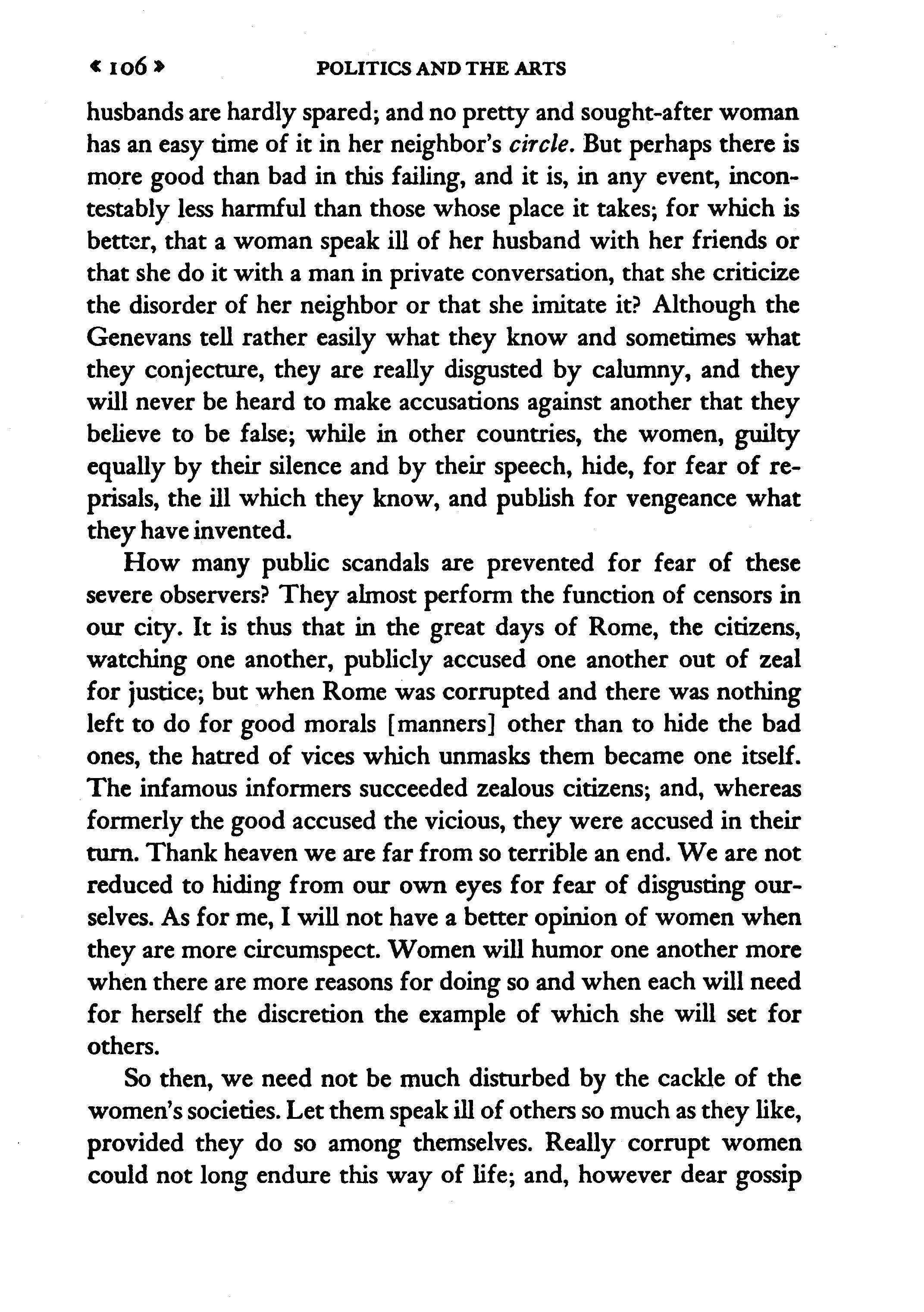
may be to them, they would want to gossip with men. No matter what people have said to me about them, I have never seen any of these societies without a secret sentiment of esteem and respect for those who compose them. Such is, I said to myself, the plan of nature, which gives different tastes to the two sexes, so that they liveapartand eachin hisway.·Thus, these agreeable persons spend all their days devoted to occupations which are suitable for them or to innocent and simple amusements, quite apt to move a decent heart and to give a good opinion of them. I do not know what they said but they lived together; they may have spoken of men but they did without them; and, although they criticized the conduct of others so severely, at least their own was irreproachable.
The circles of men doubtlessly also have their disadvantages; what that is human does not? They gamble, they drink, they get drunk, they spend the whole night; all this may be true, all this may be exaggerated. There is everywhere a mixture of good and evil, but in different degrees. Everything is abused, a trivial axiom on the basis of which one ought neither to reject everything nor to accept everything. The rule for choosing is simple. When the good surpasses the evil, the thing ought to be accepted in spite of its disadvantages; when the evil surpasses the good, it must be rejected even with its advantages. When the thing is good in itself and bad only in its abuses, when the abuses can be provided against without much effort or tolerated without great harm, they can serve as the pretext, but not as the reason, for abolishing a useful practice; but what is bad in itself will always be bad,··whatever
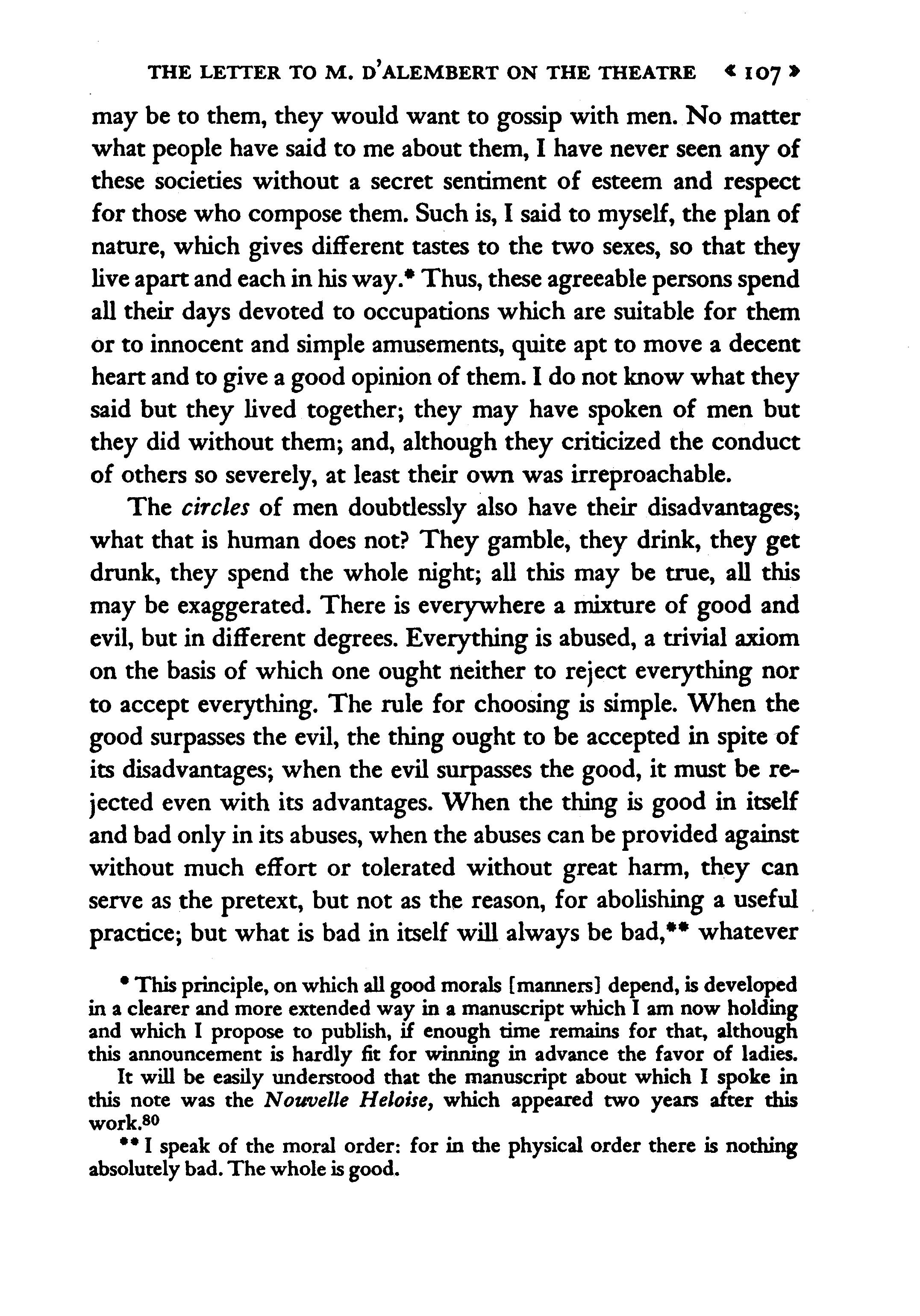
• This principle, on which all good morals [manners] depend, is developed in a clearer and more extended way in a manuscript which I am now holding and which I propose to publish, if enough time remains for that, although this announcement is hardly fit for winning in advance the favor of ladies.
It will be easily understood that the manuscript about which I spoke in this note was the Nouvelle Heloise, which appeared two years after this work.SO •• I speak of the moral order: for in the physical order there is nothing absolutely bad.The whole is good.
may be done to make good use ofit. Such is the essential difference betweenthe circles andthetheatre.
The citizens of the same state, the inhabitants of the same city, are not anchorites; they could not always live alone and separated; if they could, it would not be necessary to constrain them to it. It is only the fiercest despotism which is alarmed at the sight of seven or eight men assembled, ever fearing that their conversation turns ontheirmiseries.
Now, of all the kinds of relations which can bring individuals together in a city like our own, the circles form incontestably the most reasonable, the most decent, and the least·dangerousones, because they neither wish nor are able to be hidden, because they are public and permitted, because order and rule prevail in them. It is even easy to demonstrate that the abuses which might result from them would arise equally in all qf the others or that they would produce even greater ones. Before thinking of destroying an established practice, those that will be introduced in its place ought to have been carefully weighed. Whoever can propose one which is feasible and from which no abuse will result, let him propose it, and after that the circles can be abolished; well and good. Meanwhile, let us, if need be, permit men to spend the night drinkingwho,withoutthat, mightspenditdoingworse.
All intemperance is vicious, and especially the one which deusofthenoblestofourfaculties. The excessofwine degrades man, at the least alienates his reason for a time, and in the long run, brutalizes it. But, after all, the taste for wine is not a crime and rarely causes one to be committed; it makes man stupid, not evil.• For every fleeting quarrel that it causes, it forms a hundred durable attachments. Speaking generally, drinkers are cordial and
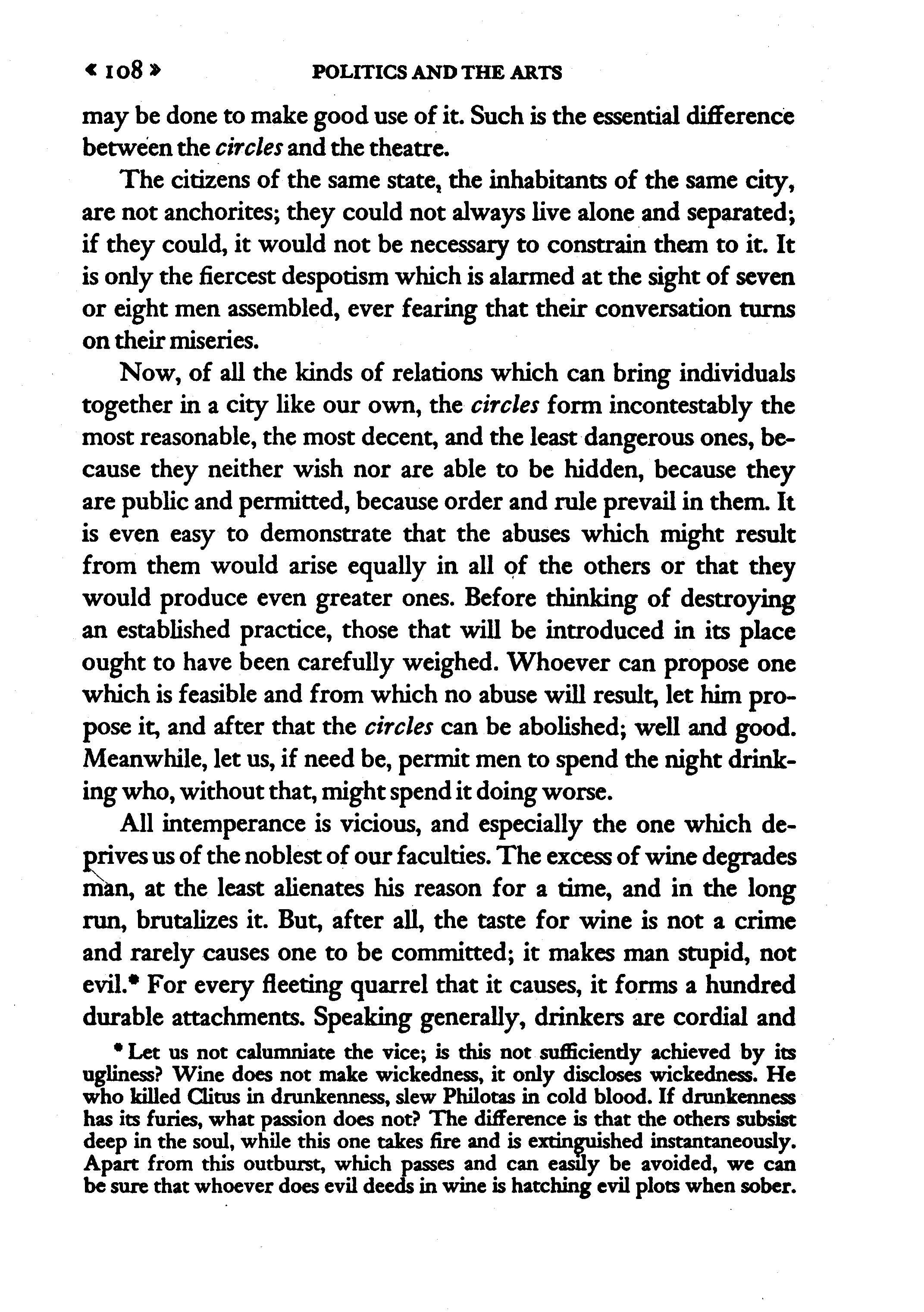
• Let us not calumniate the vice; is this not.sufficiendy achieved by its ugliness? Wine does not make wickedness, it only discloses wickedness. He who killed Oitus in dnmkenness, slew Philotas in cold blood. If dnmkenness has its furies, what passion does not? The dUference is that the others subsist deep in the soul, while this one takes tire and is extinrished instantaneously. Apart from this outburst, which passes and can easily be avoided, we can be sure that whoever does evil deeds in wine is hatching evil plots when sober.
frank; they are almost all good, upright, just, faithful, brave, and decent men except for their single failing. Would.one dare to say as much for the vices that are substituted for this one? Or can one pretend to make out of a whole city a race of men without failings, . and self-controlled in everything? How many apparent·virtues often hide real vices! The wise man is sober by temperance, the cheat out of hypocrisy. In the countries of bad morals [manners], intrigues, treason, and adultery, men-are apprehensive about an indiscreet state in which the heart is revealed while we are not on our guard. Everywhere, the people who most abhor drunkenness are those for whom itis mostimportantto protectthemselves from it. In Switzerland it is almost esteemed, in Naples it is detested. But, in the final accounting, which is more to be feared, the intemperanceoftheSwissorthereserve oftheItalian?
I repeat, it would be better to be sober and true, not only for oneself but even for society; for everything which is bad in morality is also bad in politics. But the preacher stops at personal evil, the magistrate sees only the public consequences; the former has as his object only man's perfection, to which man never attains; the latter, only the good of the state insofar as it can be attained; thus all that it is right to blame from the pulpit ought not to be punished by the laws. Never has a people perished from an excess of wine; all perish from the disorder of women. The reason for this difference is clear; the first of these two vices turns one away from the others; the second engenders them all. The diversity of ages has something to do with it too. Wine tempts youth lessand drags it down less easily; hot blood gives it other desires; in theage of passions all are inflamed by the fire of asingle one, reason is perverted at its birth, and man, still untamed, becomes undisciplinable before having borne the yoke of the laws. But let halfchilled blood seek a support which reanimates it, let a beneficent liquor take the place of the spirits that it has no more;· when an
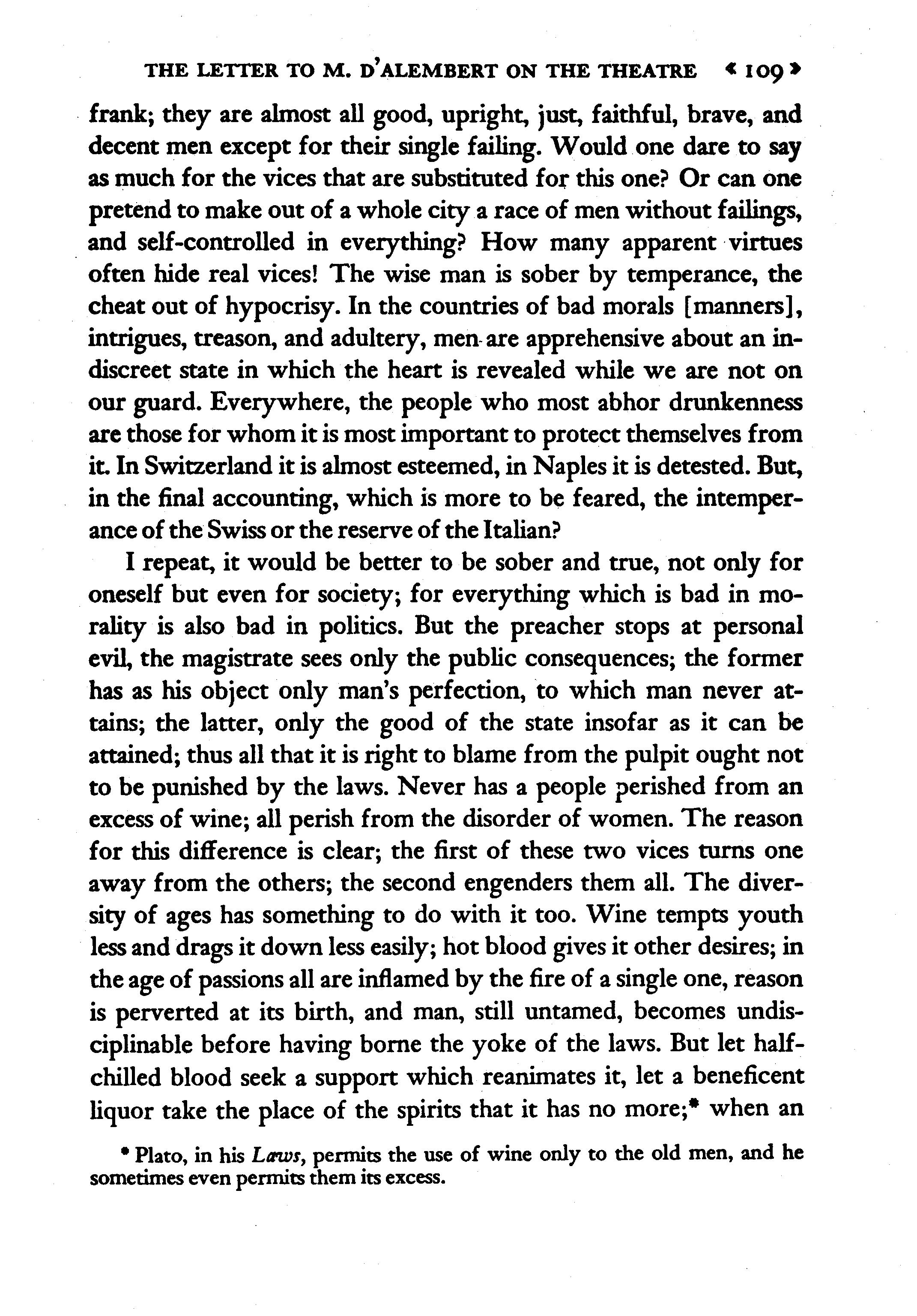
• Plato, in his Ltl'Ws, pennits the use of wine only to the old men, and he sometimes even permitsthem itsexcess.
old man abuses this sweet remedy, he has already fulfilled his duties to his country; he deprives it only of the refuse of his years. He is at fault no doubt; he ceases to be a citizen before his death. But the other has not even begun being one; he makes himself, rather, into a public enemy by the seduction of his accomplices, by the example of the effect of his corrupted morals [manners] and, above all, by the pernicious moral principles he cannot fail to disseminate in order to authorize his deeds. It would have beenbetterhad heneverexisted.
From the passion for gambling arises a more dangerous abuse, but one that can be easily provided against or repressed. This is an affair for the police, the inspection of which is easier and more becoming in the circles than in private homes. Opinion can do much on this point; and as soon as the games that involve exercise and skill aremade honorable, cards, dice, and games of chance will inevitably fall in decay. I do not even believe, whatever may be said, that these idle and delusive means of filling one's purse ever gain much credit with a reasonable and hard-working people, which knows too well the value of time and money to like losing themtogether.
Let us then preserve the circles, even with their faults. For these faults are not in the circles but in the men who compose them; and there is no imaginable form of social life in which the same faults do not produce more harmful effects. Again, let us not seek for the chimaera of perfection but for the best possible according to the nature of man and the constitution of society. There are some peoples to whom I would say, destroy your circles and clubs, remove every barrier of propriety between the two sexes; ascend again, if it is possible, to the point of being only corrupt. But you, Genevans, avoid becoming corrupt if there is still time. Beware of the first step which is never the last one, and consider that it is easier to keep good morals [manners] than to put an end to bad ones.
Only ,two years of theater and everything will be overturned.
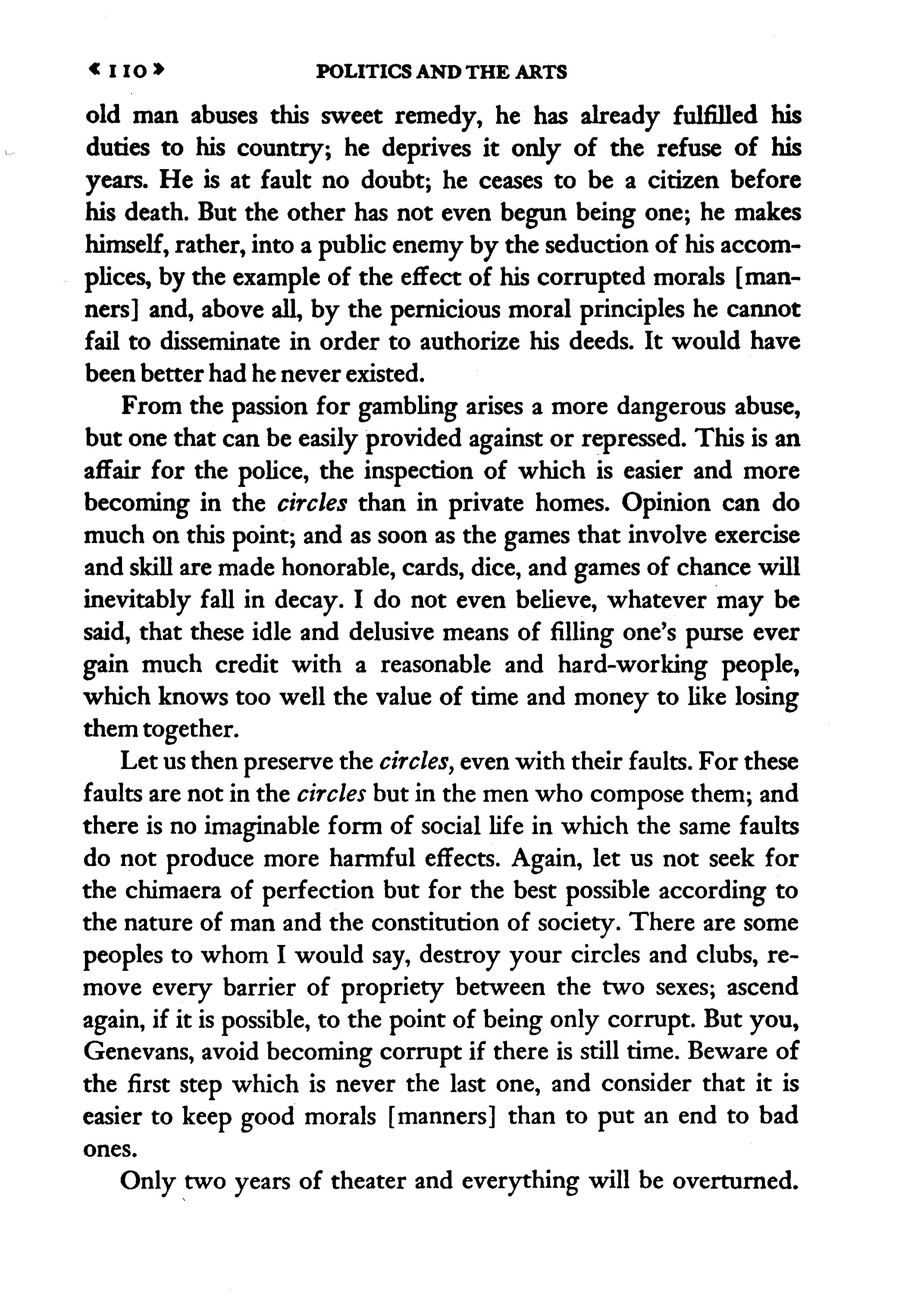
They could not possibly divide themselves among so many amusements; the hour of the theatre, being that of the circles, will cause them to dissolve; too many of the members will break away; those who remain will not be assiduous enough to be a great resource to one another nor to allow the associations to subsist for long. The two sexes meeting daily in the same place; the groups which will be formed for going there; the ways of life that they will see depicted in the theatre, which they will be eager to imitate; the exposition ofthe ladies and the maidens all tricked out in their very best and put on display in the boxes as though they were in the window of a shop waiting for buyers; the affluence of the handsome young who will come to show themselves off, for their part, and who will soon find it much nicer to caper in the theatre than to exercise on the Plain-Palais; the little suppers with women which will be arranged on leaving, even if they are only with the actresses; finally, the contempt for the old practices which will result from the adoption of the new ones, all of this will soon put the agreeable life of Paris and the fine airs of France in the place of our old simplicity; and I rather doubt that Parisians in Geneva willlongpreservethe tastefor ourgovernment.
One must not dissemble; the intentions are still upright, but the morals [manners] already noticeably incline toward decadence, and we follow, at a distance, in the tracks of those same peoples whose fate does not fail to cause us anxiety. For example, I am told that the education of the young is generally much better than it was formerly; however, this can be proved only by showing that it makes better citizens. It is certain that the children know how to bow better, that they know how to offer their hand more gallantly to ladies and to sayan infinity of charming things to them for which I would have them beaten, that they know how to make decisions, settle things, interrupt grown men, and pester everybody without modesty or discretion. I am told that this trains them; I agree that this trains them to be impertinent and that thisis, of all the things they learn by this rnethod, the only one
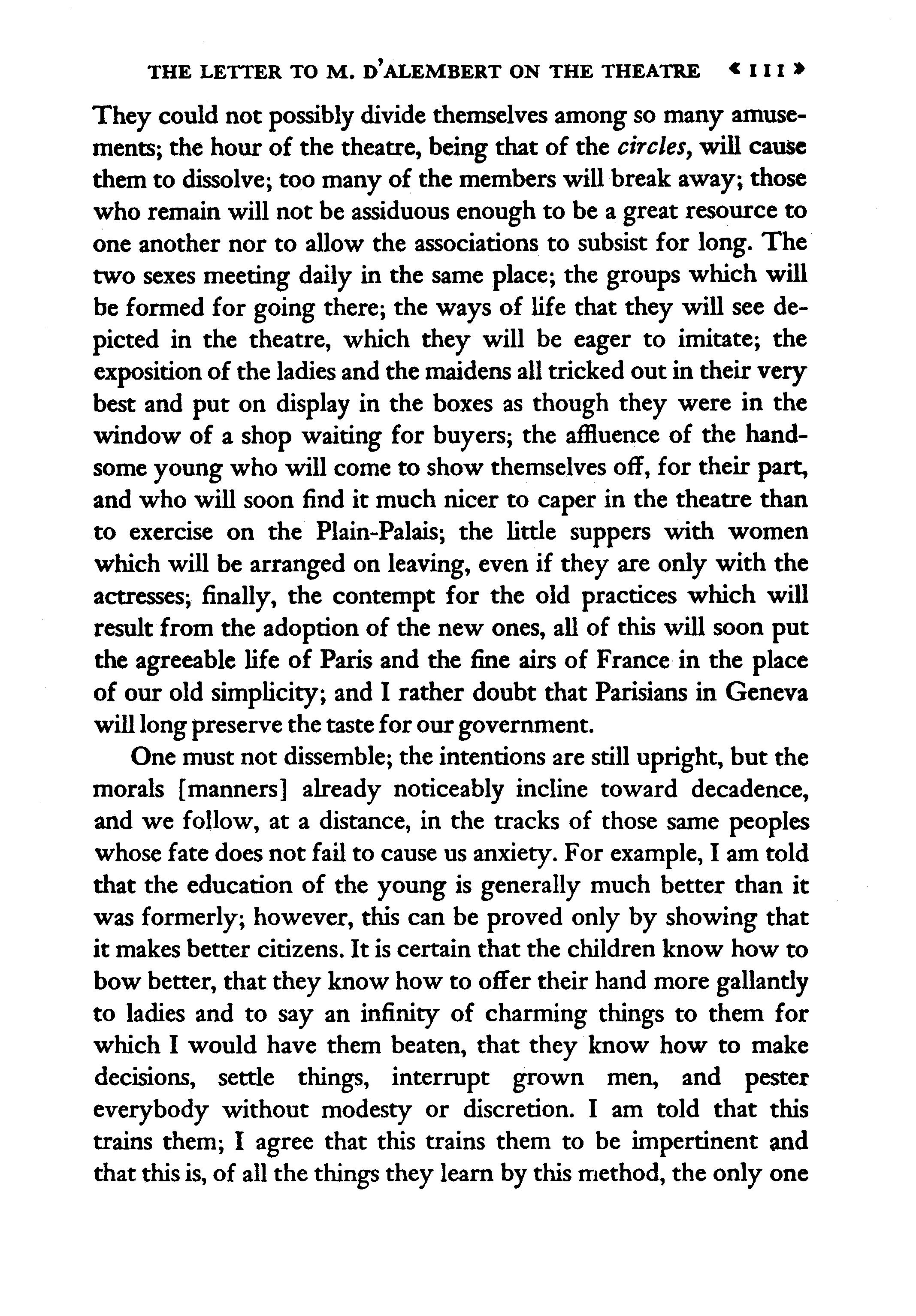
they do not forget. This is not all. In order to restrain them with the women whom they are destined to divert, care is taken.to raise the children exactly like the women; they are protected from the sun, the wind, the rain, and the dust so that they will never be able to bear any of them. Since it is impossible to keep them from all contact with air, things are at least arranged so that it only gets to them after having lost half of its energy. They are deprived of all exercise, they are relieved of all their faculties, and they are rendered inept for any other activities than those to which they are destined; the only thing which the women do not exact from these vile slaves is that they consecrate themselves to their service in the oriental fashion. With this difference, all that distinguishes them from the women is that, since nature has refused them women's graces, they substitute for them ridiculousness. On my last trip to Geneva, I already saw several of these young ladies in jerkins, with white teeth, plump hands, piping voices, and pretty greenparasolsintheirhands,rathermaladroitlycounterfeitingmen.
Men were coarser in my time. The children, rustically raised, had no compleXion to preserve and did not fear the injuries of the air to which they had been accustomed from an eady date. The fathers took the children with them on the hunt, in the country, to all their exercises, in every society. Timid and modest before aged people, they were hardy, proud, and quarrelsome among themselves.They had no hairdo to preserve; they challenged one another at wrestling, running, and boxing. They fought in good earnest, hunoneanothersometimes, and then embraced in theirtears. They went home sweating, out of breath, and with their clothes tom; they were real scamps, but these scamps made men who have zeal for the service of the country in their hearts and blood to spill for it. Please God that as much can be said one day for our fine little spruced-up gentlemen and that these men of fifteen will not be childrenofthirty.
Happily they are not all like this. The greater number still retain that old ruggedness which preserves a good constitution as
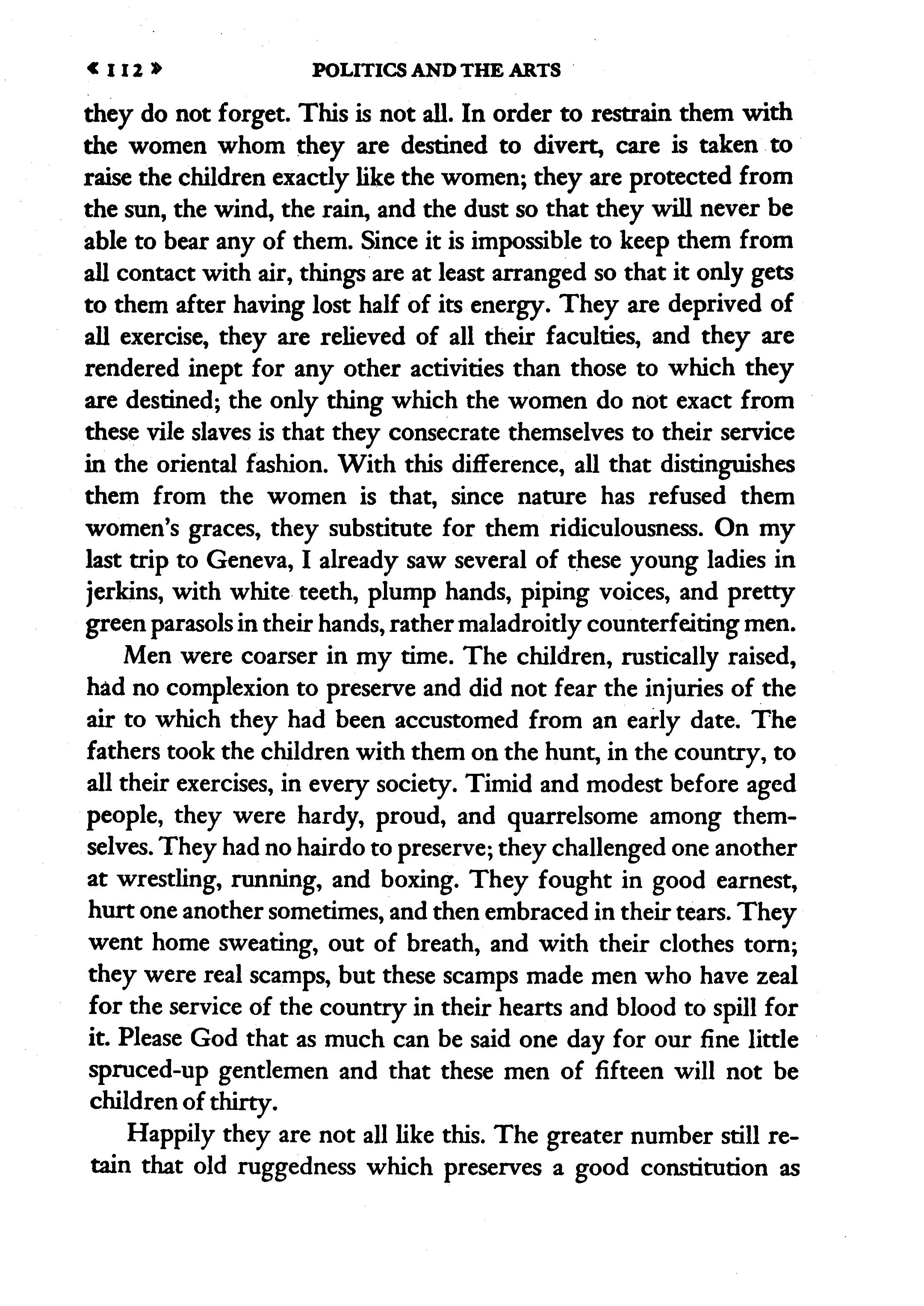
well as good morals [manners]. Even those whom an over-delicate education softens for a time will be constrained, when they are grown up, to bend themselves to the habits of their compatriots. The latter will lose their roughness in the commerce of the world; the former will gain strength in exercise; all will become, I hope, what their ancestors were, or, at least, what their fathers are today. But let us not flatter ourselves that we shall preserve our liberty in renouncing the morals [map-ners]which acquired it.
x
I RETURN to our actors, and, still supposing that they have a success which seems to me impossible, I find that this success will attack our constitution, not only in an indirect way, in attacking our morals [manners], but directly in disturbingthe equilibrium which ought to prevail among the various parts of the state in order to preservethewholebodyingood health.
From the many reasons that I could give, I shall content myself with choosing one which is most suitable for the greatest number, because it limits itself to considerations of self-interest and money, always more palpable to the vulgar than moral effects, of which they are unable to see either the connections with their causes, or theirinfluenceonthe destinyofthestate.
The theatre might be considered, if it succeeds, as a sort of tax which, although voluntary, is nonetheless onerous for the people in that it provides a continual occasion for expenditure which it cannot resist. This tax is a bad one, not only because none of it comes back to the sovereign, but especially because its distribution, far from being proportional, burdens the poor beyond their strength and relieves the rich in taking the place of the more costly amusements which they would provide for themselves for want of this one. To agree to this, one need only observe that the differences in the prices of the seats are not, nor can they be, in proportion to those of the fortunes of the people who fill them. At
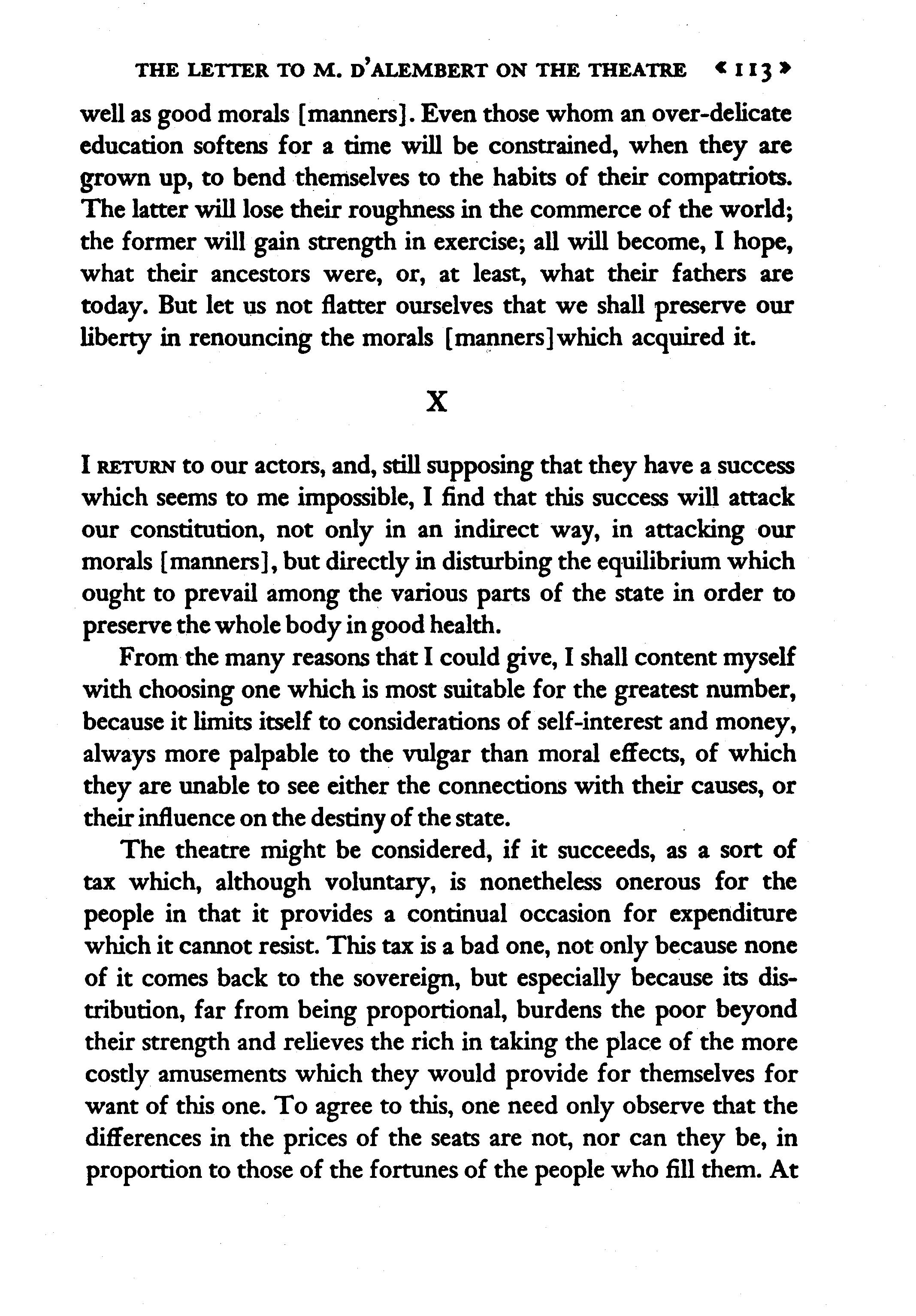
the Comedie-Franfai.se, the first boxes and the places on the stage are four francs ordinarily, and six on the days of special prices; the pit costs twenty sous; there have even been repeated attempts to increase it. Now, no one will say that the wealth of the richest who go to the theatre is only quadruple that of the poorest who sit in the pit. Speaking generally, the former are of an excessive opulence and most of the others have nothing.· It is with this as with the taxes on wheat, wine, salt, and everything necessary to life which have an appearance of justice at first glance and are at bottom very iniquitous; for the poor, who can only spend for necessities, are forced to throwaway three quarters of what they spend in taxes, whereas, since the same necessities are only the least part of the expenditure of the rich, the tax is practically unnoticeable to them.··In thisway, he who has little pays much, and he who has much pays little; I do not see what great justice can be found in that.
I will be asked who forces the poor to go to the theatre. I answer: first, those who establish it and give them the temptation. In the second place, their very poverty, which condemns them to constantlabor without hope ofseeingit end, makes some relaxation necessary for the poor in order to bear it. They do not consider themselves unhappy because they work without respite when
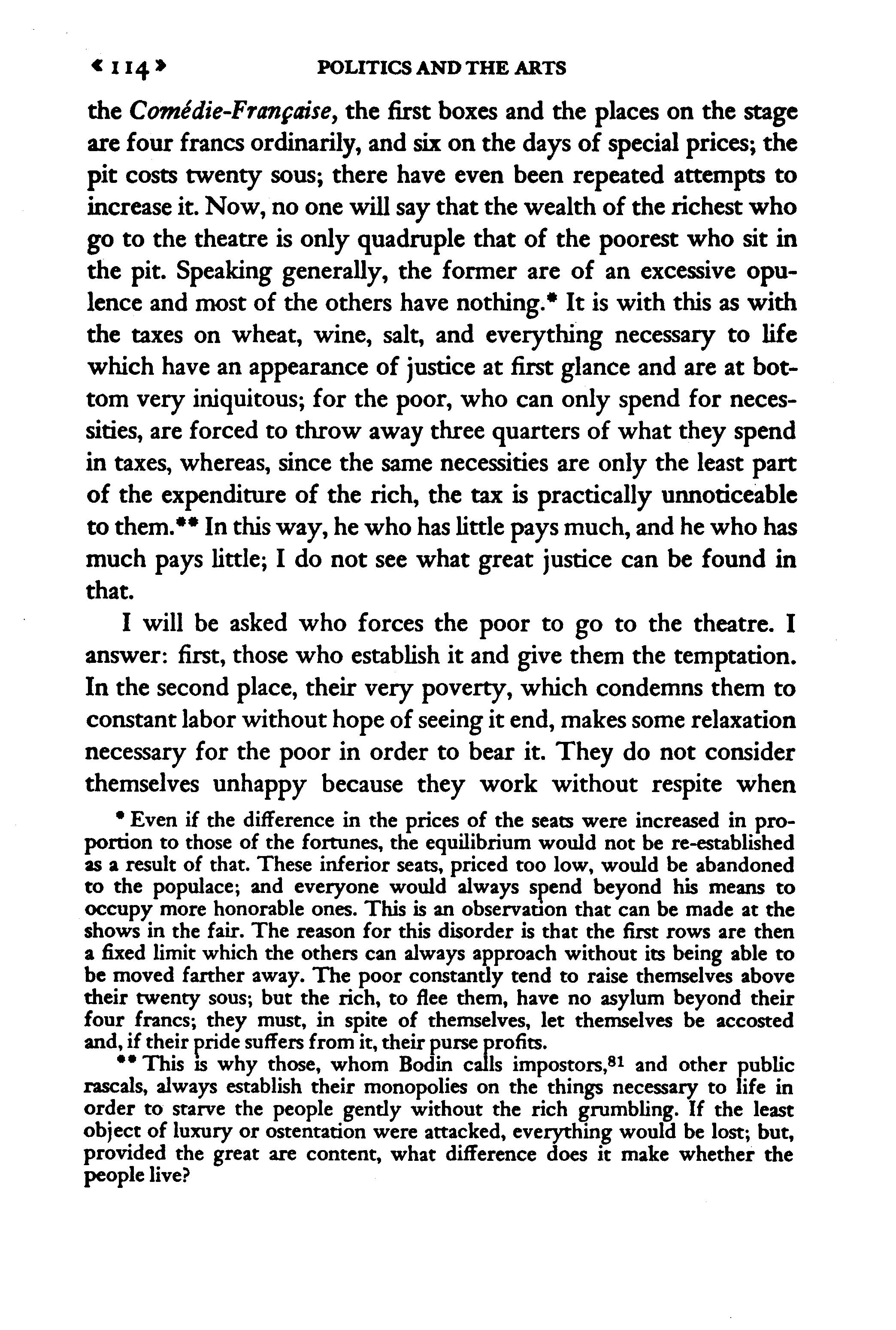
• Even if the difference in the prices of the seats were increased in proportion to those of the fortunes, the equilibrium would not be re-established as a result of that. These inferior seats, priced too low, would be abandoned to the populace;and everyone would always spend beyond his means to occupy more honorable ones. This is an observanon that can be made at the shows in the fair. The reason for this disorder is that the first rows are then a fixed limit which the others can always approach without its being able to be moved farther away. The poor constantly tend to raise themselves above their twenty sous; but the rich, to flee them, have no asylum beyond their four francs; they must, in spite of themselves, let themselves be accosted and, if their pride suffers from it, their purse profits. •• This IS why those, whom Bodin calls impostors,s1 and other public rascals, always establish their monopolies on the things necessary to life in order to starve the people gently without the rich grumbling. If the least object of luxury or ostentation were attacked, everything would be lost; but, provided the great are content, what difference does it make whether the people live?
everybody else does the same; but is it not crnel to the one who works to be deprived of the recreations of the idle? He shares them then; and this very amusement which provides a means of economy for the rich, doubly weakens the poor, either by a real increase in expenses or by less zeal for work, as I have explained it above.
From these new reflections, it follows evidently, I believe, that the modem theatre, which can only be attended for money, tends everywhere to promote and increase the inequality offortunes, less noticeably, itis true, in the capitals than in alittle city like our own. If I grant that this inequality, carried to a certain point, can have its advantages, you will certainly also grant that it ought to have limits, above all in a little state, above all in a republic. In a monarchy, where all the orders are intermediate between the prince and the people, it can be a matter of some indifference that certain men pass from one to the other; for since others replace them, this change does not interrupt the progression. But in a democracy, in which the subjects and the sovereign are only the same men considered in different relations, as soon as the smaller number wins out in riches over the greater number, the state must perish or changeits form. Whether the rich become richer or the poormore indigent, the difference of fortunes is no less increased in one way than the other; and this difference, carried beyond its measure, is what destroys the equilibrium about which I have spoken.
Never in a monarchy can the opulence of an individual put him above the prince; but, in a republic, it can easily put him above the laws. Then the government no longer has force, and the rich are always the true sovereign. On the basis of these incontestable maxims, it remains to be considered whether inequality has not reached among us the last limit to which it can go without shaking the republic. I refer myself on this point to those who know our constitution and the division of our riches better than I do. What I do know is that, since time by itself gives to the order of things a natural inclination toward this inequality and a succes-
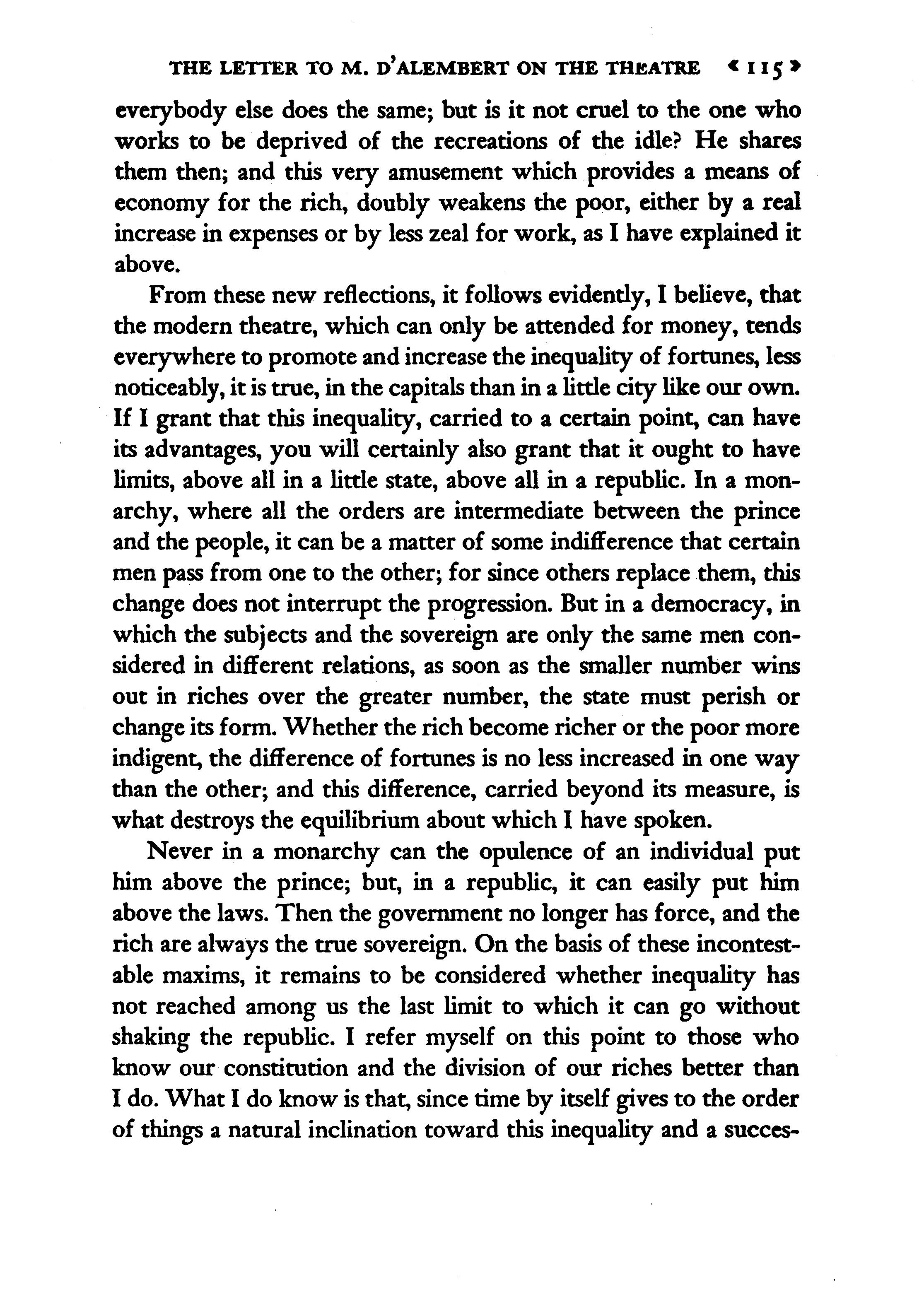
sive progress in it up to its last limit, it is a great imprudence to accelerate it even more by establishments which promote it. The great Sully, who loved us, would certainly have been able to tell us: theatres and drama in any little republic, and especially in Geneva,weakenthestate.
If the establishment of the theatre is in itself so harmful to us, what fruit will we cull from the plays which are performed in it? The very advantages which they might procure for the peoples for whom they were composed will turn to our prejudice, ingivingus for instruction what was given to them for censure, or, at least, in directing our tastes and our inclinations toward the things in the world which suit us the least. Tragedy will represent tyrants and heroes for us. What have we to do with them? Are we made to have them or to become ones ourselves? It will give us a vain admiration for power and greatness. To what end will it serve us? Will we be greater or more powerful for it? Of what import is it for us to go and study the duties of kings on the stage while neglecting to fulfil our own? Will the sterile admiration for the virtues of the theatre compensate us for the simple and modest virtues which make the good citizen? Instead of curing us of our own ridiculousness, the comedy will bring us that of others; it will persuade us that we are wrong to despise vices that are so much esteemed elsewhere. However foolish a marquess may be, he is still amarquess. Imagine whataresonance this title has in a country happy enough not to have any; and who knows how many shop drudges will think they are putting themselves in fashion by imitating the marquesses of the last century? I shall not repeat what I have already said of good faith always mocked and of the constant example ofcrimes made into jokes. Whatlessons for a people all of whose sentiments still have their natural rectitude, who believe that arascal is always contemptible and that a good man cannot be ridiculous. What! Plato banished Homer from his republic and we will tolerate Moliere in ours! What worse could happen to us
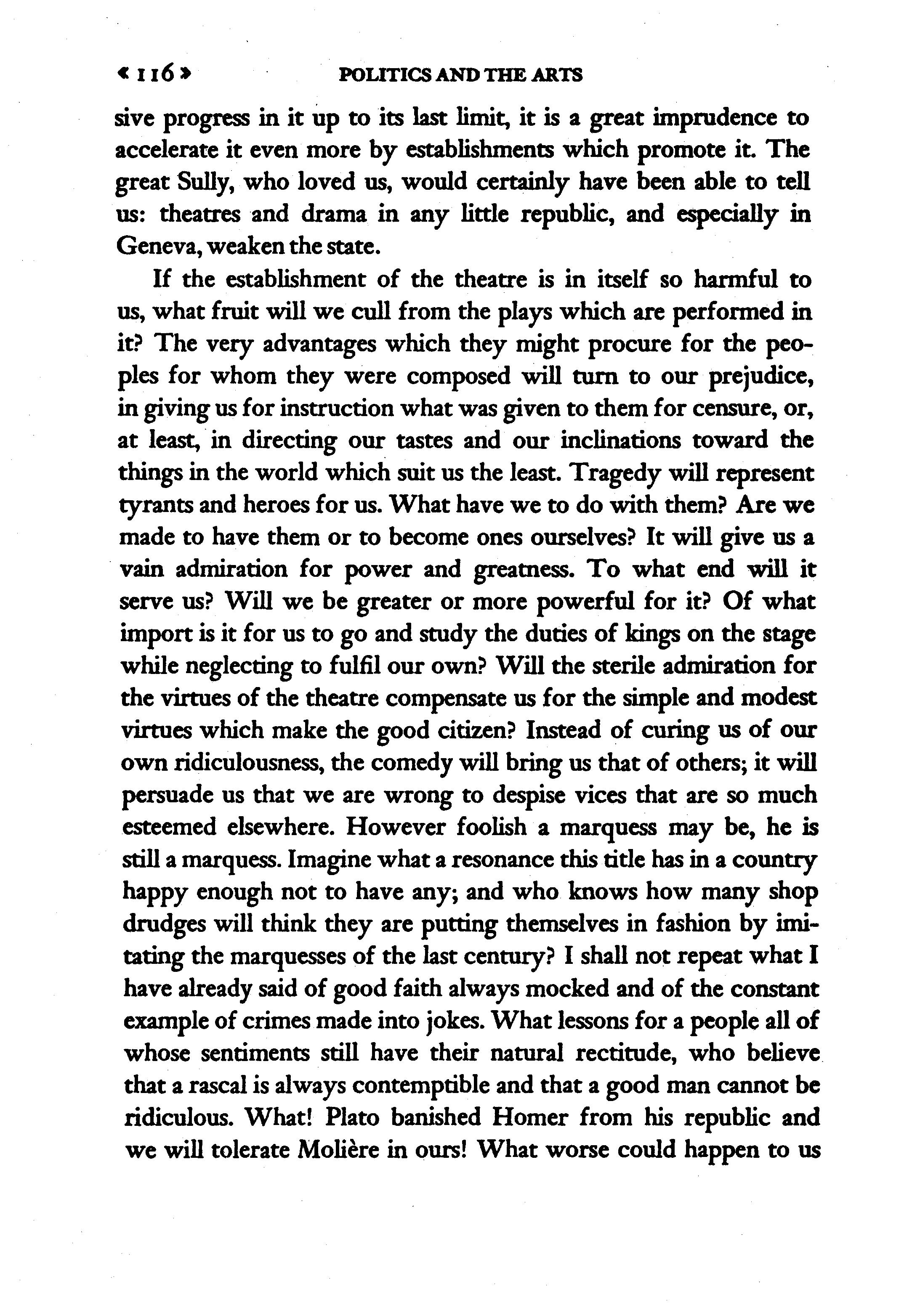
than to resemble the people he depicts, even those whom he makes uslike.
I have said enough, I think, about them; and I think very little betterofRacine's ofthose heroes all gotten up, so mawkish, so tender, who, with an.air of courage and virtue, provide us only with the models for the young men of whom I have spoken, given overto gallantry, softness, love, to everythingwhich can effeminate man and mitigate his·taste for his real duties. The whole French theatre breathes only tenderness; it is.the great virtue to which all the others are sacrificed, or, atleast, the one which is made to the spectators. I do not say that this is wrong insofar as the poet's object is concerned; I know that the man without passions is a chimaera, that the appeal of the theatre is founded only on the passions, that the heart is not attracted by those which are foreign to it nor by those which we do not.like to see in others although we may be subject to them ourselves. The love of humanity and of one's country are the sentiments the depiction of which most touches those who are imbued with them, but when these two passions are extinguished, there remains only love, properly so called, to take their place, because its charm is more natural and is more difficult to erase from the heart than that of all the others. However, it is not equally suitable to all men; it is rather as a supplement to good sentiments than as a good sentiment itself that it can be admitted; not that it is not laudable in itself, like every well-regulated passion, but because its excesses are dangerous and inevitable.
The most vicious of men is he who isolates himself the most, who most concentrates his heart in himself; the best is he who shares his affections equally with all his kind. It is much better to love a mistress than to love oneself alone in all the world. But whoever tenderly loves his parents, his friends, his country and humankind, degrades himself by a dissolute attachment which soon does damage to all the others and is without fail preferred to them.
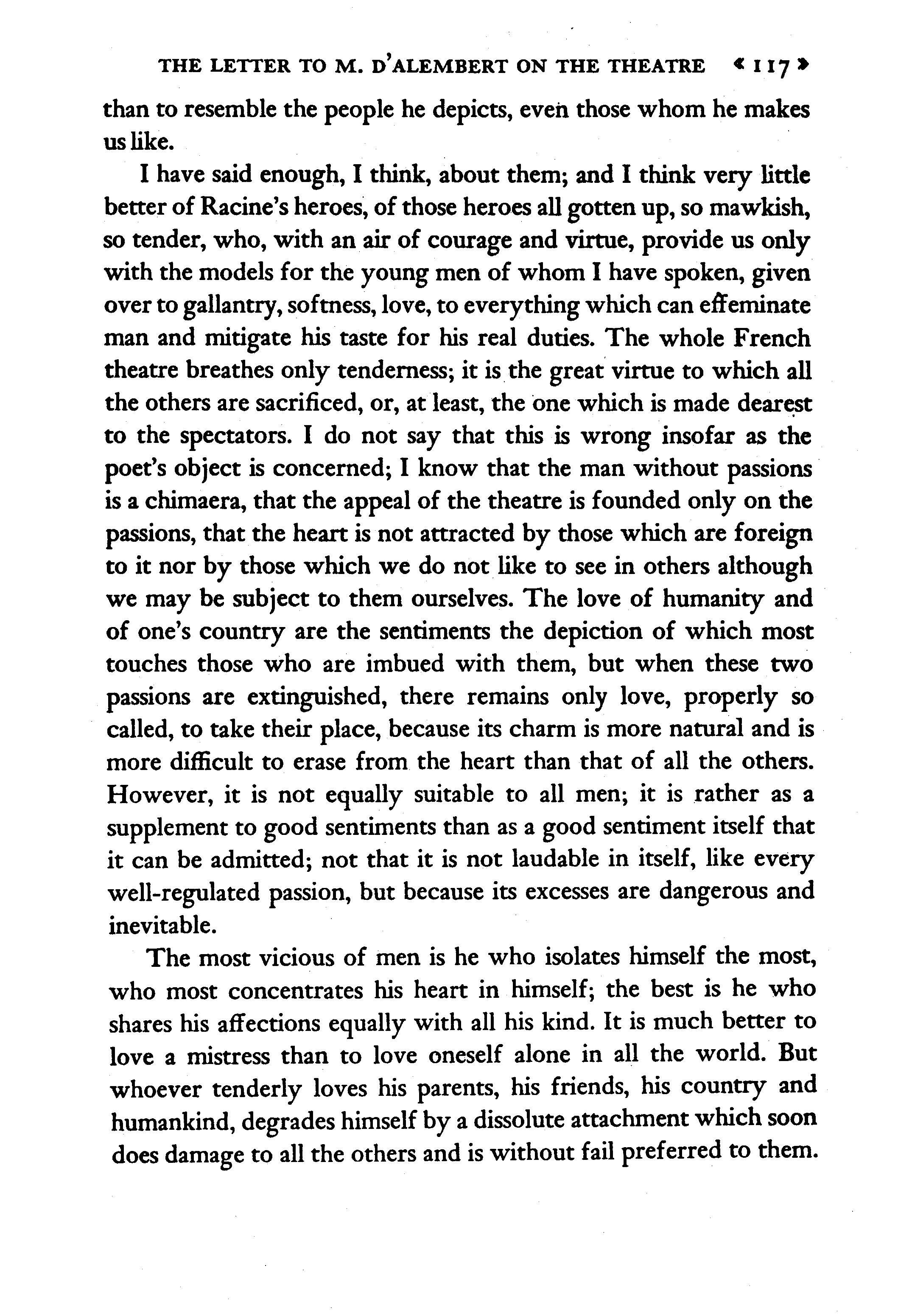
On this principle, I say that there are countries where the morals [manners] are so bad that they would be only too happy to be able to raise themselves back up to the level of love; and there are others where it would be unfortunate to descend to it, and I dare to think mine is in the latter case. I will add that to-show us objects which deeply involve the passions is more dangerous than to anyone else because we have naturally only too much of a penchant to like them. Under a phlegmatic and cold manner the Genevans hide an ardent and sensitive soul easier to move than to' control. In this abode of reason, beauty is not foreign nor without empire; the leaven of melancholy often causes love to ferment there; the men are only too capable of feeling violent passions, the women of inspiring them; and the sad effects that they have sometimes produced show how great is the danger of exciting them by touching and tender dramas. If the heroes of some plays subject love to duty, in admiring their force, the heart lends itself to their weakness; less is learned in giving oneselfto their courage than in putting oneself in the position of having need for it. It is more exercise for virtue; but he who dares to expose his virtue to these combats deserves to succwnb in them. Love, love itself, takes on the mask of virtue in order to surpriseit; love clothes itself with the enthusiasm of virtue; it usurps its force; it affects its language, and, when the error is perceived, itis far too late to recover! How many men of talent, seduced by these appearances, from the tender and generous lovers that they were at first, have become by degrees vile corruptors without morals [manners], without respect for conjugal faith, without consideration for the rights of confidence and of friendship! Happy is he who is able to realize that he is on the brink of a precipice and to prevent himself from falling in! Is it in the midst of a rapid descent that one can hope to stop oneself? Is it in being moved to tenderness every day that the surmounting of tenderness can be learned? A weak penchant can easily be triumphed over; but he who knew true love and was able to vanquish
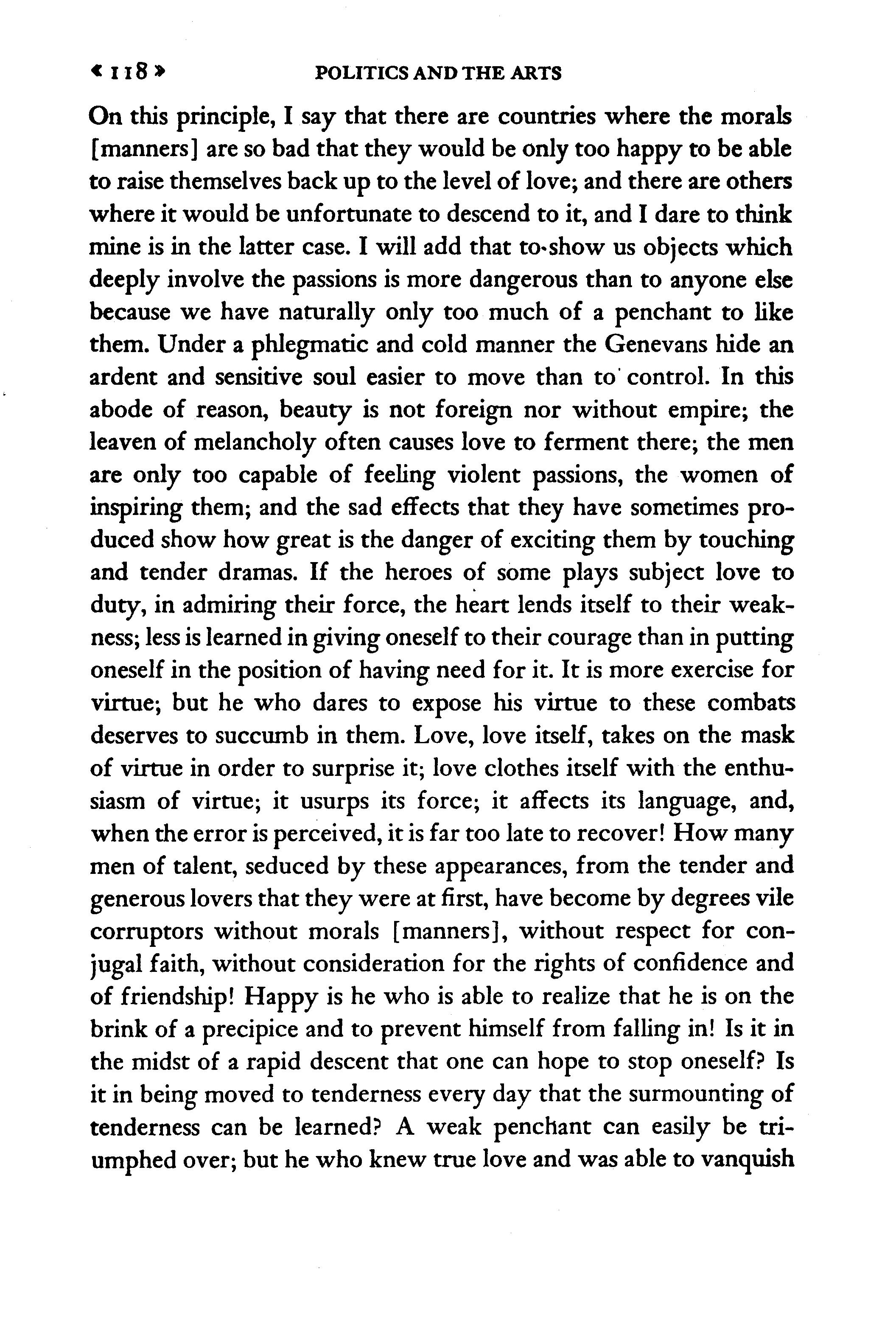
it, oh! let us pardon this mortal, if he exists, for daring to pretend tovirtue!
Thus, in whatever way things are envisaged, the same truth strikes us·always. All that in the theatrical plays might be useful for ·those for whom they were written, will become detrimental for us, including even the taste which we will think we have acquired from them, which will only be a false taste without tact and delicacy, unseasonably substituted for the solidity of reason. Tasteisconnected with many things; the refined forms ofimitation to be seen in the theatre, the comparisons to which they give occasion, reflections on the art of pleasing the spectators can cause it to germinate but do notsuffice for its development. There is need of big cities, fine arts and luxury, an intimate commerce among the citizens, a strict dependence of them on one another, gallantry and even debauch, vices which one is forced to embellish; there is need, I say, of all this to cause a search for agreeable fonTIS in everything and success in finding them. Some of these things will always be lacking to us, and we ought to tremble at acquiring the others.
We will have actors, but of what sort? Will a good troop come right off to establish itself in a city of twenty-four thousand souls? We will, then, at first have bad actors, and we will at first be bad judges. Will they form us or will we form them? We will have good plays; but, taking them for such on somebody else's word, we will be exempted from having to examine them and will gain no more in seeing them played than in reading them. For all that, we will no less play the connoisseurs and arbiters of the theatre; we will no less want to decide for our money and will be only the more ridiculous for it. It is not ridiculous to lack taste when one despises it; but it is ridiculous to pride oneself on it and only have bad taste. And, after all, what is this taste that is so much vaunted? The art of being knowing about petty things. In truth, when taste isgood enough to preserve only liberty, all the rest is quite
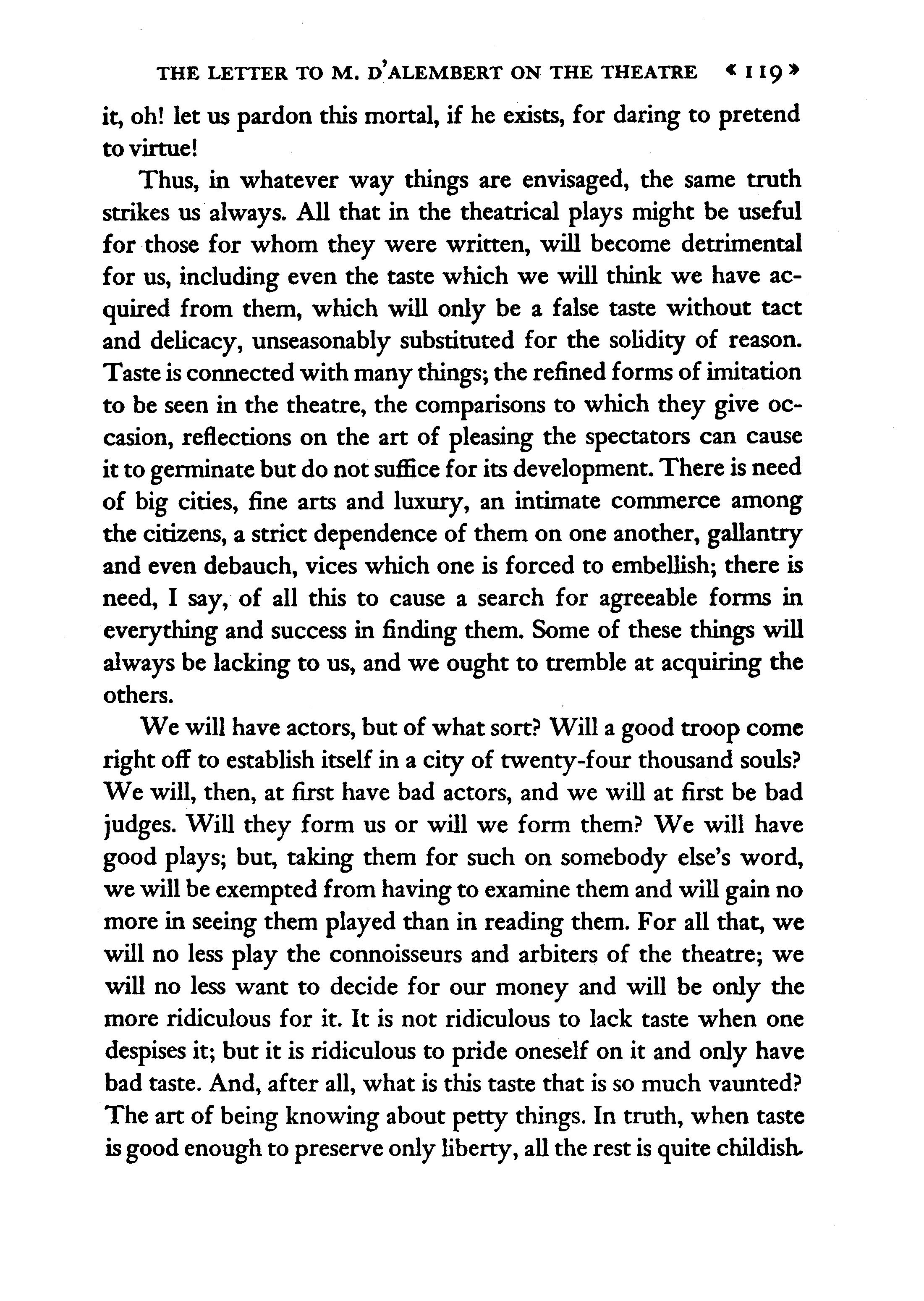
I see only one remedy for so many disadvantages; it is, in order to make the dramas of our theatre suitable to us, to compose them ourselves; we should have authors before we have actors. For it is not good that we be shown all sorts of imitations, but only those of things that are decent and befitting free men.· It is certain that plays drawn, like those of the Greeks, from the past misfortunes of the country or·the presentfailings of the people could offer useful lessons to the spectators. Who then will be the heroes of our tragedies? BertheIiers? Levrerys? Ah, worthy citizens, you were, doubtless, heroes but your obscurity abases you, your common names dishonor your great souls,·· and we are no longer great enough ourselves to be able to admire you. Who will be our tyrants? Gentlemen of the Spoont, bishops of Geneva, the counts of Savoy, the ancestors of a house with which we have just treated and to which we owe respect? Fifty years ago I could not have
• Si quis ergo in nostrmn urbem venerit, qui animi sapientia in omnes possit sese vertere formas, et omnia imittrri, volueritque poemata sua ostenttrre, venerabimur quidem ipsum, ut sacrum, admirabilem, et jucundum: dicemus autem non esse eiusmodi hominem in republica nostra, neque fas esse ut insit; mittemusque in alimn urbem, unguento caput eius perungentes, lanaque coronantes. Nos autem austeriori minusque jucundo utemur Poeta, fabularumque fictore, utilitatis gratia, qui decori nobis rationem exprimat, et quae dici debent dicat in his formulis quas a principio pro legibus tulimus, quando cives erudire agressi sumus. (Plat. de. Republ. lib. III.) 82 •• Philibert Berthelier was the Cato of our country, with the difference that public liberty ended with the latter and began with the former. He was holding a tame weasel when he was arrested; he handed over his sword with that pride which sits so well with unfortunate virtue; then he continued to play with his weasel without deigning to answer to the insults of his guards. He died as amartyr oflibertyoughtto die.
Jean.Levrery was Berthelier's Favonius, not in childishly imitating his speeches and his ways, but in dying voluntarily as he did, knowing that the example of his death would be more useful to his country than his life. Before going to the scaffold he wrote this epitaph, which had been made for his predecessor, on the wall of his prison: Quid mihi mors nocuit? Virtus post fata virescit; Nec cruce, nec soevi gladio perit illa Tyranni.83 t This was a brotherhood of gentlemen from Savoy who had made a vow of brigandage against the city of Geneva and who, as the mark of their association, wore aspoon hung around their necks.
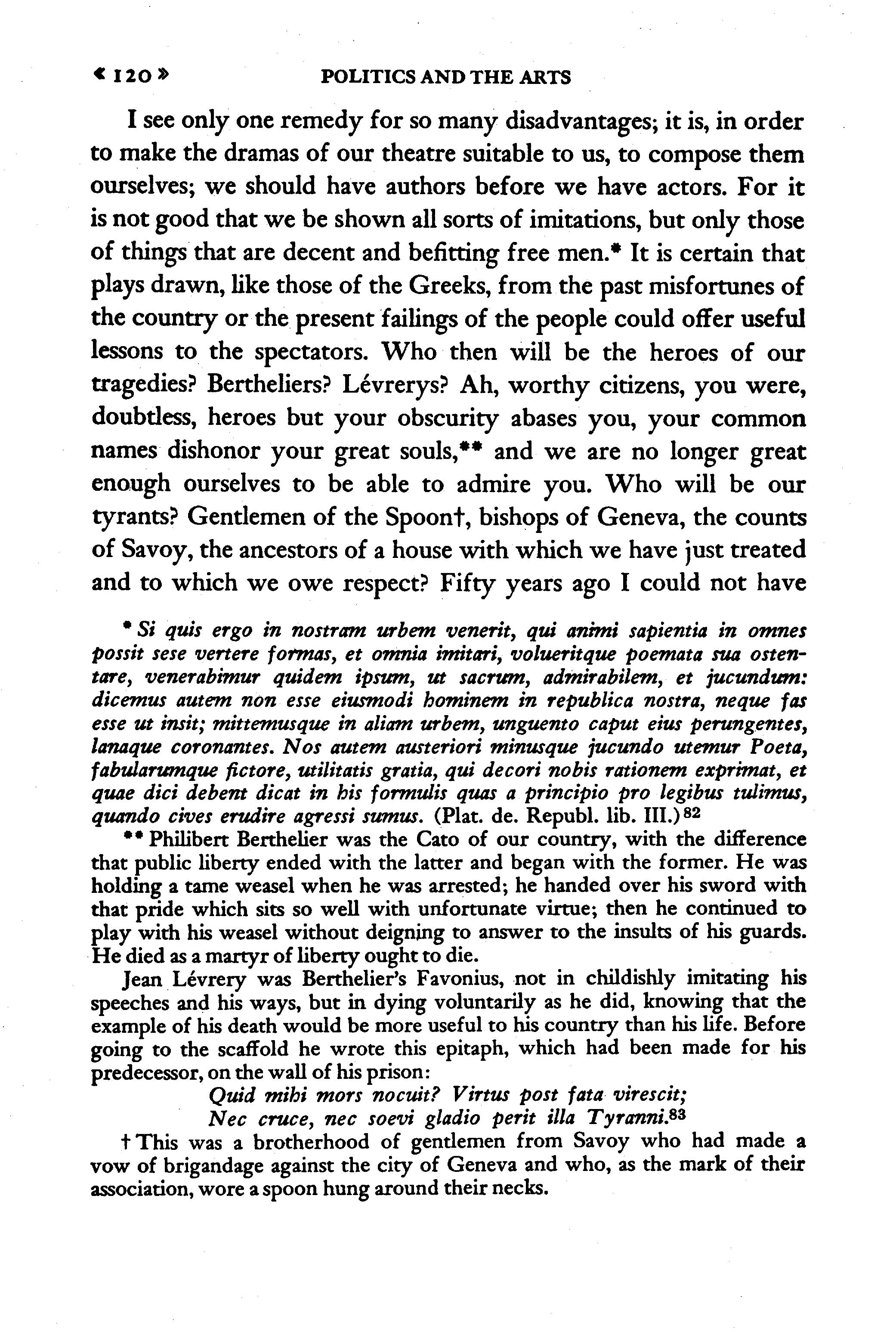
answered that the Devil· and the Antichrist would not also have had their roles. With the Greeks, a people otherwise quite jocular, everything was.grave and serious as soon as their country was involved; but, in this witty age when nothing escapes ridicule besides.power, one· dares to speak of heroism only in big states althoughitisonlyto befound insmallones.
As to comedy, it ought not to be dreamed of for us. It would cause the most frightful disorders,among us; it would serve.as an instrument for factions, parties, and private vengeances. Our city is so small that the most general depictions of morals [manners] would soon degenerate into satires and representations of persons. TheexampleofancientAthens, acityincomparablymore populous than Geneva, presents us with astriking lesson; it was in the theatre that the exile of many great men and the death of Socrates was prepared for; it was by the violence of the theatre that Athens was lost, and its disasters justified only too"well the chagrin to which Solon gave witness at the first performances of Thespis. What is quite certain for us is that it will be an ill omen for the republic when we see the citizens, disguised as wits, setting themselves to composing French verses and theatrical plays, talents which are not ours and which we will never possess. But let M.. de Voltaire deign to compose tragedies for us on the model of la Mort de Cesar and the first act of Brutus; and, if we must absolutely have
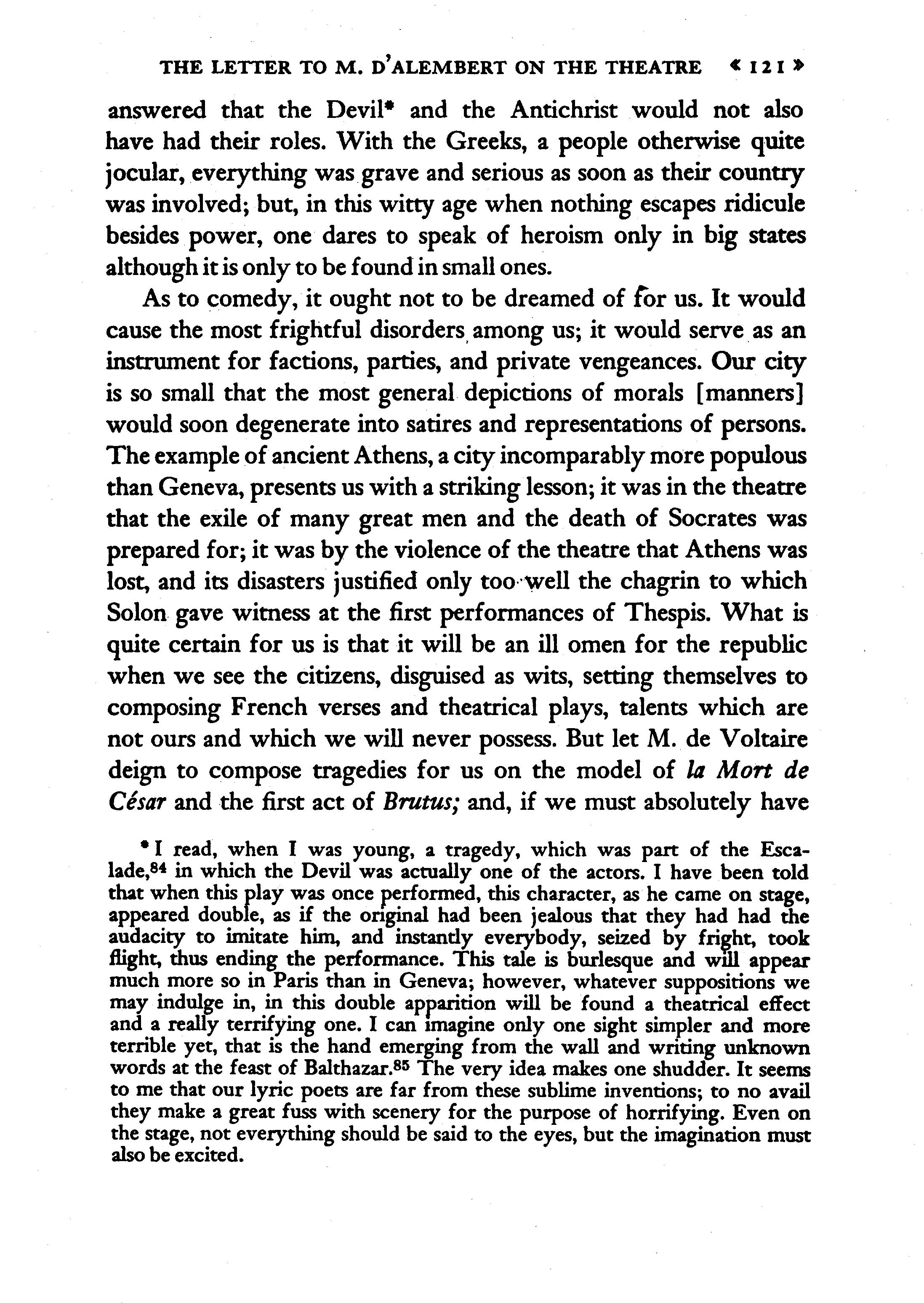
•I read, when I was young, a tragedy, which was part of the Escalade,84 in which the Devil was actually one of the actors. I have been told that when this play wasonce performed, this character, as he came on stage, appeared double, as if the onginal had been jealous that they hadhad the audacity to imitate him, and instantly everybody, seized by frit{ht, took flight, thus ending the performance. This tale is burlesque and will appear much more so in Paris than in Geneva; however, whatever suppositions we may indulge in, in this double apparition will be found a theatrical effect and a really terrifying one. I can Imagine only one sight simpler and more terrible yet, that is the hand emerging from the wall and writing unknown words at the feast of Balthazar.85 The very idea makes one shudder. It seems to me that our lyric poets are far from these sublime inventions; to no avail they make a great fuss with scenery for the purpose of horrifying. Even on the stage, not everYthing should be said to the eyes, but the imagination must also be excited.
a theatre, let him engage himself always to fill it with his genius andto live aslongas hisplays.
I would be of the opinion that all of these reflections should be weighed maturely before taking into consideration the taste for adornment and dissipation which the example of the actors must produce in our youth; but finally this example will have its effect too, and if, in general, the laws are everywhere insufficient to repress the vices which arise out of the nature of things, as I believe I have shown, how much more will they be so in our city where the first sign of their weakness will be the establishment of the actors?' For it will not be, strictly speaking, they who will have introduced this.taste for dissipation; on the contrary, this taste will have preceded them, will have introduced them, and they will only fortify a penchant already all formed which, having caused them to be admitted, will so much the more cause them to be maintained with theirfaults.
I base myself throughout on the supposition that they will subsist comfortably in such a little city. And I say that, if we honor them as you claim we will, in a country where all are pretty nearly equal, they will be the equals of everybody, and will have in addition the public favor which naturally belongs to them. They will not, as elsewhere, be kept respectful by the great whose benevolence they cultivate and the loss of whose grace they fear. The magistrates will command their respect; granted. But these magistrates will have been private men; they might have been friendly with the actors; they will have children who will still be friendly with them, and wives who love pleasure. All these connections will be means of indulgence and protection which it will be impossible always to resist. Soon the actors, sure of impunity, will procure it also for their imitators; it is with them that disorder will have begun, but one cannot see where it can be ended. The women, the young, the rich, the idle, all will be for them, everything will help them evade the laws which get in their way, everything will promote their licence; each, in seeking to satisfy them, will think
